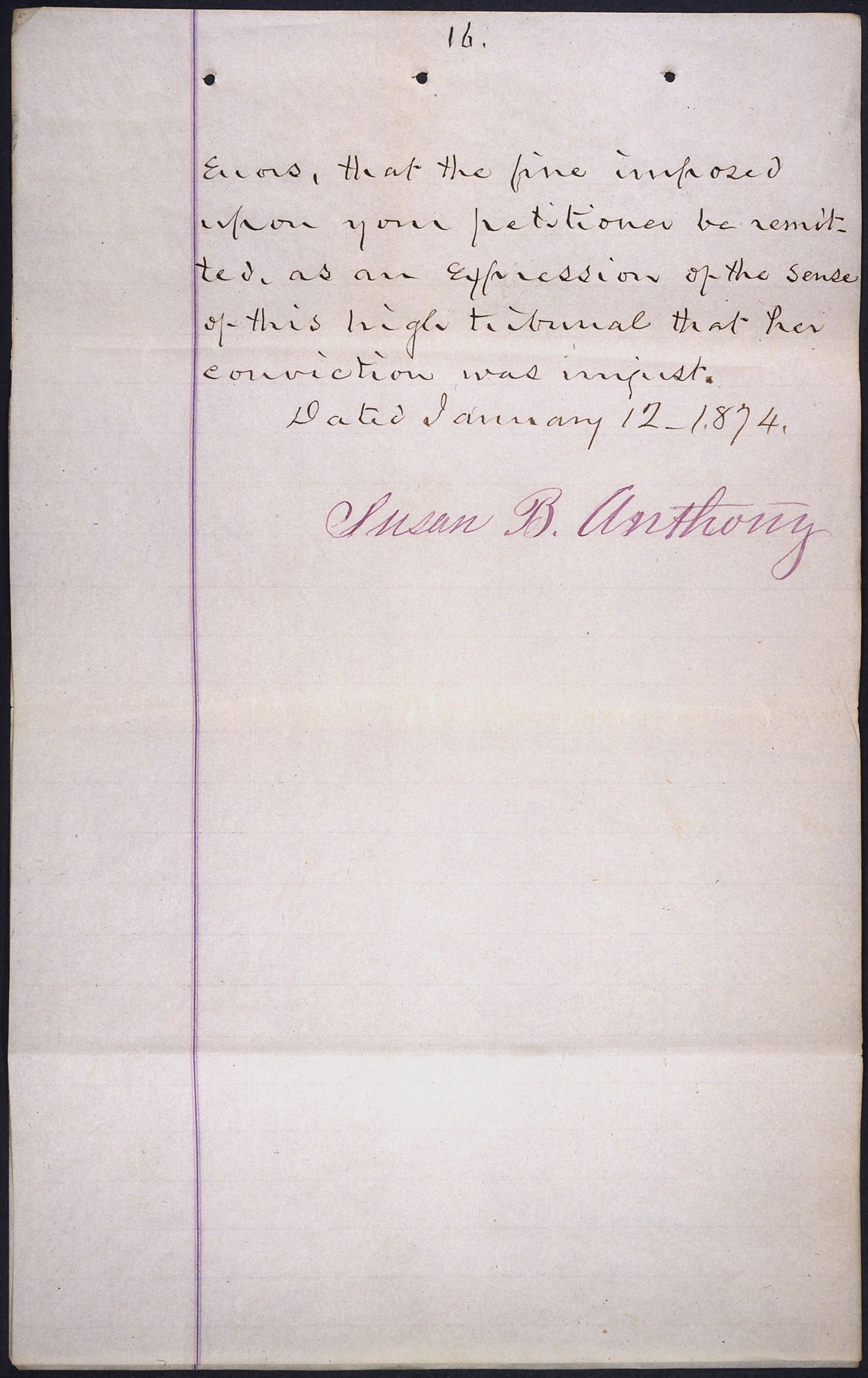Does the 14th Amendment Give Women the Right to Vote?
Making Connections
All documents and text associated with this activity are printed below, followed by a worksheet for student responses.Introduction
In this activity you will analyze documents related to the women's suffrage movement and the New Departure strategy.In 1868, the 14th Amendment was ratified, granting citizenship to persons born or naturalized in the United States, which included formerly enslaved people. Next, the 15th Amendment granted African American men the right to vote – a key component of citizenship in the United States.
But one half of the adult population – women – were still not guaranteed this right. Women's suffrage supporters had been organizing and pressuring Congress since the mid 1800s. After the passage of the 14th Amendment, Missouri suffragists Francis and Virginia Minor put forward a new argument, that the Constitution already guaranteed the right to vote for women, they just had to exercise it. The National Woman Suffrage Association embraced this idea and championed it as new national suffrage strategy known as the "New Departure" that encouraged women to test this argument by voting.
Follow the steps below. Read the questions and analyze the documents that follow; click "View Document Details" to see each one more closely and view its transcript. Answer the questions in the blank boxes that follow each document group. Then click "When You're Done," where you'll need to use what you learned from the documents to reflect on the effectiveness of the New Departure strategy.
Name:
Class:
Class:
Worksheet
Does the 14th Amendment Give Women the Right to Vote?
Making Connections
Examine the documents and text included in this activity. Fill in any blanks in the sequence with your thoughts and write your conclusion response in the space provided.Examine the first page of the following document and then answer this question in the response box: why was Susan B. Anthony arrested?
U.S. vs Susan B. Anthony, Order to U.S. Marshal to deliver Susan B. Anthony to county jail
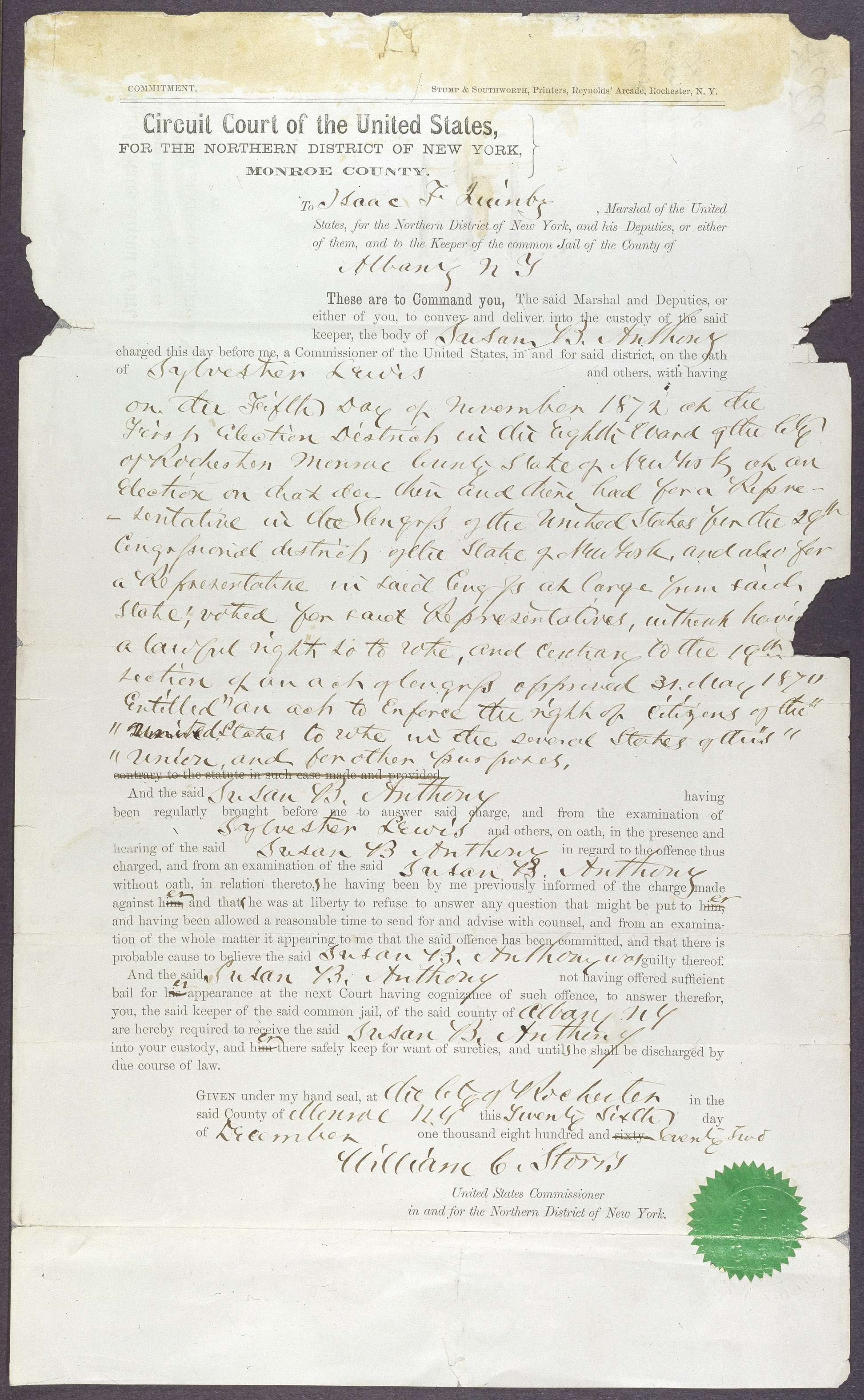
Enter your response
Susan B. Anthony wasn’t the first woman to attempt to vote in an election. Other examples include 172 women voting in Vineland, New Jersey in 1868 as well as former abolitionist and newspaper editor Mary Ann Shadd Cary’s attempt to register in Washington, DC in April 1871. On November 5, 1872, Anthony was joined by 14 other women. Since her case made it to trial, the National Archives has federal records that share her story and provide insight into her rationale for voting. The following document is a transcript of Susan B. Anthony’s trial. Use pages 7–8 from this document to answer the following questions in the response box. For your reference, Mr. Beverly Jones is being cross-examined by the defense attorney in this excerpt. Jones served as an election inspector in Rochester, New York.
What explanation did Beverly Jones use for initially refusing Anthony’s request to register to vote?
According to Beverly Jones, what did Anthony use to justify her assertion that she should be permitted to register to vote? Did she persuade the election officials?
What explanation did Beverly Jones use for initially refusing Anthony’s request to register to vote?
According to Beverly Jones, what did Anthony use to justify her assertion that she should be permitted to register to vote? Did she persuade the election officials?
U.S. vs. Susan B. Anthony, Exhibit B, a transcript of the hearing including examination of witnesses by the defense and prosecution atorneys, and Susan B. Anthony`s testimony in her own defense

Enter your response
Next, read an excerpt of Susan B. Anthony’s testimony from her trial (pages 14-15). According to her testimony, why did she vote in the election? (Share your answer in the next response box.)
U.S. vs. Susan B. Anthony, Exhibit B, a transcript of the hearing including examination of witnesses by the defense and prosecution atorneys, and Susan B. Anthony`s testimony in her own defense
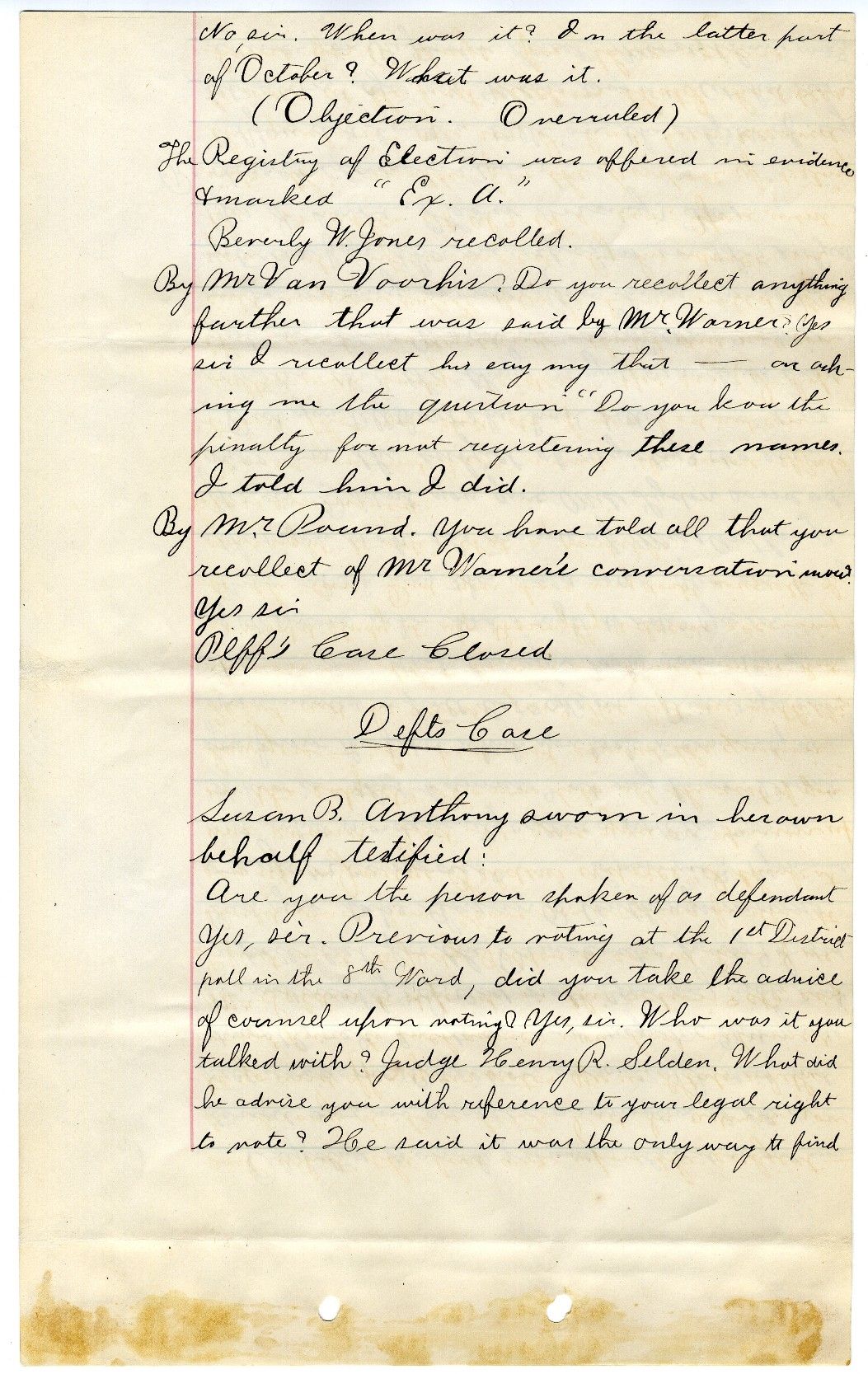
Enter your response
Read Section 1 of the Fourteenth Amendment. Do you agree that the Fourteenth Amendment guarantees women the right to vote? Explain why or why not in the response box.
Joint Resolution Proposing the Fourteenth Amendment to the United States Constitution
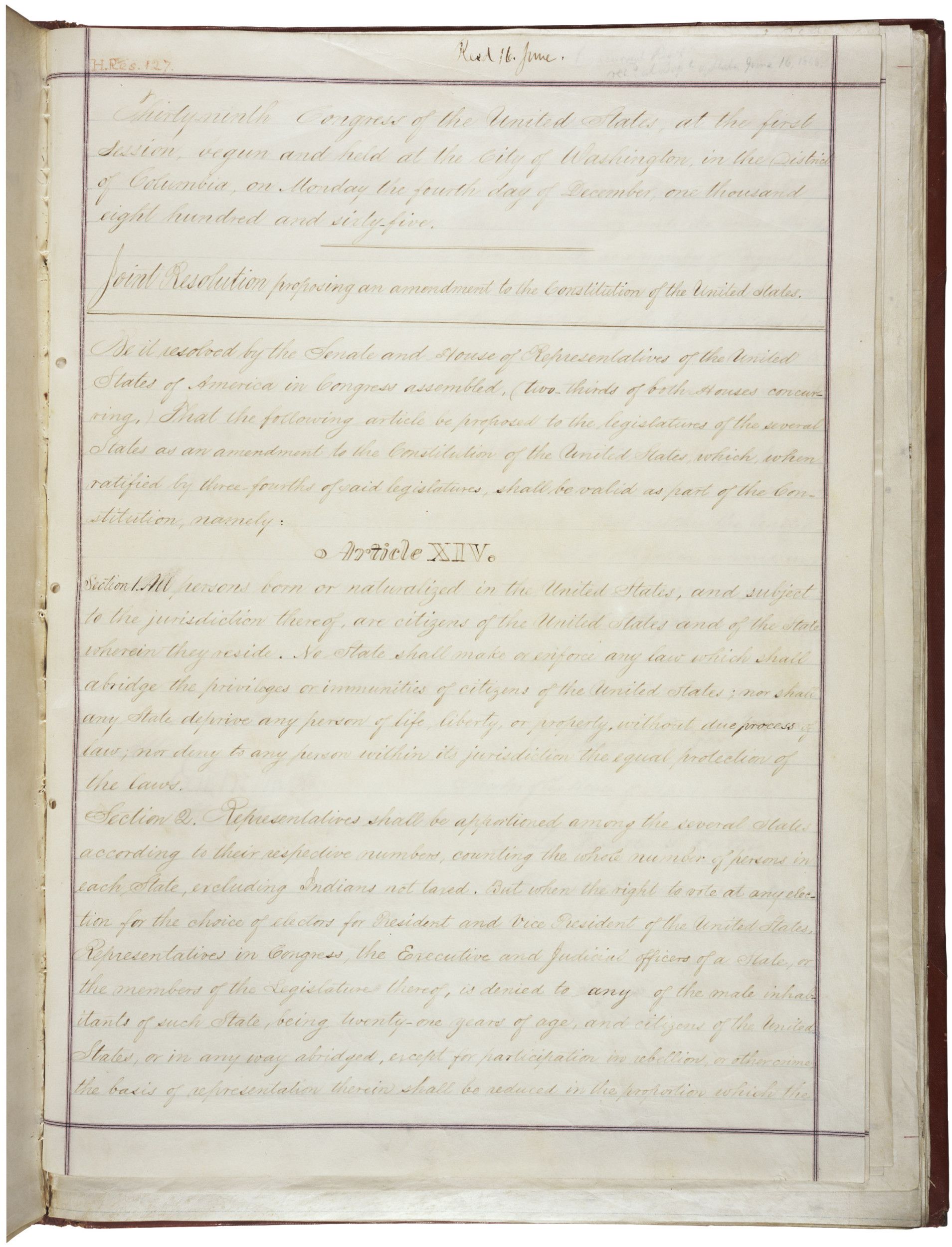
Enter your response
Using Section 1 of the Fourteenth Amendment, women suffragists liked Anthony claimed citizenship. They argued they were constitutionally entitled to the first right of citizenship, the right to vote. However, the judge in Anthony’s case did not view the right to vote as being guaranteed to all U.S. citizens. Instead, under the Constitution, each state is responsible for determining its qualifications for voting. The judge instructed the jury to issue a guilty verdict and sentenced Anthony to pay a $100 fine and the costs of the prosecution.
Anthony refused to pay the fine and sent the following petition to Congress. Read pages 10–16 of this petition. Why did Anthony petition Congress? Share your answer in the following response box.
Anthony refused to pay the fine and sent the following petition to Congress. Read pages 10–16 of this petition. Why did Anthony petition Congress? Share your answer in the following response box.
Susan B. Anthony Petition for Remission of Fine Imposed for Voting
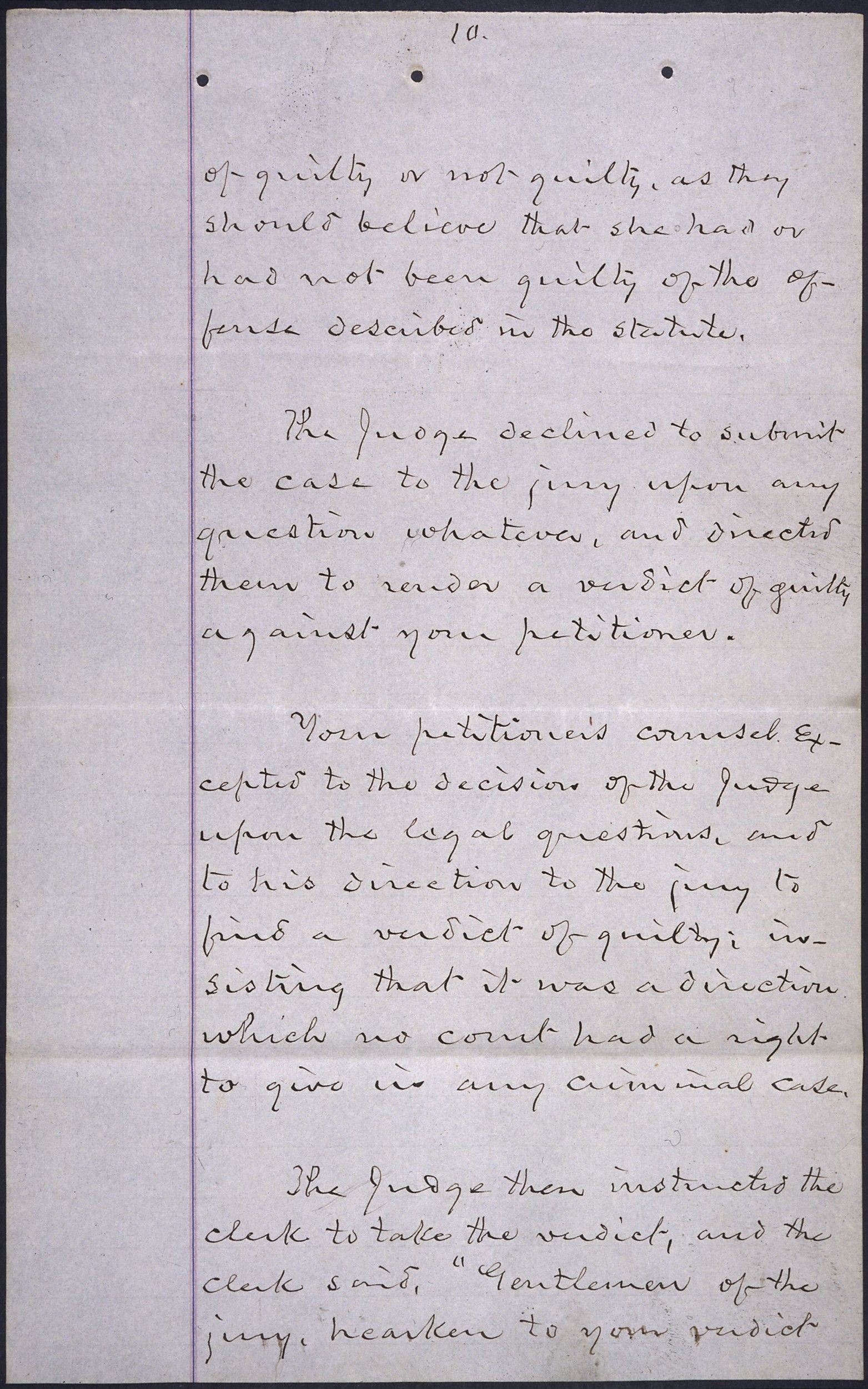
Enter your response
1
Activity Element
U.S. vs Susan B. Anthony, Order to U.S. Marshal to deliver Susan B. Anthony to county jail
Page 1

2
Activity Element
U.S. vs. Susan B. Anthony, Exhibit B, a transcript of the hearing including examination of witnesses by the defense and prosecution atorneys, and Susan B. Anthony`s testimony in her own defense
Page 7

3
Activity Element
U.S. vs. Susan B. Anthony, Exhibit B, a transcript of the hearing including examination of witnesses by the defense and prosecution atorneys, and Susan B. Anthony`s testimony in her own defense
Page 14

4
Activity Element
Joint Resolution Proposing the Fourteenth Amendment to the United States Constitution
Page 1

5
Activity Element
Susan B. Anthony Petition for Remission of Fine Imposed for Voting
Page 10

Conclusion
Does the 14th Amendment Give Women the Right to Vote?
Making Connections
Congress did not remit Anthony's fine. However, she never paid it. She was not sentenced to any jail time as a result of her trial or refusal to pay her fine.In October 1872, Virginia Minor attempted to register to vote in St. Louis, Missouri. She was not allowed to register. Minor went to court (with the help of her husband, since married women could not sue at this time in Missouri) and her case made it before the Supreme Court. In Minor v. Happersett the Supreme Court came to the unanimous opinion “that the Constitution of the United States does not confer the right of suffrage upon anyone, and that the constitutions and laws of the several States which commit the important trust to men alone are not necessarily void.” (Minor v. Happersett, 88 U.S. 162 (1875))
In the answer space below, answer the following:
- Reflect on the significance of the New Departure strategy. What did the ruling in Minor v. Happersett mean for this approach?
- What options did women have left to win the right to vote?
Your Response
Document
U.S. vs Susan B. Anthony, Order to U.S. Marshal to deliver Susan B. Anthony to county jail
12/26/1872
In the 1872 election, 15 women in Rochester, N.Y., including Susan B. Anthony, successfully registered to vote and cast their ballots. As planned, they were arrested and charged with illegal voting, for “knowingly, wrongfully and unlawfully vot[ing] for a representative to the Congress of the United States.”
This December 26, 1872, order directed U.S. Marshals to take Anthony to jail. Only Anthony’s case went to trial. In U.S. v. Susan B. Anthony, she was found guilty and fined $100, which she never paid.
This December 26, 1872, order directed U.S. Marshals to take Anthony to jail. Only Anthony’s case went to trial. In U.S. v. Susan B. Anthony, she was found guilty and fined $100, which she never paid.
Transcript
[printed text]Commitment Stump & Southworth, Printers, Reynolds’ Arcade, Rochester, N.Y.
Circuit Court of the United States } [handwritten] “Exhibit A”
FOR THE NORTHERN DISTRICT OF NEW YORK, }
MONROE COUNTY. }
To [handwritten] Isaac F. Quimby],] [continue printed text]
Marshal of the United States, for the Northern District of New York, and his Deputies, or either Of them, and to the Keeper of the common Jail of the County of [handwritten] Albany, N.Y. [continue printed text]
These are to Command you, The said Marshal and Deputies, or either of you, to convey and deliver into the custody of the said keeper, the body of [handwritten] Susan B. Anthony [continue printed text]
charged this day before me, a Commissioner of the United States, in and for said district on the oath of [handwritten] Sylvester Lewis [continue printed text] and others, with having
[begin handwritten] on the Fifth day of November 1872 on the First Election District in the Eighth Ward of the City of Rochester Monroe County State of New York, [Illegible] an election on that day then and there had for a Representative in the Congress of the United States for the 29th Congressional District of that State of New York, and also for a Representative in said Congress at Large from said; voted for said Representatives, without having a lawful right so to vote, and contrary to the [10th?] “Section of an act of Congress approved 31 May 1870, Entitled “an act to”
“Enforce the right of citizens of the United States to vote in”
“the several States of this union and for other purposes” [end handwritten]
[begin printed text] [crossed out:] contrary to the statues in such once made and provided.
And the said [handwritten] Susan B. Anthony [continue printed text] having been regularly brought before me to answer said charge, and from the examination [handwritten] Sylvester Lewis [continue printed text] and other, on oath, in the presence and hearing of the said [handwritten] Susan B. Anthony [continue printed text] in regard to the offence thus charged and from an examination of said [handwritten] Susan B. Anthony [continue printed text] without oath, in relation thereto, he having been by me previously informed of the charge made against him her and that she [s handwritten] was at liberty to refuse to answer any question that might be put to himer [er handwritten] and having been allowed a reasonable time to send for and advise with counsel, and from an examination of the whole matter it appearing to me that the said offence has been committed, and that there is probable cause to believe the said [handwritten] Susan B. Anthony [continue printed text] was guilty thereof.
And the said [handwritten] Susan B. Anthony [continue printed text] not having offered sufficient bail for hiser [er handwritten] appearance at the next Court having cognizance of such offence, to answer therefor, you the said keeper of the said common jail, [handwritten] Albany N.Y. [continue printed text] are hereby required to receive the said [handwritten] Susan B, Anthony [continue printed text]in to your custody, and himer [er hand written] there safely to keep for want of sureties, and until she shall be discharged by due course of law.
Given under my hand seal, at [handwritten] the City of Rochester [continue printed text] in the said County of [handwritten] Monroe, N.Y. [continue printed text] this [handwritten] Twenty Sixth [continue printed text] day of [handwritten] December [continue printed text] one thousand eight hundred and [crossed out] sixty [handwritten] seventy Two.
[handwritten] William C. Storrs
[continue printed text]United States Commissioner
in and for the Northern District of New York
[printed text] United States Circuit Court
Northern District of New York
THE UNITED STATES OF AMERICA
vs
[handwritten] Susan B. Anthony
[continue printed]
COMMITMENT
[handwritten] William C. Storrs
[illegible printed name struck out]
[printed text] United States Commissioner
[handwritten] Richard Crowley
[illegible printed name struck out]
[printed text] United States Attorney
[handwritten] Isaac F. Quimby
[illegible printed name struck out]
[printed text] United States Marshal
[handwritten] Bail $500 with a surety
Clerk will [illegible] writ for allowance returnable
Jan'y 10. 1873 10 A.M. -
Hall
Filed Jan 2 1873
[image of American eagle]
-----------------------------------------------------
[printed] The President of the United States of America
To [handwritten over printed underlining] Isaac F. Quimby
United States Marshall
[continue printed text] Greetings:
You are hereby commanded that you have the body of [handwritten over printed underlining] Susan B. Anthony [continue printed text] by you imprisoned and detained, as it is said, together with the time and cause of such imprisonment and detention, by whatsoever name the said [handwritten over printed underlining] Susan B. Anthony [continue printed text] shall be called or charged, before the Honorable Nathan K. Hall, Judge of the District Court of the United States for the Northern District of New York, at the United States Court Room, on the corner of Washington and Seneca Streets, in the city of Buffalo, on the [handwritten over printed underlining] Tenth [continue printed text] day of [handwritten over printed underlining] January [continue printed text] 18[handwritten] 73 [continue printed text], at [handwritten over printed underlining] Ten [continue printed text] o’clock in the [handwritten over printed underlining] fore- [continue printed text] noon, to do and receive what shall then and there be considered concerning the said [handwritten over printed underlining] Susan B. Anthony [continue printed text] and have you then and there this writ.
[handwritten x in left margin] [continue printed text]
Witness the Honorable Nathan K. Hall, Judge of the District Court of the United States, for the Northern District of New York, at the city of [handwritten over printed underlining] Buffalo [continue printed text] the [handwritten over printed underlining] 2 [superscript] d [continue printed text] day of [handwritten over printed underlining] January [continue printed text] 18 [handwritten over printed underlining] 73.
John Van Voorhis [continue printed text] Attorney.
[handwritten over printed underlining] [M.P. Fillmore?] [continue printed text] Clerk.
[handwritten sidewards at top of page] I hereby allow the within writ of Habeas corpus.
Jan. 2, 1873.
N.K. Hall
U.S. Dist. Judge
Recd January 3 1872 [end sidewards handwriting]
[handwritten normal orientation at bottom of page]
The hearing upon the within writ and the return hereto having been adjourned until this day, when such hearing was [provided?] in in furtherance of such [adjournment?], the United States being represented by the Hon Richard Crowley U.S. District Attorney, and the within named Susan B. Anthony being present in person, attended by the Hon. Henry R. Selden and John Van Voorhis Esq. her counsel, and the said hearing having been closed: It is now ordered and adjudged that the application of the said Susan B. Anthony for a discharge from custody be and the same hereby is denied, and that the proceedings under the within writ be and the same are hereby are dismissed.
Albany January 21, 1873 N.K. Hall
U.S. District Judge.
This primary source comes from the Records of District Courts of the United States.
National Archives Identifier: 278296
Full Citation: U.S. vs Susan B. Anthony, Order to U.S. Marshal to deliver Susan B. Anthony to county jail; 12/26/1872; Susan B. Anthony Criminal Case File; Criminal Cases Heard in the U.S. District Court for the Northern District of New York, 1870 - 1968; Records of District Courts of the United States, ; National Archives at New York, New York, NY. [Online Version, https://docsteach.org/documents/document/susan-b-anthony-jail-order, April 19, 2024]U.S. vs Susan B. Anthony, Order to U.S. Marshal to deliver Susan B. Anthony to county jail
Page 1
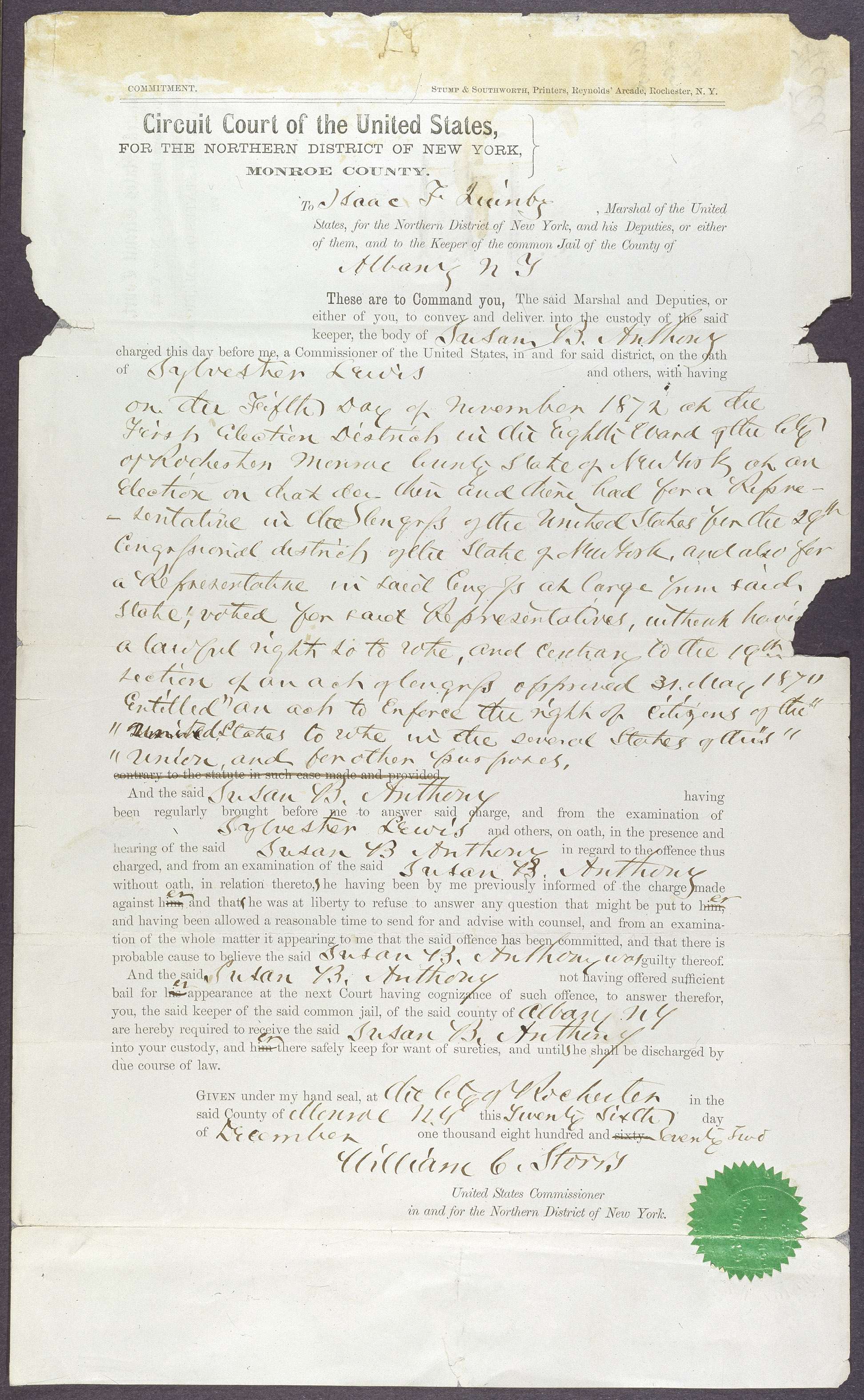
U.S. vs Susan B. Anthony, Order to U.S. Marshal to deliver Susan B. Anthony to county jail
Page 2
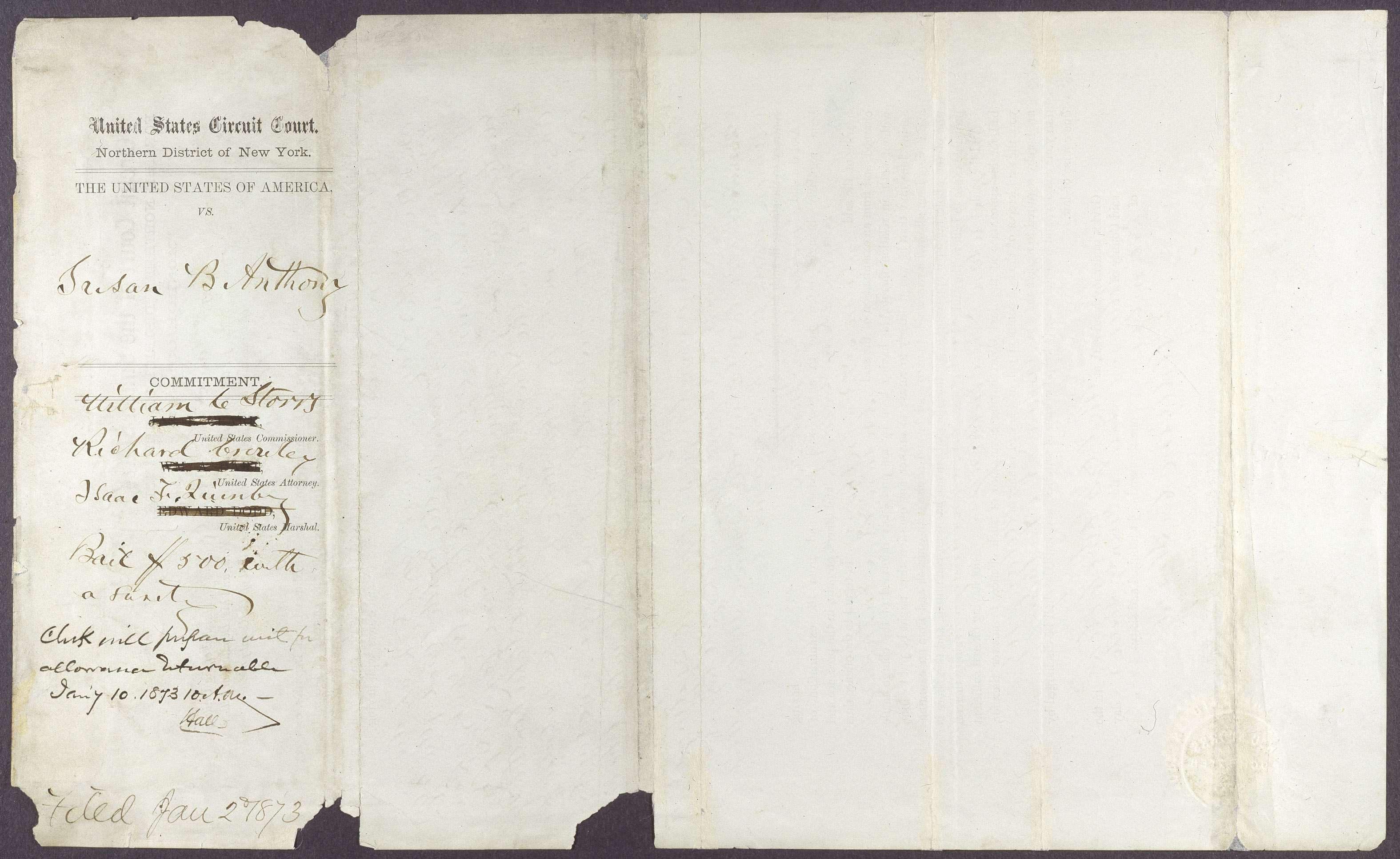
U.S. vs Susan B. Anthony, Order to U.S. Marshal to deliver Susan B. Anthony to county jail
Page 3
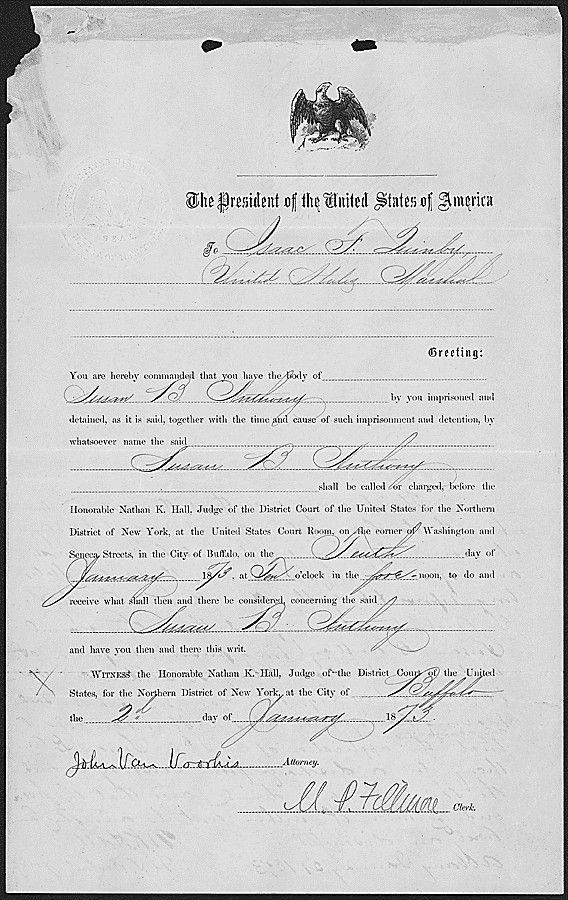
U.S. vs Susan B. Anthony, Order to U.S. Marshal to deliver Susan B. Anthony to county jail
Page 4
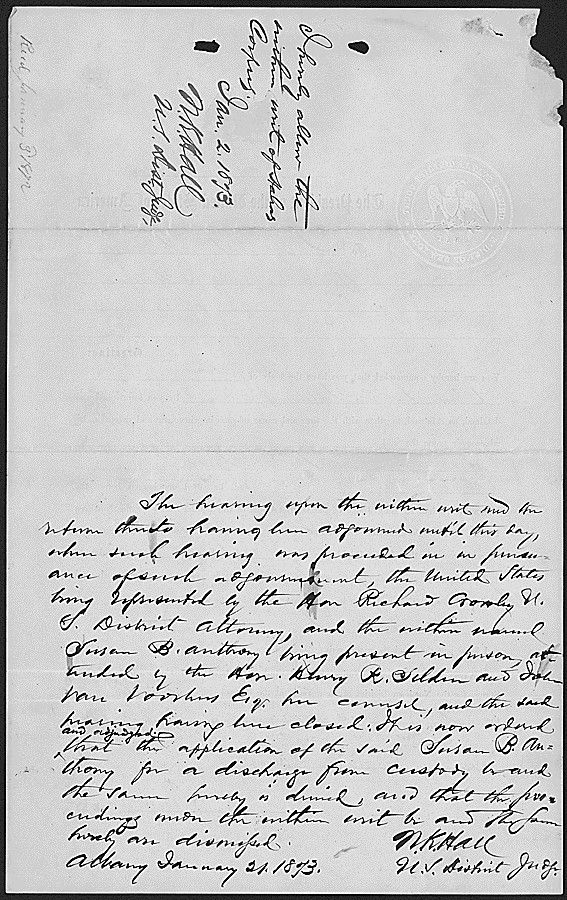
Document
U.S. vs. Susan B. Anthony, Exhibit B, a transcript of the hearing including examination of witnesses by the defense and prosecution atorneys, and Susan B. Anthony's testimony in her own defense
6/17/1873-6/18/1873
This document comes from the court case U.S. vs. Susan B. Anthony. It is Exhibit B, a transcript of the hearing including examination of witnesses by the defense and prosecution atorneys, and Susan B. Anthony's testimony in her own defense.
Anthony's was one of several federal court cases involving women arrested for illegally voting in the 1872 election in Rochester, NY, 48 years before the 19th amendment passed in 1920.
Anthony's was one of several federal court cases involving women arrested for illegally voting in the 1872 election in Rochester, NY, 48 years before the 19th amendment passed in 1920.
Transcript
Exhibit BEdwin P. March was sworn in behalf of the people and testified as follows:
2. Do you reside in the City of Rochester? Yes, sir How long? It has been my home for 27 years What is your age? 32. What is your occupation? Letter carrier. U.S. letter carrier? Yes, sir. Did you act as inspector of Election on the 5th of No? Yes, sir. Where abouts? In the 1st District in the 8th Ward. That ward contained two Districts, did you act as Inspector in the 1st? Yes, sir. Those districts are called 1st and 2nd? Yes, sir. Who acted as Inspector with you on that day? Beverly W. Jones and Williiam B. Hall. The election was held on that day, 5th Nov.? Yes, sir, for Congress, State &c ? Yes sir. You say for Representitive in Congress, for what Representitivi in Congress? Representitive in this District. What District? 29th, and for representative at large. Is the 8th Ward within the 29 Congressional District? Yes, sir. Where about in the Ward were the polls of the Election District? At 81 West Avenue. Do you know the defendant Miss Anthony? Yes, sir. Did you see her on the day of election? Yes, sir, Where abouts? At the polls until election closed. In the 1st
District of the 8th Ward? Yes, sir. Did you see her vote on that day? Yes, sir. Where abouts? At the 1st District of the 8th Ward. What time of the day was it? I think it was about 9 O clock in the morning. State what officers she voted for? That I dont know. I didn’t take the tickets myself. Who took the tickets? I think it was B. W. Jones. I was checking the book. You say you were checking a book, what book was it? The Register. Is that here? Yes, sir. (a book is handed to the counsel) Who kept the Poll list? - who acted as Clerk’s at this district? James A Gilman & George A. Sheare. They each kept a poll list? Yes, sir. You say you checked the Register, state what you did? As the votes were received the name of the voter was called out, then I would run my eye over the list and check the name on the poll list.
Was Miss Anthony dressed as she is now
(Objected to by Deft’s counsel)
Was Miss Anthony dressed in the apparel of a woman & had she that appearance of a woman?
(Objected to as entirely immaterial and impertinent)
The counsel makes no defence on the ground that Miss A is not the person who voted.
Objection overruled.)
Ans. (Yes, sir. Was any question made at the time as to her right to vote? Yes, sir, her vote was challenged by Sylvester Lewis. State what was done after his challenge? He required that the oaths should be given which was done. Who by? By B.W. Jones, who was chairman of the board. Were there Supervisors of Election attending this district? Yes. Who were they? S.J. Wagner & Daniel Warner.
By Mr. Van Voorhis. Were there any supervisors for that Election District? Yes, sir.
Being Cross examined by Mr. Van Voorhis he testified:
2 Did not Miss Anthony’s name appear properly upon the Register? Yes, sir. At the time she offered her vote, did other ladies whose names were registered also offer their votes? Yes, sir. How many were there all together? There were 15 who voted. Upon the preliminary oath being administered to Miss Anthony was she questioned by any one? Yes, sir. The preliminary oath is that the applicant will answer questions put to her? Yes, sir. Do you recollect what questions were put to Miss Anthony? No, sir. I do not. Do you recollect who put them? The chairman of the board B.W. Jones. Did either of the Supervisors have anything to say about it? No, sir, not
that I heard. Did you hear anything at any time - Did you hear thing said by either of them at the time she was registered? Yes, sir.
(Objection on the ground that the charge is for voting not for illegal registry. Overruled) State what occurred at the time of registry or all that was said? – Can you state what day it was she registered? It was Friday the 1st of Nov. 1872. Now state all that you heard said upon the subject after Miss Anthony arrived on the place? I had been away to Breakfast, when I came back I found the ladies there. The Inspectors had settled the matter between themselves so far as they were concerned. They asked me my opinion of it. I told them I was satisfied to register them; that we were right in doing so. I met Silas J. Wagner at the door as I was passing in & he told me “[Ed.,?] don’t you register those women” D. Warner made a remark that we were abliged by law to register them. That was after we had decided to put down the names
Have you told now all that you recollect that was stated by any person? Yes, sir, There had been some talking before you arrived? Yes, sir they were just through administering the oath when I came in. In registering Miss Anthony did you act in accordance
with your best judgment? Yes, sir, I did.
(Objection. – Sustained)
Was Miss Anthony sworn at the time she registered? Not while I was there.
Re-direct examination by Mr. Pound
2 Did you hear anything said by Miss Anthony? Not, much. State what you heard her say? I can’t remember it. State the substance? I have no recollection of what she said.
(Book shown to witness)
Is this the registry in which you checked votes? Yes, sir, Refer to her name; do you find it? Yes, sir. Who checked it? I did. When, at the time she voted? Yes, sir.
(Registry put in evidence & marked “Ex No. 1”)
Beverly W. Jones was sworn on behalf of the people and testified as follows:
2. Do you reside in the City of Rochester? Yes, sir. What is your age? 25. Occupation? In the ______ business. Do you know defendant? Yes, sir. You acted as one of the Inspectors of the [1s?] District of the 8th Ward of the City of Rochester? I did. Yes, sir. The election was held 81 West Avenue? Yes, sir. What was the election for (Defts’ councel remarks the Election was for State and National officers) Did you see deft. on the 5th Nov. Yes, sir. Whereabouts? At the polls. What time of day
About half an hour after we had opened the polls. Did she vote? Yes, sir. For what officers did she vote for? I believe she voted the state tickets, for members of assembly and for general election & - She voted the congressional ticket? Yes, sir. Was the ticket endorsed? Yes, sir. What word was endorsed upon it? Congress. Who took the tickets? I did. What did you do with them? I put them in their proper boxes. Did anything occur while she was voting? She was challenged? Who by? Sylvester Lewis. She was challenged at the time stated by the board of Register. And her name was marked upon the registry to be challenged? Yes, sir. Who by? The name is in my handwriting. Upon being challenged who offered the oaths to her? I did. What oaths? The preliminary and general oaths. How was she dressed.
(Objected to. Overruled.)
Ans. She was dressed as a woman. What was her appearance, as a man or a woman.
(Objection. Defts counsel admits that she is a woman.)
Being cross-examined by Mr. Von Voorhis he testified as follows:
2. Mr. Jones when did you first see Miss
Anthony at the place of registry? On the 1st day of Nov. Who else was there at the time? Wm J. Bemer, S. J. Wagner and D. Warner and some others. State what was said there upon the subject of Miss Anthony’s right to registry - in substance? She made her appearance in the room and she asked if this was the place where they registered voters. We answered her that it was. She said that she was a citizen of the U.S. and demanded her right to be registered. I made the remark that I didn’t think we could register her name. She asked me upon what grounds. I told her that the constitution of the State of New York only gave the right of franchise to male citizens. She asked me if I was acquainted with the 14th amendment to the constitution of the U.S. I told her I was. She wanted to know if under that she was a citizen and had a right to vote. At this time Mr. Warner said, young man, how are you going to get [arou d n is inserted with a caret] that., I think you will have to register their names. - or something to that effect. Meaning Miss Anthony and some one else? Yes, there were two others there. She asked me if I had read Benj Butler’s report: I said “No”. At the moment
one of the democratic Inspectors said he was in favor of registering their names & I concurred. As they were placing the names upon the book - Were you influenced in your opinion by what Supervisor Warner said. (Objected to as incompetent. Objection overruled)
Was any oath administered to her at the time of registry? No, sir. Was she challenged by any one at that time? No, sir. Was she challenged when voting? No, sir. When was she challenged. On the 2d of November. What oaths did you administer to Miss Anthony on the day she voted? Preliminary oath. After that oath was put to her was she questioned by you? She was. Did she make answer to what you put to her? Yes, sir. You followed that up by the General Oath did you? I turned at this moment to ask if the challenger was satisfied. He said administer the whole thing or something to that effect. That oath reads as follows: [does it not is inserted with a caret] You do swear (or affirm) that you will fully and truly answer all such questions as shall be put to you touching your place of residence and qualifications as an elector.” Yes, sir The general oath reads as follows: does it not
“You do swear (or affirm as the case may be) that you have been a citizen of the United States for ten days, and are now of the age of 21 years: that you have been an inhabitant of this State for one year next preceeding this election, and for the last four months a resident of this county; that you have been for thirty days next preceding this election, and for the last four months a resident of this Assembly district (or Senate or congressional districts or districts, ward, town, village or city, as the case may be, naming any and all of the foregoing districts, ward, town, village or city from which the officer is to be chosen for whom said person offers to vote) that you are a resident of this town (or ward as the case may be) and of the election district in which you now offer to vote, and that you have not made any bet or wager & are not directly or indirectly interested in any bet or wager depending upon the result of this election & that you have not voted at this election.”
Ans. Yes, sir. Was there anything said at the time of voting by either of the supervisors? Not that I heard. In what you did in this as an inspector of registry & in receiving Miss Anthony’s name & in receiving her vote did you act in good faith as such
inspector and in accordance with your best judgment.
(Objection. Objection sustained)
Did you take counsel between the day of Registry & voting as to Miss Anthony’s right to vote? I went to Henry R. Selden & he advised me not to take his advice. Did he tell you what his opinion was? Yes, sir. What was it? He said legally they were voters, there was no question of it.
Redirect Ex. By Mr. Pound.
2. You say he advised you not to [the with take superimposed] his advice - as he was counsel? Yes, sir - I went to see Mr. Von Voorhis once. After consulting with Judge Selden did you see other counsel? I don’t know whether it was before or after Did you see any counel that are not councel for these women? Yes, sir. I did I saw John H. Mortingdale. After or before consulting with Judge Seldon? I don’t know whether it [ I with was superimposed] was after or before? Did you state the case to him in full? No, sir. I only asked him if a woman had a right to be regestered or not. What did he tell you? He said that we had a perfect right to register them. Did he tell you anything else? He said that he thought they had no right to vote, that he had not looked into the matter any. Any other counsel consulted? No, sir
The names were all registered before you took any advice? Yes, sir
James A Gilman being sworn for the people testified as follows:
2 You reside in the City of Rochester? I do. What is your age? 22. What is your occupation? Carpenter. Did you act as one of the Clerk’s at the polls at the 1st Election district of the 8th Ward and in this City? I did & [and added with a caret] kept a poll list. Yes, sir. Poll was held at 81 West Avenue? I believe that was the number. Is this the poll list you kept? (book shown witness) Yes, sir, it is Did you keep that poll list – state the manner of keeping it? Inspector called out a name - What inspector? What inspector? B. W. Jones and sometimes Mr Warner. Was not it the Inspector that received votes that always called the names out? Yes, sir And what did you do then? I took the name and registered it. What else? That was all. You wrote the name on the registry? Yes, sir. What else did you do? I wrote the ticket. How did you distinguish them? By writing in different columns How are these columns made? Electrol, State, Congressional, two columns and [constitution?] Was there any other? School commissioner Do you know the defendant by sight. Yes, sir Did you see her vote on the election day? No, sir, Will you look & see if you find her
Name on the poll list? Yes, sir. How is it written? Miss S.B. Anthony 7 Madison Street marked “P.””O.” & “G.””O.” marks in letter State Congress & assembly.
Sylvester Lewis was sworn for the people and testified as follows:
You reside in the City of Rochester? Yes sir. What is your occupation? Salt manufacturer On the election day did you attend the polls of the 1st District of the 8th Ward? Yes, sir. That was the 5th Nov.? Yes, sir. Did you act as challenger that day. I [counted?] the names to be challenged Did you act as General Challenger? I was employed by the
Democratic party to take a poll list and challenge voters at the polls. You were sworn and [caused?] the parties to be challenged to be written opposite their names? I was. Did you see the Deft f vote on the 5th Nov. – the day of Election? I did. Did you see what ticket she voted. All that I could see was that she handed in the four ballots.
Cross Examined:
You have taken a great deal of interest in this matter? Yes, sir. Do you know Mrs Lydon? Yes, sir. Did you go to the house & advise her to go and register at the 1st District in the 8th Ward
Object[ed superimposed over ion] to on the grounds that it is immaterial (onor ?) in crossexamination of the direct evidence[, (?] Objective overruled) I did not directly ask her to go and register. Did you do so directly? I did not. You say you took a poll list for the Democratic party? I did. Did you take Susan B. Anthonys name on your canvass? – Canvass? You made out was ordinarily called a poll list? No, sir. Where is that Canvass? at my house. Didn’t you know the paper which you took is commonly denominated a poll list? No, sir. Didn’t you call [n?] it - In that list you took down the names of all persons who had a right to vote? Yes, sir. And which way they would vote? Yes, sir. Among others you took the name of Miss Anthony? Yes, sir. Didn’t you give Miss Lydon some advice on the subject of registry? No, sir,
Did you tell [her superimposed with that?] she had better - to go & register; that the thing might as well be tried out in the Ward as anywhere? Not in so many words. You have written articles for the newspapers on this subject Yes, I have. How many? Two.
Redirect examination,
You did have a talk on the subject of registration? Yes, sir. Where was it? At her residence on Reynolds Street. More than one?
No, sir. When was it? In the latter part of October? [What superimposed over another word] was it.
(Objection. Overruled)
The Registry of Elections was offered in evidence & marked “Ex. A.”
Beverly W. Jones recalled.
By Mr Von Voorhis: Do you recollect anything further that was said by Mr. Warner? Yes, sir I recollect [his say my that?] – on asking me the question “Do you know the penalty for not registering these names. I told him I did.
By Mr. Pound. You have told all that you recollect of Mr Warner’s conversation now. Yes sir
Plff’s Case Closed
Defts Case
Susan B. Anthony sworn in her own behalf testified:
Are you the person spoken of as defendant Yes, sir. Previous to voting at the 1st District poll in the 8th Ward, did you take the advice of counsel upon voting? Yes, sir. Who was it you talked with? Judge Henry R. Selden. What did he advise you with reference to your legal right to vote? He said it was the only way to find
out what the law was upon the subject – to bring it to a teste Did he advise you to go and offer your vote? Yes, sir. State whether or not prior to each advice you had retained Mr. Selden to defend in this action? No, sir [,;?] I first went to Judge Selden to sound him if we should want him. Have you anything further to say upon Judge Selden’s advice? I think it was sound. Did he give you an opinion upon the subject? He was like all the rest of you lawyers – he had not studied the question What did he advise you? He left me with this opinion – that he was an honest man; that he would study it [up?] thoroughly & decide according to the law. Did you have any doubt yourself of your right to vote? Not a particle.
Cross examined:
Would you not have made the same efforts to vote that you did do if you had not consulted with Judge Selden? Yes, sir. (I hope the court understands that I did not consult anyone until after I had voted) Was you not influenced by his advice in the matter at al? No, sir. You went into this matter for the purpose of testing the question? Yes, sir, I had been resolved to vote at the first election that I had been home for 30 days for three years.
Mr. Lewis recalled by Mr Van Voorhis:
Do you know Mr. Garragus? Yes sir. Did you tell Mr Garrugus that you were going to get 20 women to offset Miss Anthony & her votes? I told him that t I it it would be a good [a joke to?] [ink smear] get 20 old Irishwoma[ns?] to offset their votes. You felt sure they would all vote for Greely did you? No, sir: we could [by buy superimposed?] them with money enough
Margaret Lydon sworn for deft testified:
You reside in the 8th Ward? I do. Are you 21 years of age? Yes, sir. Are you acquainted with Sylvester Lewis? I know him when I see him. Did he advice=se you to go & vote, that you might as bell bring that question up there as any place.
(Objection. Sustained)
Cyrus Garragus.
You reside in the 8th Ward in this City? Yes, sir. In the 1st Election District? Yes, sir. How long have you lived there? 15 years Are you acquainted with Mr Lewis? Yes, sir. Did you have a conversation with him shortly prior to election in reference to Register[y i superimposed]ng female votes in your ward? Yes, sir. Was that after Miss Anthony’s name had been registered? Yes, sir. And before the closing of the time for registering was it not. Yes, sir. Won’t you state what he said?
(Objection. Sustained)
Susan B. Anthony recalled.
Did you consult anyother counsel besides Judge Selden in reference to your right to vote?
(Objection. Sustained)
Evidence closed
U.S.A.
vs
Susan B. Anthony
Testimony on
Examination Before
United States
U.S. [Comm?]
This primary source comes from the Records of District Courts of the United States.
National Archives Identifier: 278300
Full Citation: U.S. vs. Susan B. Anthony, Exhibit B, a transcript of the hearing including examination of witnesses by the defense and prosecution atorneys, and Susan B. Anthony's testimony in her own defense; 6/17/1873-6/18/1873; Susan B. Anthony Criminal Case File; Criminal Cases Heard in the U.S. District Court for the Northern District of New York, 1870 - 1968; Records of District Courts of the United States, ; National Archives at New York, New York, NY. [Online Version, https://docsteach.org/documents/document/us-vs-anthony-transcript, April 19, 2024]U.S. vs. Susan B. Anthony, Exhibit B, a transcript of the hearing including examination of witnesses by the defense and prosecution atorneys, and Susan B. Anthony's testimony in her own defense
Page 1
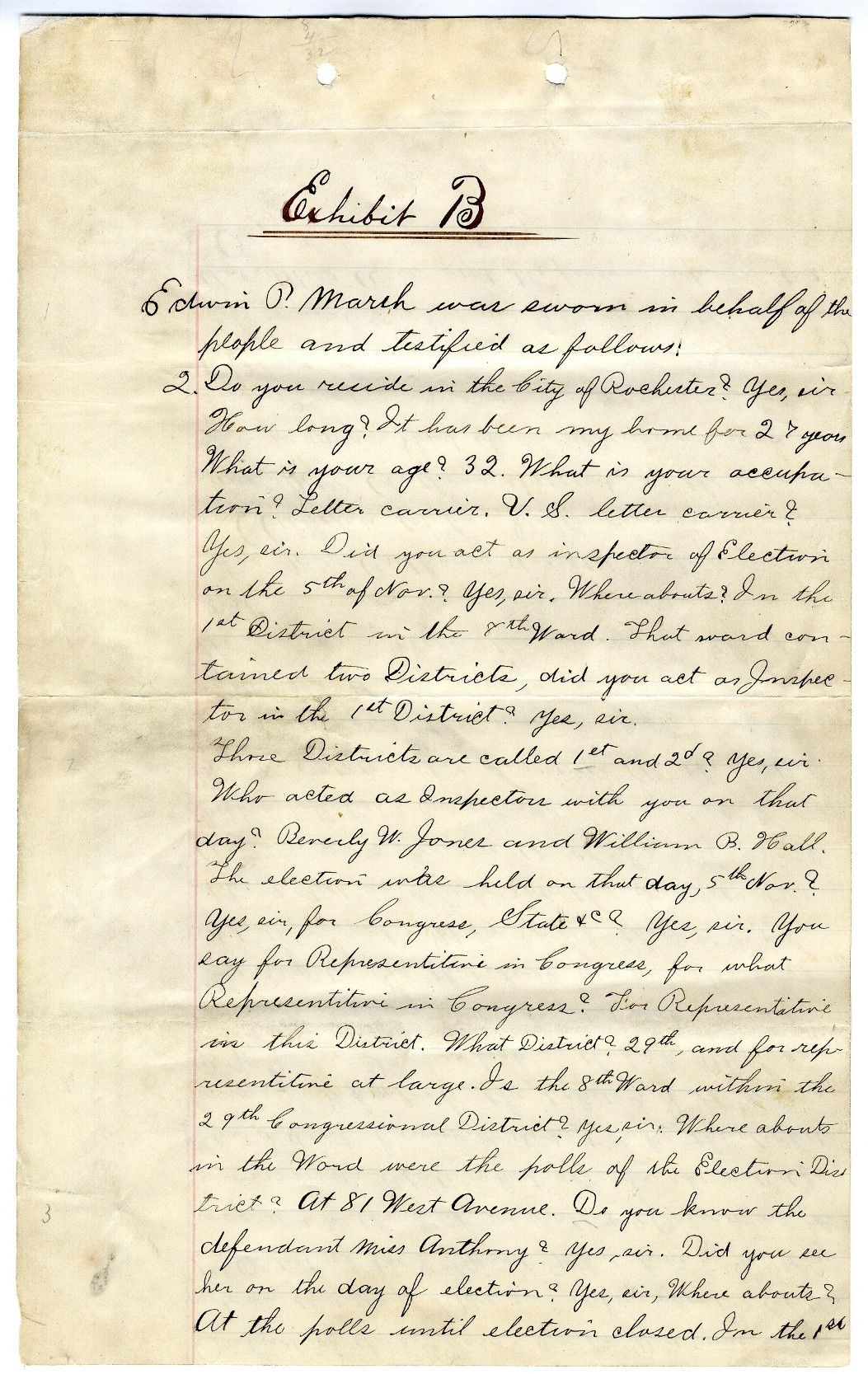
U.S. vs. Susan B. Anthony, Exhibit B, a transcript of the hearing including examination of witnesses by the defense and prosecution atorneys, and Susan B. Anthony's testimony in her own defense
Page 2
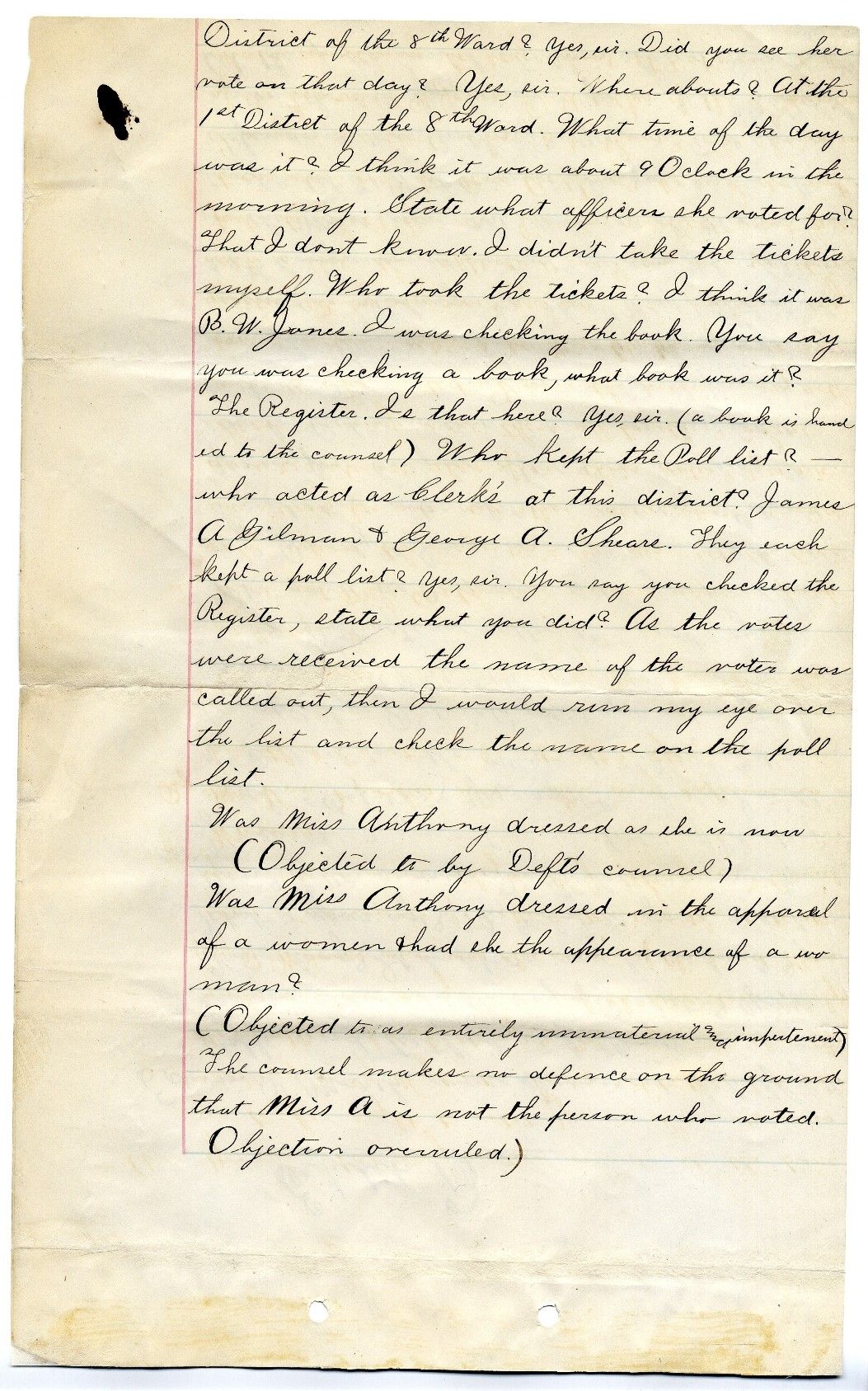
U.S. vs. Susan B. Anthony, Exhibit B, a transcript of the hearing including examination of witnesses by the defense and prosecution atorneys, and Susan B. Anthony's testimony in her own defense
Page 3
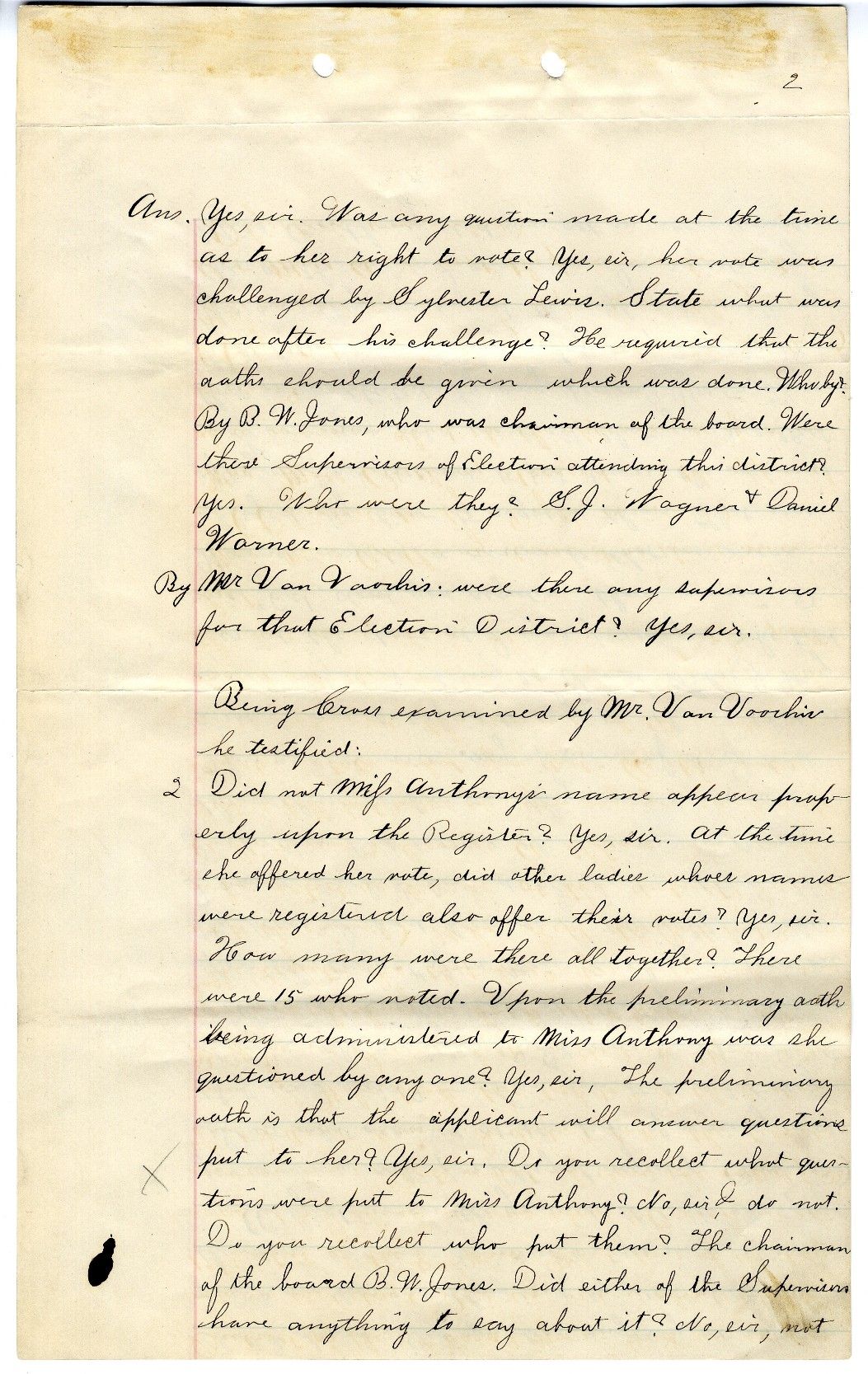
U.S. vs. Susan B. Anthony, Exhibit B, a transcript of the hearing including examination of witnesses by the defense and prosecution atorneys, and Susan B. Anthony's testimony in her own defense
Page 4
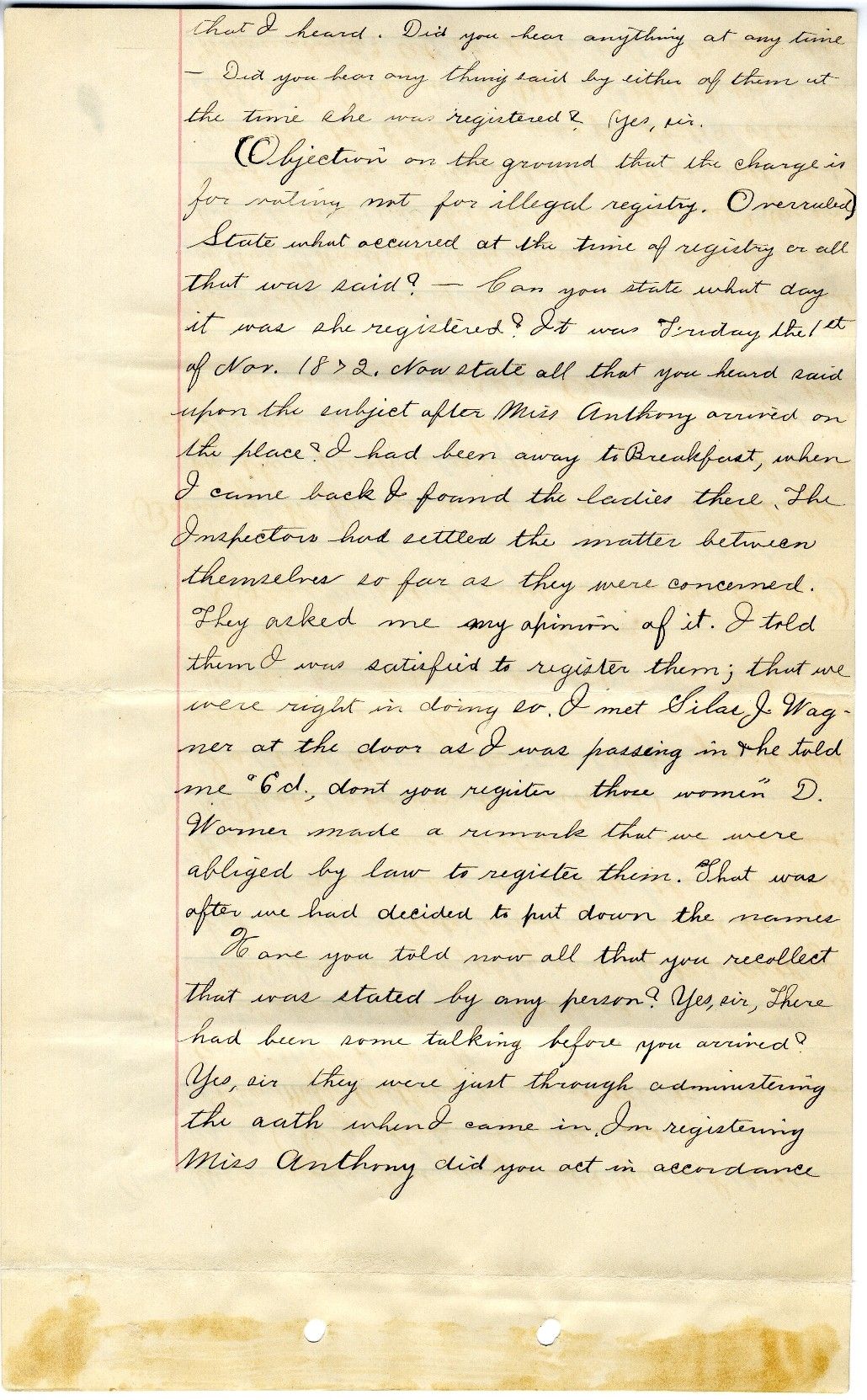
U.S. vs. Susan B. Anthony, Exhibit B, a transcript of the hearing including examination of witnesses by the defense and prosecution atorneys, and Susan B. Anthony's testimony in her own defense
Page 5
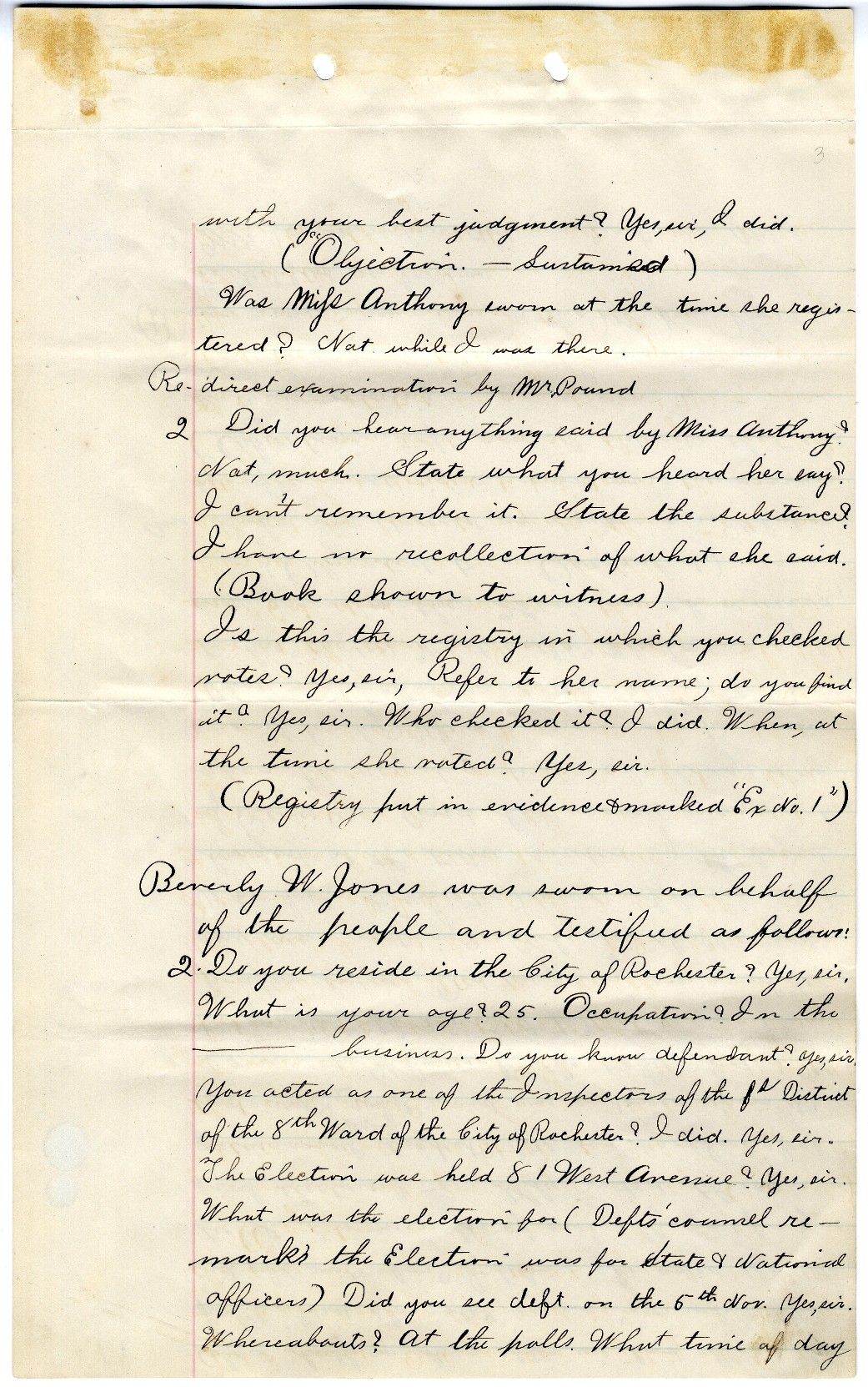
U.S. vs. Susan B. Anthony, Exhibit B, a transcript of the hearing including examination of witnesses by the defense and prosecution atorneys, and Susan B. Anthony's testimony in her own defense
Page 6
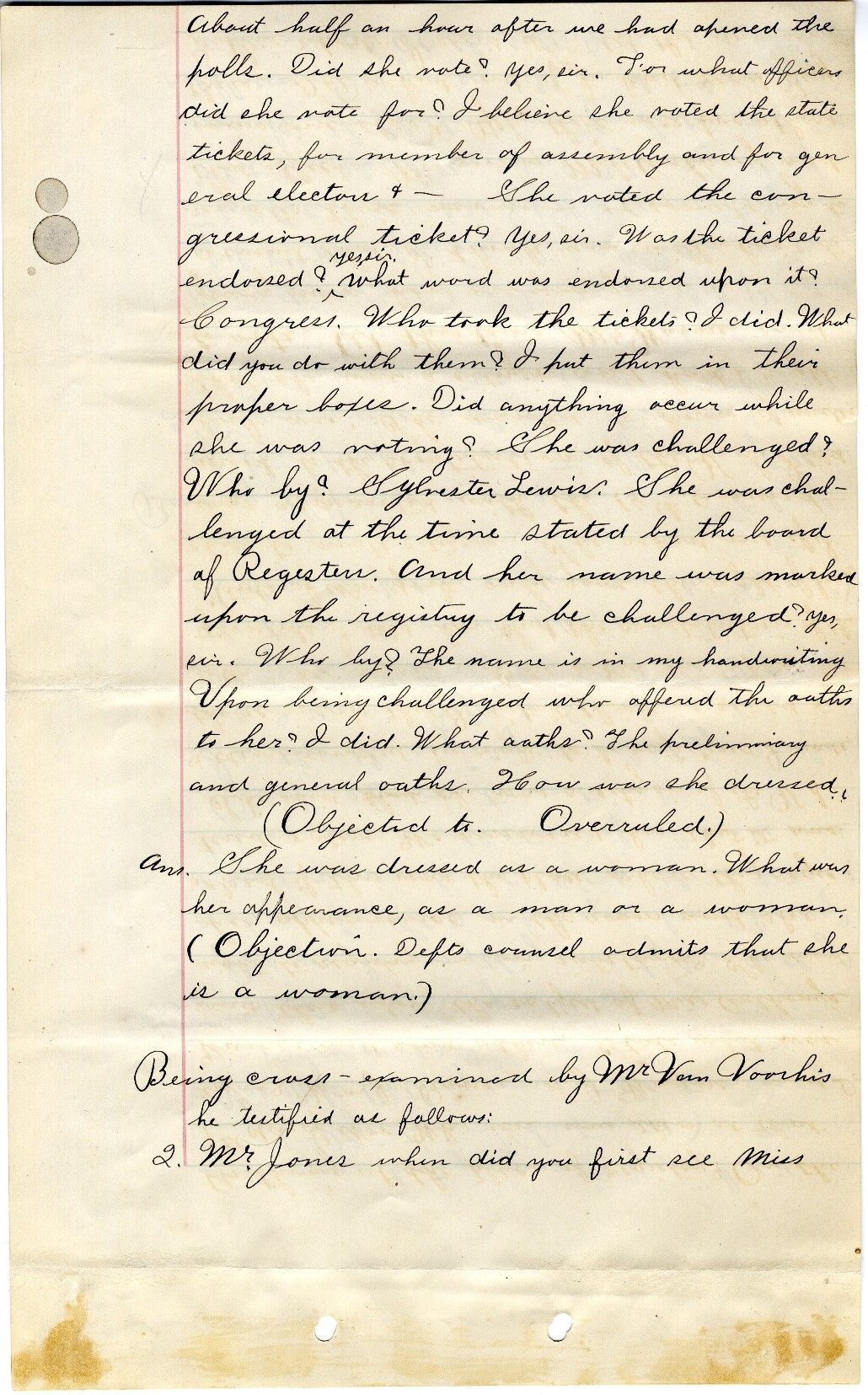
U.S. vs. Susan B. Anthony, Exhibit B, a transcript of the hearing including examination of witnesses by the defense and prosecution atorneys, and Susan B. Anthony's testimony in her own defense
Page 7
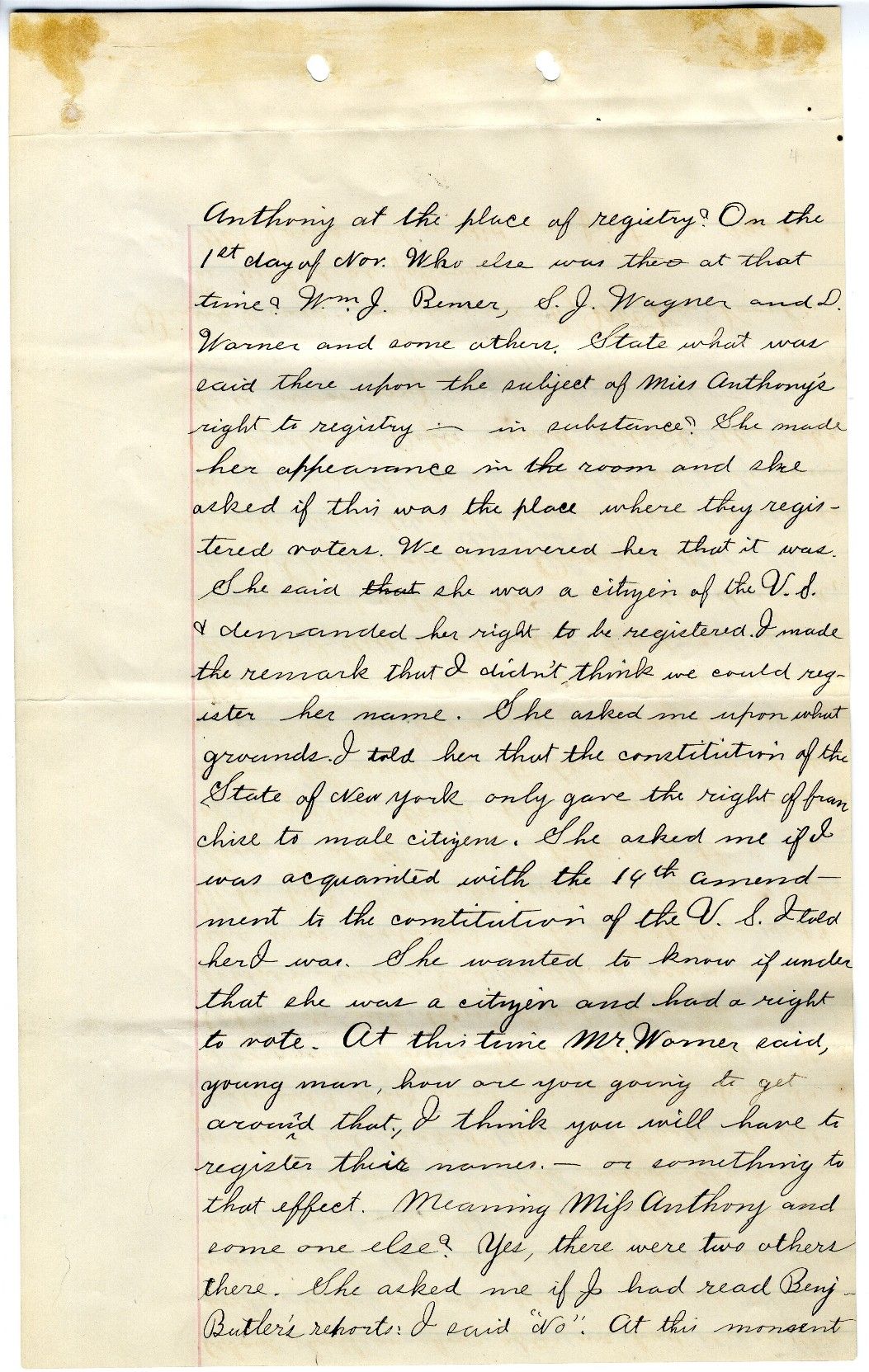
U.S. vs. Susan B. Anthony, Exhibit B, a transcript of the hearing including examination of witnesses by the defense and prosecution atorneys, and Susan B. Anthony's testimony in her own defense
Page 8
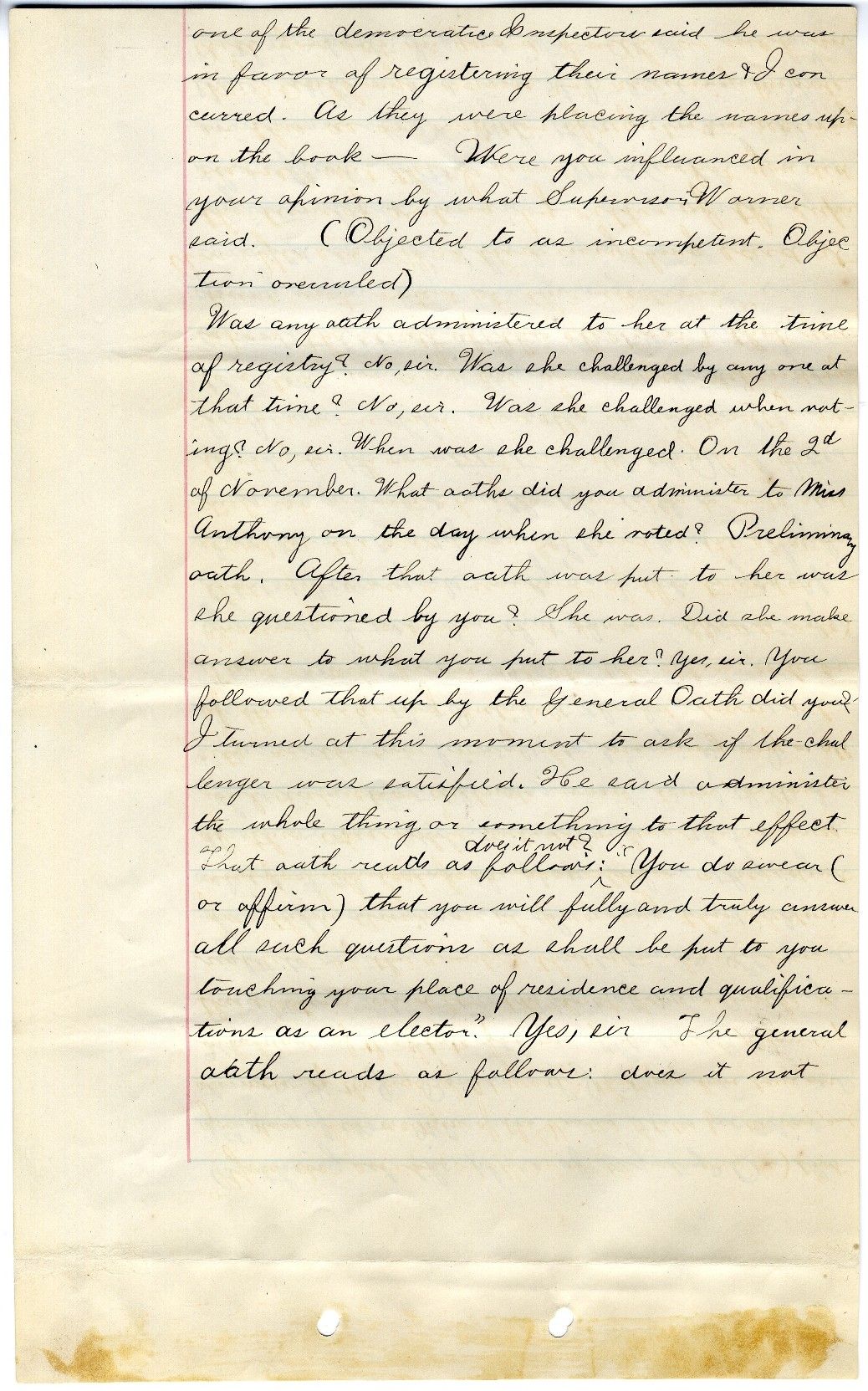
U.S. vs. Susan B. Anthony, Exhibit B, a transcript of the hearing including examination of witnesses by the defense and prosecution atorneys, and Susan B. Anthony's testimony in her own defense
Page 9
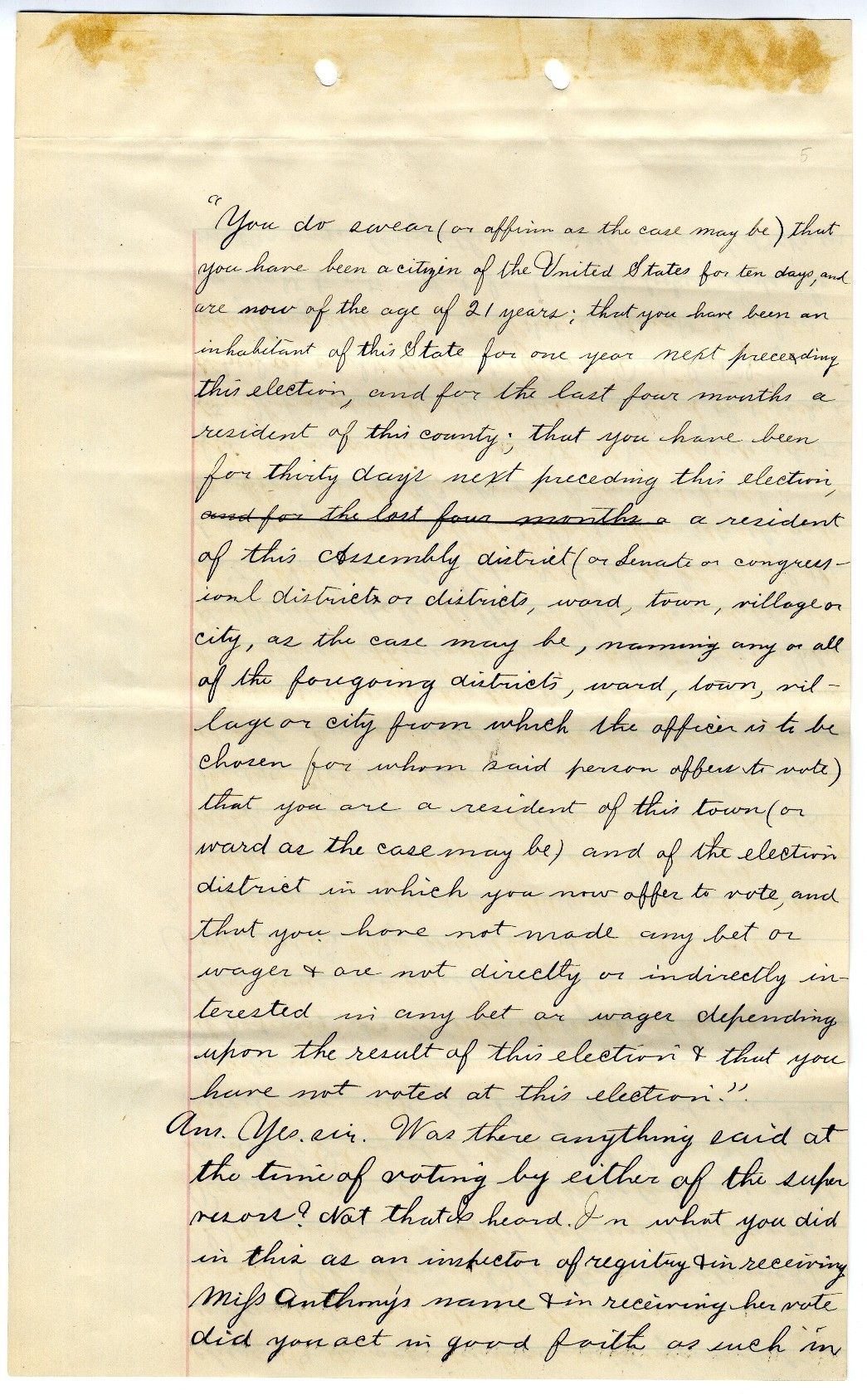
U.S. vs. Susan B. Anthony, Exhibit B, a transcript of the hearing including examination of witnesses by the defense and prosecution atorneys, and Susan B. Anthony's testimony in her own defense
Page 10
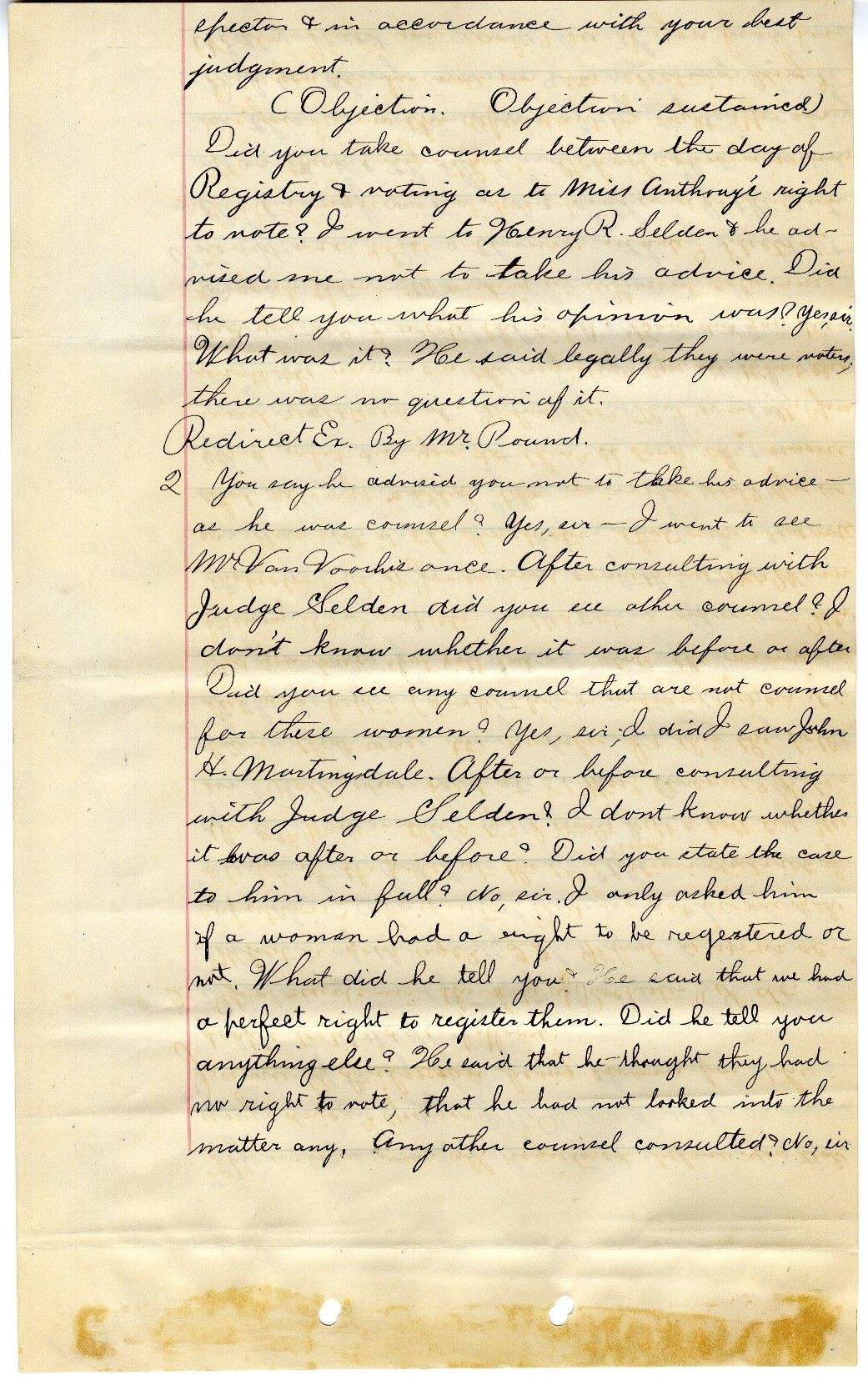
U.S. vs. Susan B. Anthony, Exhibit B, a transcript of the hearing including examination of witnesses by the defense and prosecution atorneys, and Susan B. Anthony's testimony in her own defense
Page 11
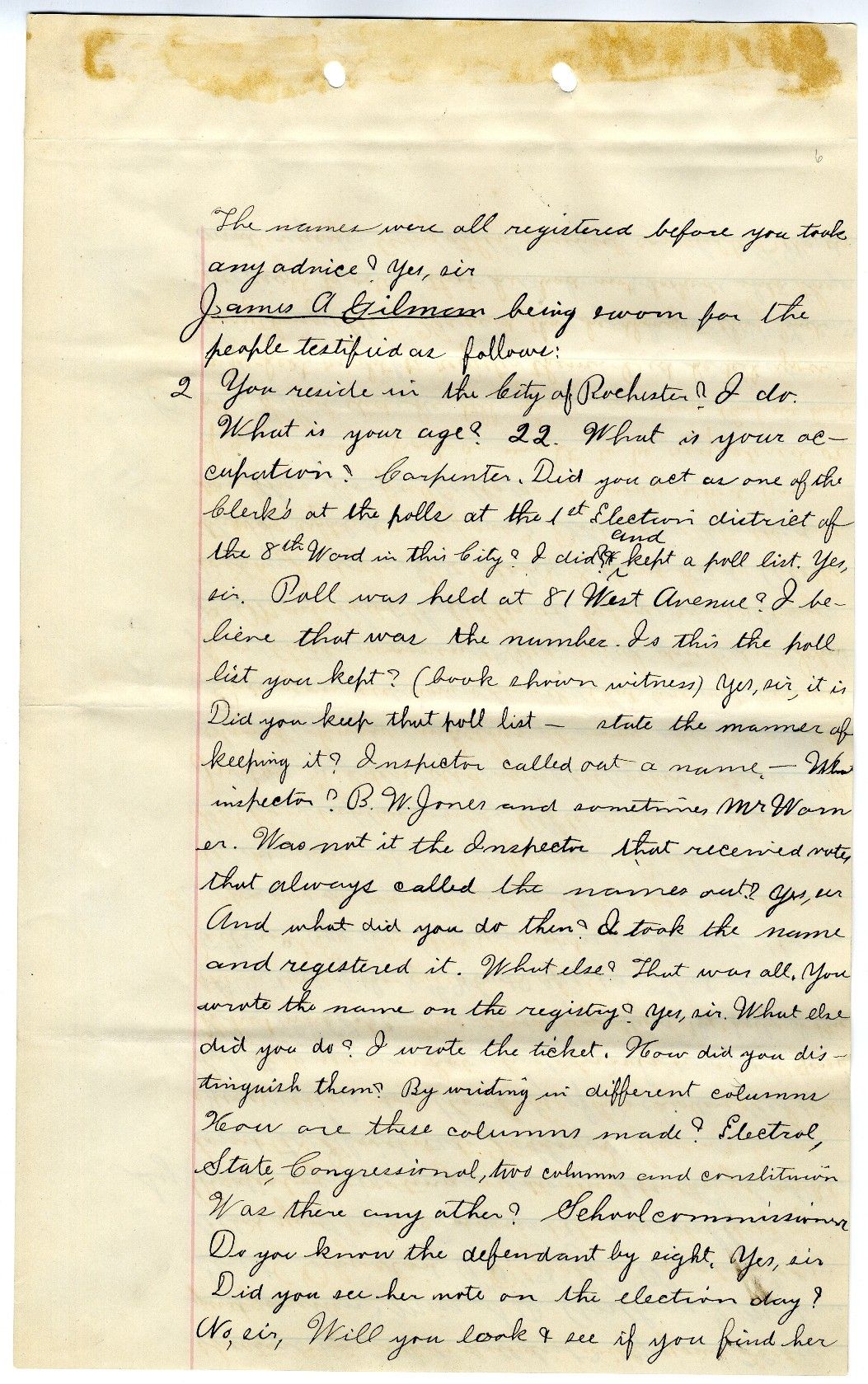
U.S. vs. Susan B. Anthony, Exhibit B, a transcript of the hearing including examination of witnesses by the defense and prosecution atorneys, and Susan B. Anthony's testimony in her own defense
Page 12
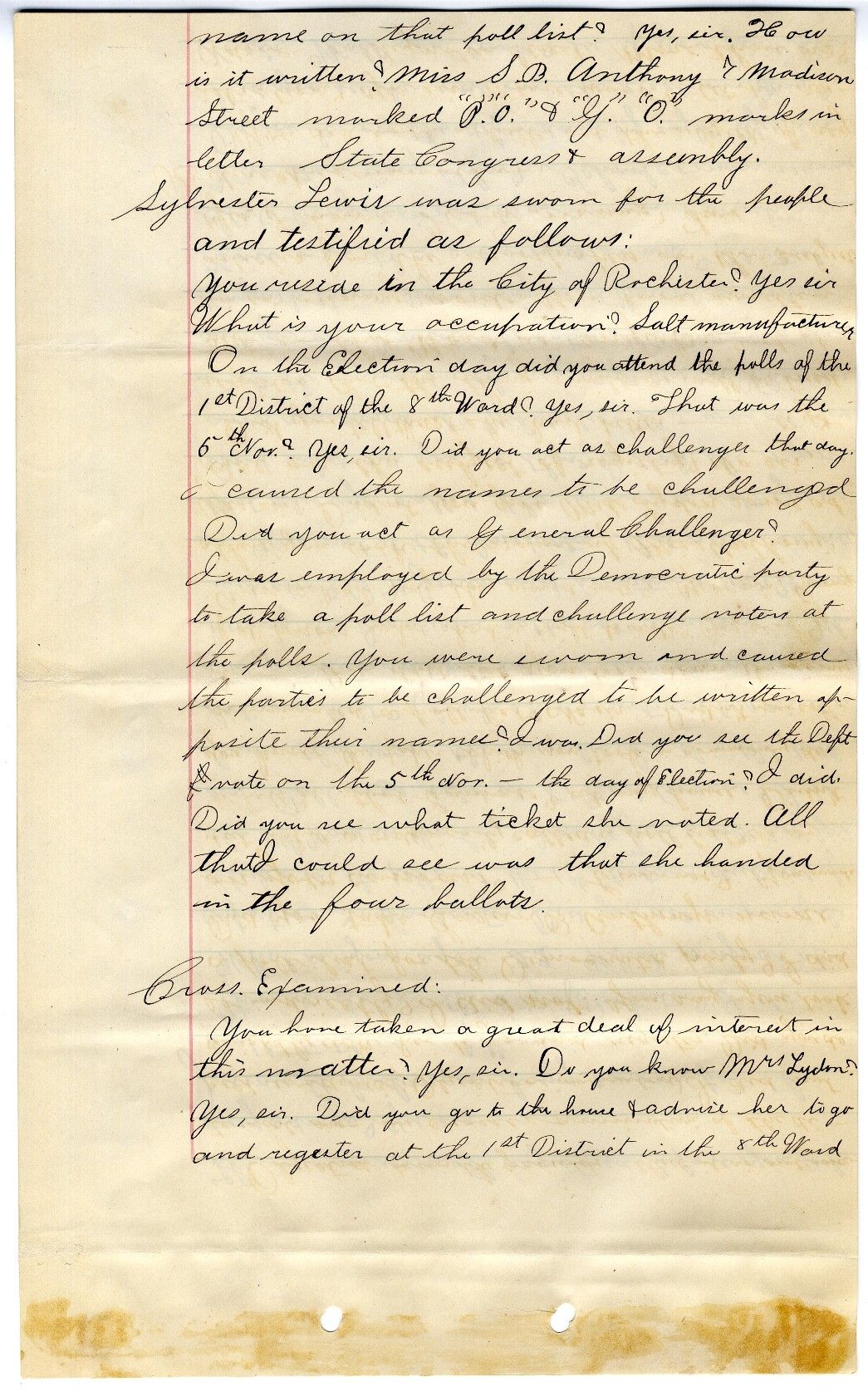
U.S. vs. Susan B. Anthony, Exhibit B, a transcript of the hearing including examination of witnesses by the defense and prosecution atorneys, and Susan B. Anthony's testimony in her own defense
Page 13
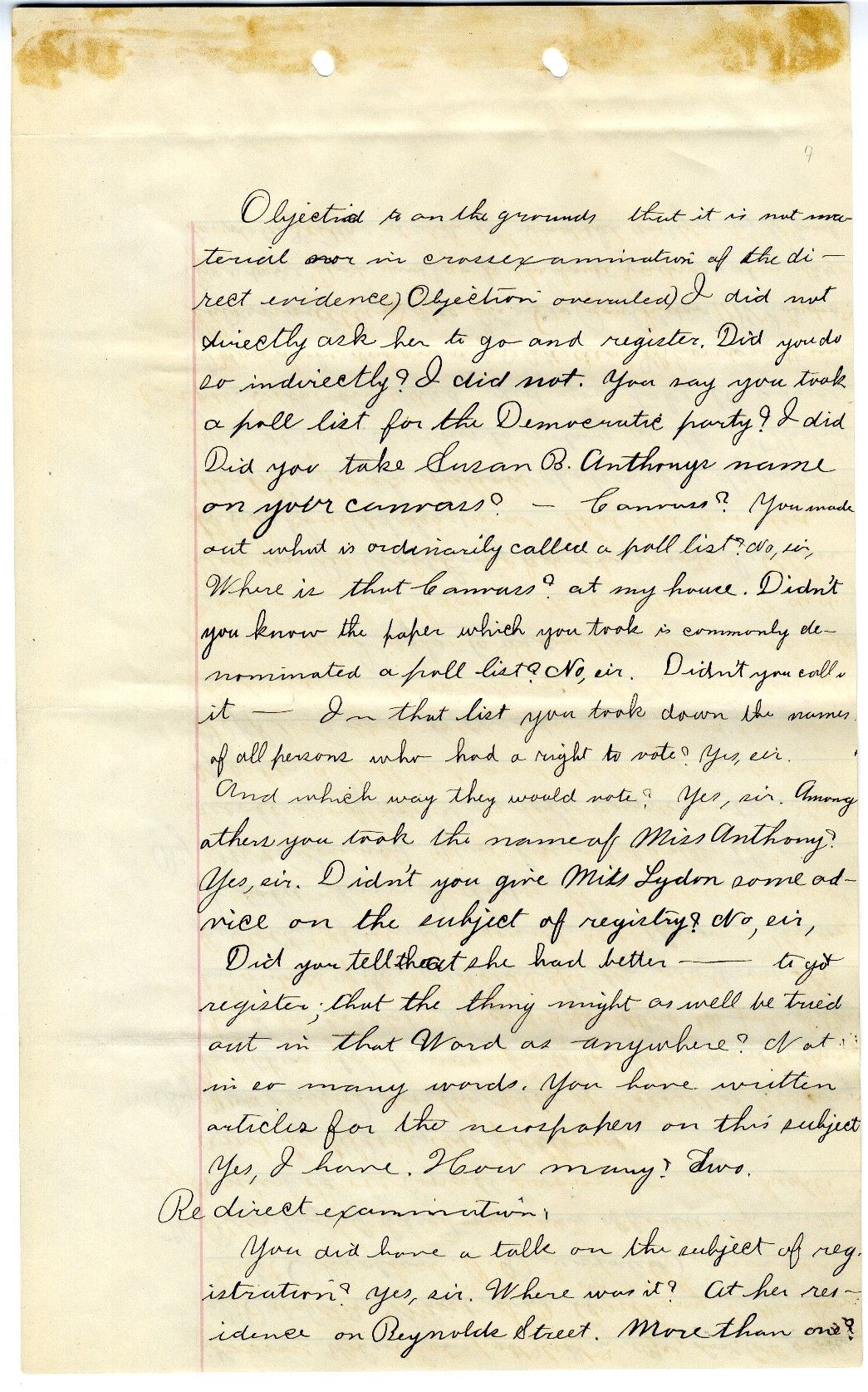
U.S. vs. Susan B. Anthony, Exhibit B, a transcript of the hearing including examination of witnesses by the defense and prosecution atorneys, and Susan B. Anthony's testimony in her own defense
Page 14
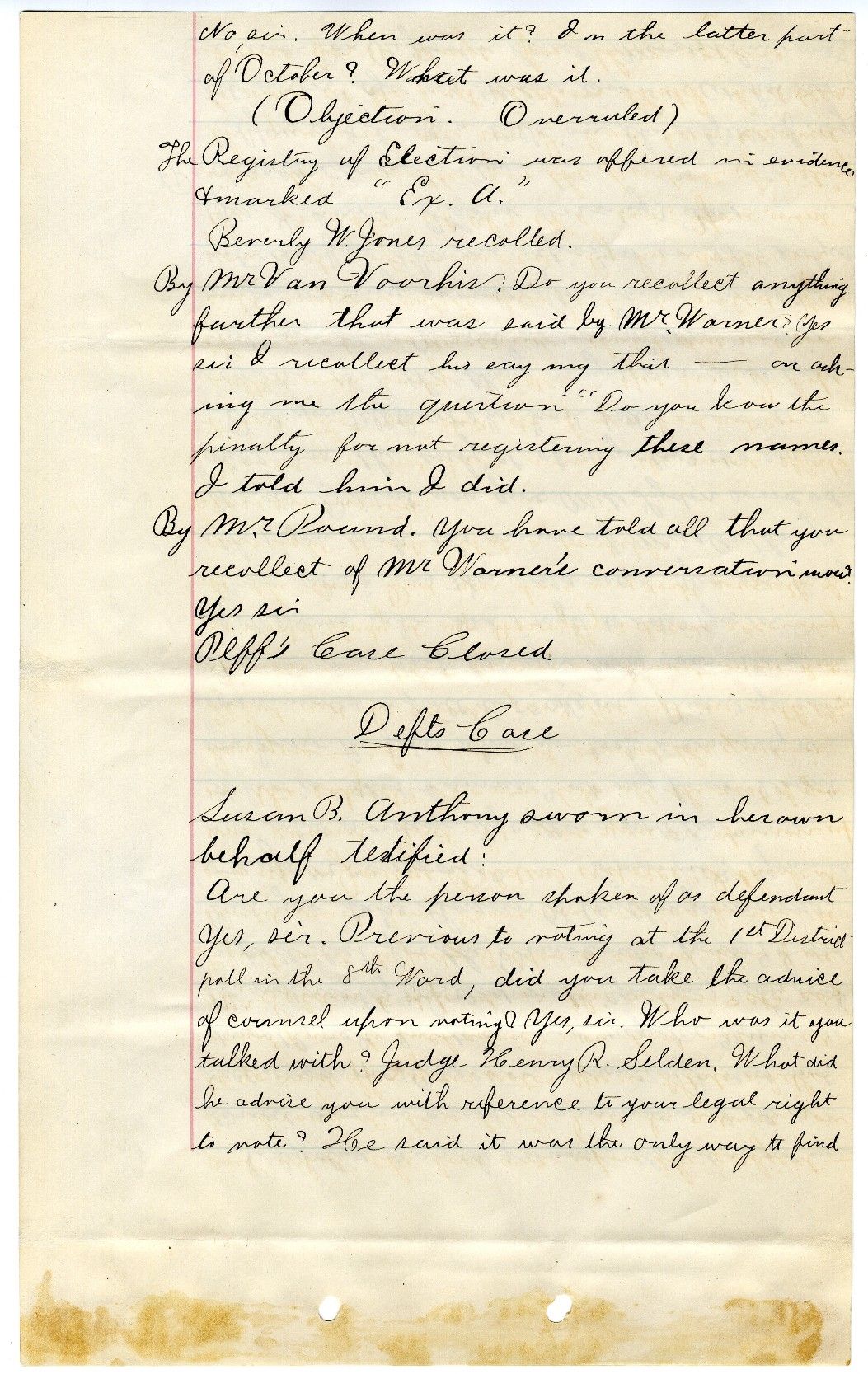
U.S. vs. Susan B. Anthony, Exhibit B, a transcript of the hearing including examination of witnesses by the defense and prosecution atorneys, and Susan B. Anthony's testimony in her own defense
Page 15
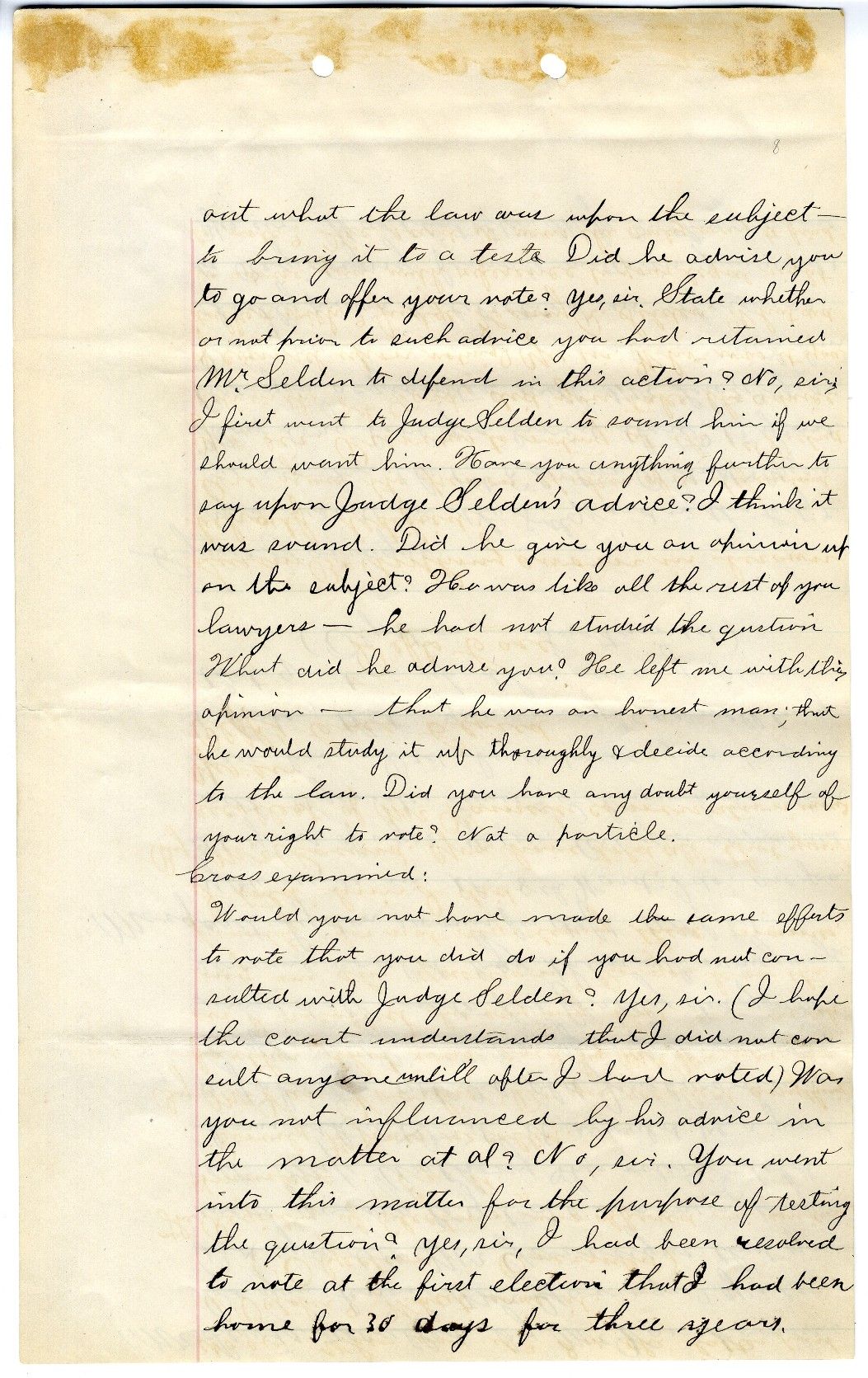
U.S. vs. Susan B. Anthony, Exhibit B, a transcript of the hearing including examination of witnesses by the defense and prosecution atorneys, and Susan B. Anthony's testimony in her own defense
Page 16
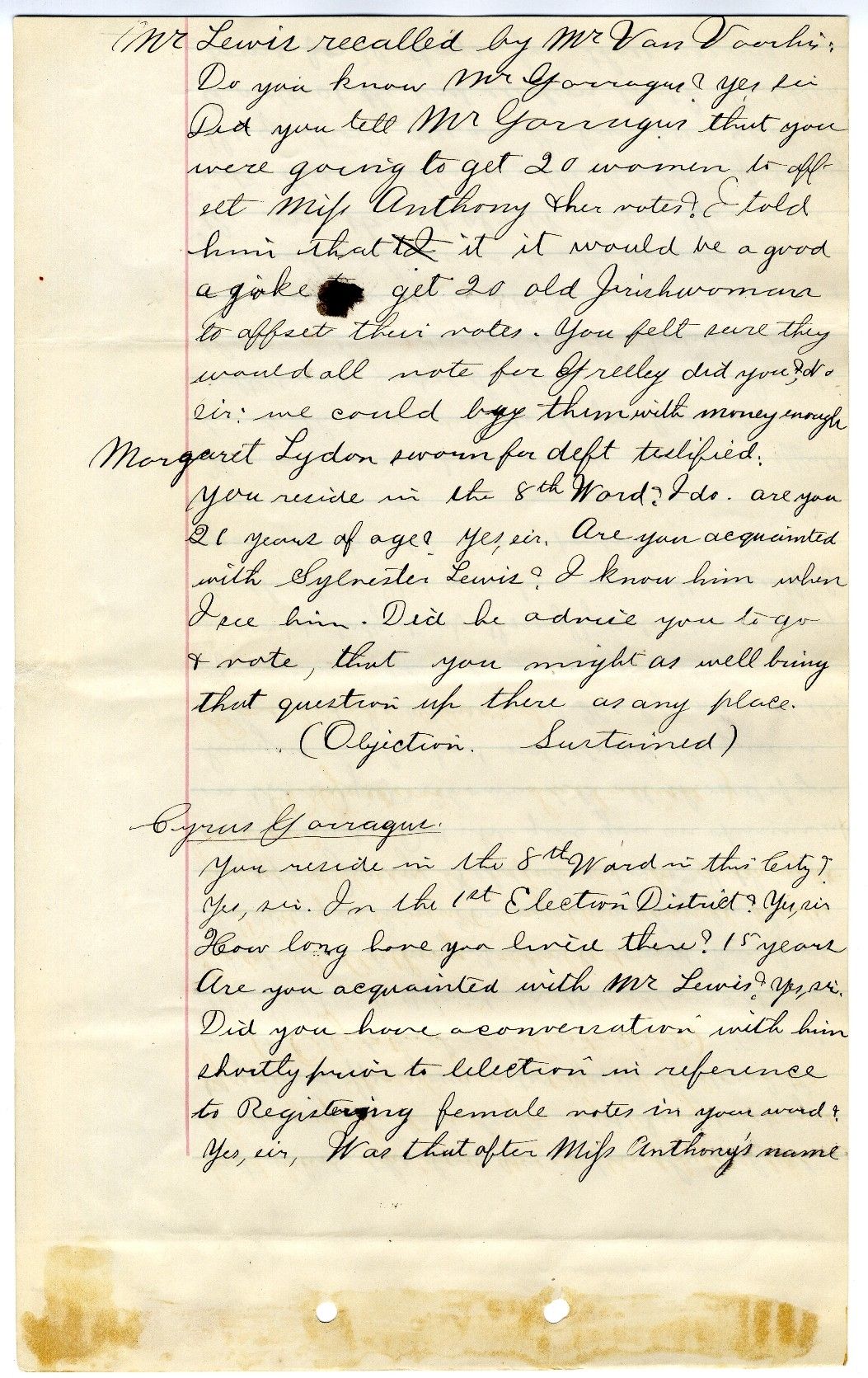
U.S. vs. Susan B. Anthony, Exhibit B, a transcript of the hearing including examination of witnesses by the defense and prosecution atorneys, and Susan B. Anthony's testimony in her own defense
Page 17
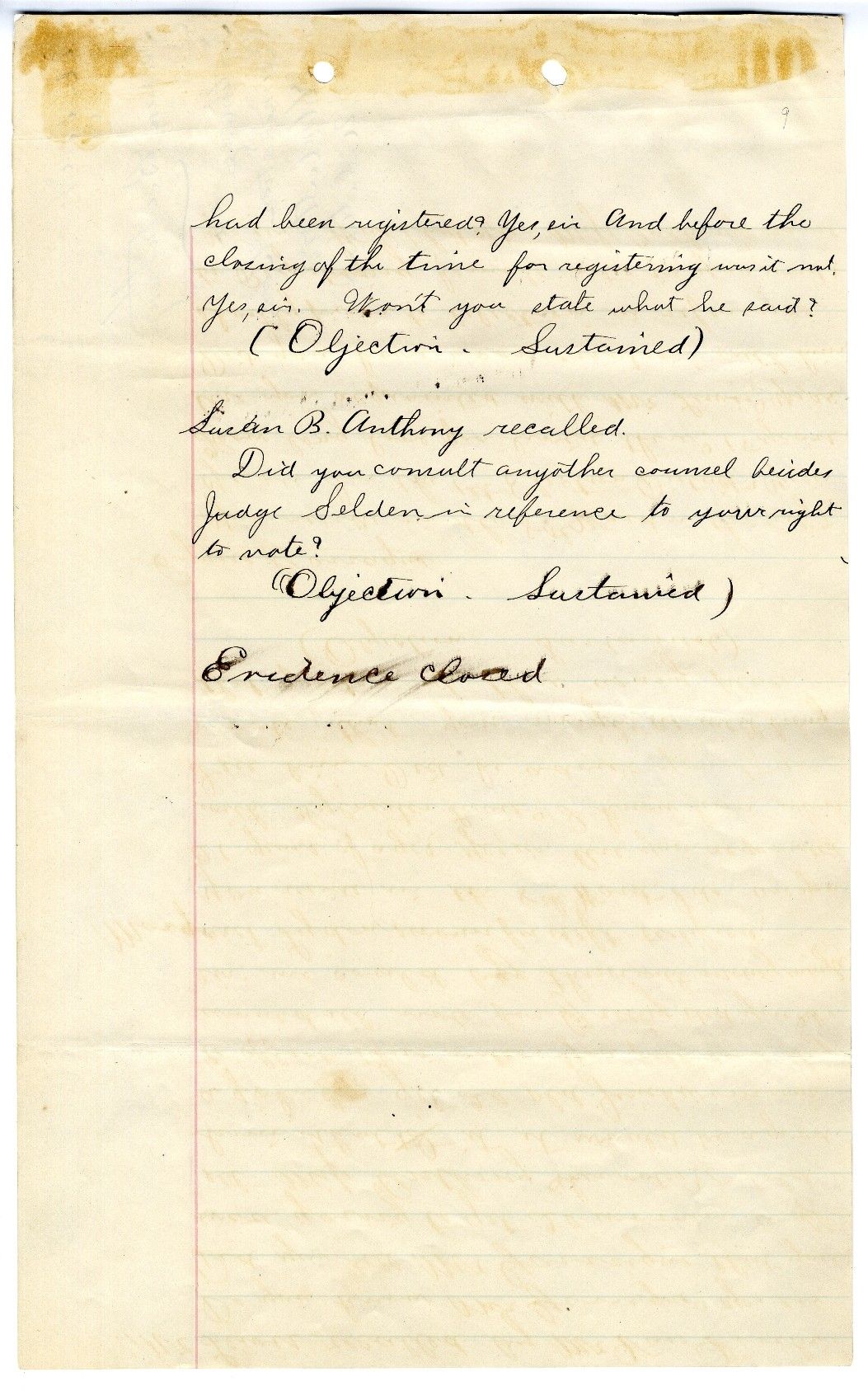
U.S. vs. Susan B. Anthony, Exhibit B, a transcript of the hearing including examination of witnesses by the defense and prosecution atorneys, and Susan B. Anthony's testimony in her own defense
Page 18
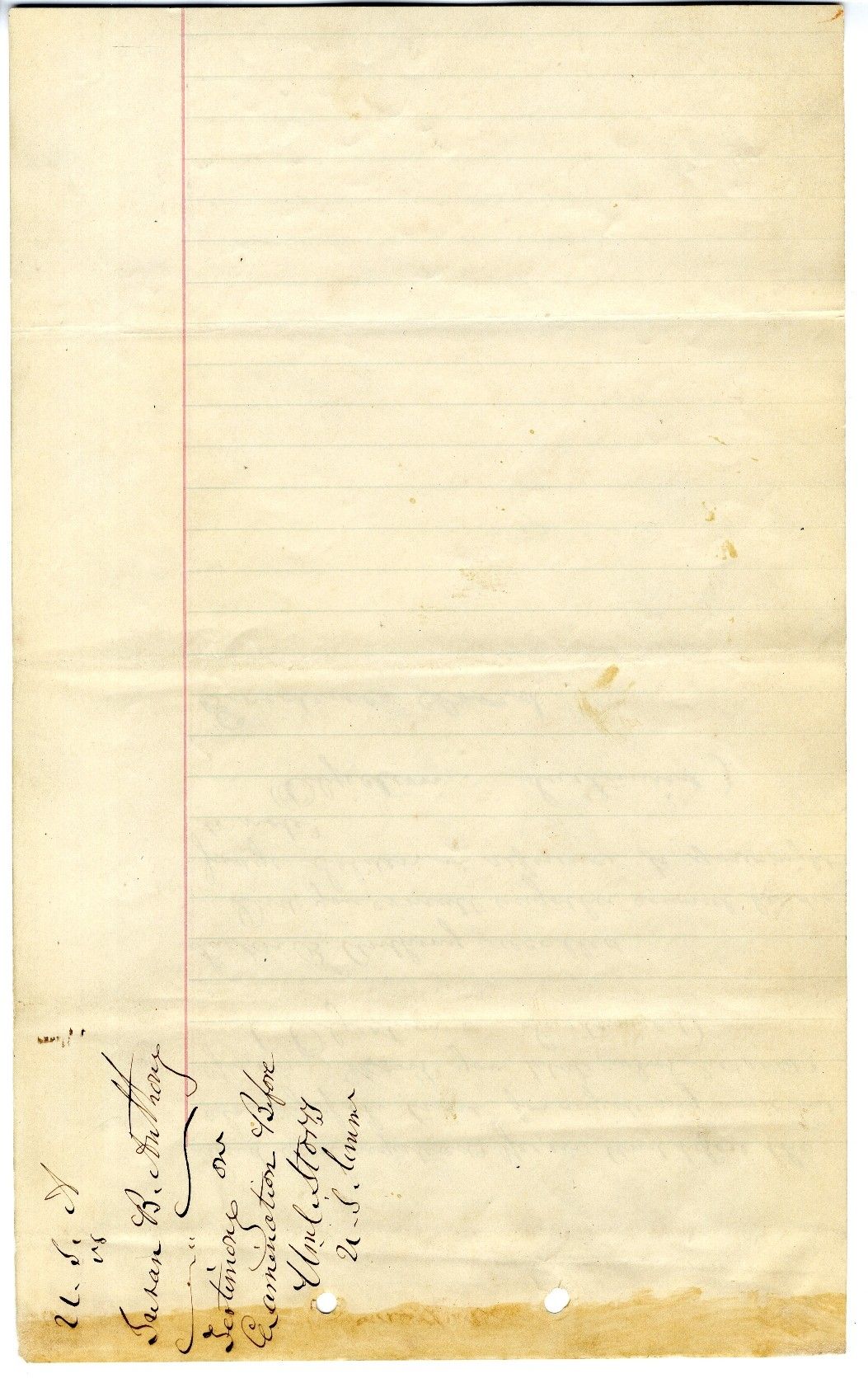
Document
U.S. vs. Susan B. Anthony, Exhibit B, a transcript of the hearing including examination of witnesses by the defense and prosecution atorneys, and Susan B. Anthony's testimony in her own defense
6/17/1873-6/18/1873
This document comes from the court case U.S. vs. Susan B. Anthony. It is Exhibit B, a transcript of the hearing including examination of witnesses by the defense and prosecution atorneys, and Susan B. Anthony's testimony in her own defense.
Anthony's was one of several federal court cases involving women arrested for illegally voting in the 1872 election in Rochester, NY, 48 years before the 19th amendment passed in 1920.
Anthony's was one of several federal court cases involving women arrested for illegally voting in the 1872 election in Rochester, NY, 48 years before the 19th amendment passed in 1920.
Transcript
Exhibit BEdwin P. March was sworn in behalf of the people and testified as follows:
2. Do you reside in the City of Rochester? Yes, sir How long? It has been my home for 27 years What is your age? 32. What is your occupation? Letter carrier. U.S. letter carrier? Yes, sir. Did you act as inspector of Election on the 5th of No? Yes, sir. Where abouts? In the 1st District in the 8th Ward. That ward contained two Districts, did you act as Inspector in the 1st? Yes, sir. Those districts are called 1st and 2nd? Yes, sir. Who acted as Inspector with you on that day? Beverly W. Jones and Williiam B. Hall. The election was held on that day, 5th Nov.? Yes, sir, for Congress, State &c ? Yes sir. You say for Representitive in Congress, for what Representitivi in Congress? Representitive in this District. What District? 29th, and for representative at large. Is the 8th Ward within the 29 Congressional District? Yes, sir. Where about in the Ward were the polls of the Election District? At 81 West Avenue. Do you know the defendant Miss Anthony? Yes, sir. Did you see her on the day of election? Yes, sir, Where abouts? At the polls until election closed. In the 1st
District of the 8th Ward? Yes, sir. Did you see her vote on that day? Yes, sir. Where abouts? At the 1st District of the 8th Ward. What time of the day was it? I think it was about 9 O clock in the morning. State what officers she voted for? That I dont know. I didn’t take the tickets myself. Who took the tickets? I think it was B. W. Jones. I was checking the book. You say you were checking a book, what book was it? The Register. Is that here? Yes, sir. (a book is handed to the counsel) Who kept the Poll list? - who acted as Clerk’s at this district? James A Gilman & George A. Sheare. They each kept a poll list? Yes, sir. You say you checked the Register, state what you did? As the votes were received the name of the voter was called out, then I would run my eye over the list and check the name on the poll list.
Was Miss Anthony dressed as she is now
(Objected to by Deft’s counsel)
Was Miss Anthony dressed in the apparel of a woman & had she that appearance of a woman?
(Objected to as entirely immaterial and impertinent)
The counsel makes no defence on the ground that Miss A is not the person who voted.
Objection overruled.)
Ans. (Yes, sir. Was any question made at the time as to her right to vote? Yes, sir, her vote was challenged by Sylvester Lewis. State what was done after his challenge? He required that the oaths should be given which was done. Who by? By B.W. Jones, who was chairman of the board. Were there Supervisors of Election attending this district? Yes. Who were they? S.J. Wagner & Daniel Warner.
By Mr. Van Voorhis. Were there any supervisors for that Election District? Yes, sir.
Being Cross examined by Mr. Van Voorhis he testified:
2 Did not Miss Anthony’s name appear properly upon the Register? Yes, sir. At the time she offered her vote, did other ladies whose names were registered also offer their votes? Yes, sir. How many were there all together? There were 15 who voted. Upon the preliminary oath being administered to Miss Anthony was she questioned by any one? Yes, sir. The preliminary oath is that the applicant will answer questions put to her? Yes, sir. Do you recollect what questions were put to Miss Anthony? No, sir. I do not. Do you recollect who put them? The chairman of the board B.W. Jones. Did either of the Supervisors have anything to say about it? No, sir, not
that I heard. Did you hear anything at any time - Did you hear thing said by either of them at the time she was registered? Yes, sir.
(Objection on the ground that the charge is for voting not for illegal registry. Overruled) State what occurred at the time of registry or all that was said? – Can you state what day it was she registered? It was Friday the 1st of Nov. 1872. Now state all that you heard said upon the subject after Miss Anthony arrived on the place? I had been away to Breakfast, when I came back I found the ladies there. The Inspectors had settled the matter between themselves so far as they were concerned. They asked me my opinion of it. I told them I was satisfied to register them; that we were right in doing so. I met Silas J. Wagner at the door as I was passing in & he told me “[Ed.,?] don’t you register those women” D. Warner made a remark that we were abliged by law to register them. That was after we had decided to put down the names
Have you told now all that you recollect that was stated by any person? Yes, sir, There had been some talking before you arrived? Yes, sir they were just through administering the oath when I came in. In registering Miss Anthony did you act in accordance
with your best judgment? Yes, sir, I did.
(Objection. – Sustained)
Was Miss Anthony sworn at the time she registered? Not while I was there.
Re-direct examination by Mr. Pound
2 Did you hear anything said by Miss Anthony? Not, much. State what you heard her say? I can’t remember it. State the substance? I have no recollection of what she said.
(Book shown to witness)
Is this the registry in which you checked votes? Yes, sir, Refer to her name; do you find it? Yes, sir. Who checked it? I did. When, at the time she voted? Yes, sir.
(Registry put in evidence & marked “Ex No. 1”)
Beverly W. Jones was sworn on behalf of the people and testified as follows:
2. Do you reside in the City of Rochester? Yes, sir. What is your age? 25. Occupation? In the ______ business. Do you know defendant? Yes, sir. You acted as one of the Inspectors of the [1s?] District of the 8th Ward of the City of Rochester? I did. Yes, sir. The election was held 81 West Avenue? Yes, sir. What was the election for (Defts’ councel remarks the Election was for State and National officers) Did you see deft. on the 5th Nov. Yes, sir. Whereabouts? At the polls. What time of day
About half an hour after we had opened the polls. Did she vote? Yes, sir. For what officers did she vote for? I believe she voted the state tickets, for members of assembly and for general election & - She voted the congressional ticket? Yes, sir. Was the ticket endorsed? Yes, sir. What word was endorsed upon it? Congress. Who took the tickets? I did. What did you do with them? I put them in their proper boxes. Did anything occur while she was voting? She was challenged? Who by? Sylvester Lewis. She was challenged at the time stated by the board of Register. And her name was marked upon the registry to be challenged? Yes, sir. Who by? The name is in my handwriting. Upon being challenged who offered the oaths to her? I did. What oaths? The preliminary and general oaths. How was she dressed.
(Objected to. Overruled.)
Ans. She was dressed as a woman. What was her appearance, as a man or a woman.
(Objection. Defts counsel admits that she is a woman.)
Being cross-examined by Mr. Von Voorhis he testified as follows:
2. Mr. Jones when did you first see Miss
Anthony at the place of registry? On the 1st day of Nov. Who else was there at the time? Wm J. Bemer, S. J. Wagner and D. Warner and some others. State what was said there upon the subject of Miss Anthony’s right to registry - in substance? She made her appearance in the room and she asked if this was the place where they registered voters. We answered her that it was. She said that she was a citizen of the U.S. and demanded her right to be registered. I made the remark that I didn’t think we could register her name. She asked me upon what grounds. I told her that the constitution of the State of New York only gave the right of franchise to male citizens. She asked me if I was acquainted with the 14th amendment to the constitution of the U.S. I told her I was. She wanted to know if under that she was a citizen and had a right to vote. At this time Mr. Warner said, young man, how are you going to get [arou d n is inserted with a caret] that., I think you will have to register their names. - or something to that effect. Meaning Miss Anthony and some one else? Yes, there were two others there. She asked me if I had read Benj Butler’s report: I said “No”. At the moment
one of the democratic Inspectors said he was in favor of registering their names & I concurred. As they were placing the names upon the book - Were you influenced in your opinion by what Supervisor Warner said. (Objected to as incompetent. Objection overruled)
Was any oath administered to her at the time of registry? No, sir. Was she challenged by any one at that time? No, sir. Was she challenged when voting? No, sir. When was she challenged. On the 2d of November. What oaths did you administer to Miss Anthony on the day she voted? Preliminary oath. After that oath was put to her was she questioned by you? She was. Did she make answer to what you put to her? Yes, sir. You followed that up by the General Oath did you? I turned at this moment to ask if the challenger was satisfied. He said administer the whole thing or something to that effect. That oath reads as follows: [does it not is inserted with a caret] You do swear (or affirm) that you will fully and truly answer all such questions as shall be put to you touching your place of residence and qualifications as an elector.” Yes, sir The general oath reads as follows: does it not
“You do swear (or affirm as the case may be) that you have been a citizen of the United States for ten days, and are now of the age of 21 years: that you have been an inhabitant of this State for one year next preceeding this election, and for the last four months a resident of this county; that you have been for thirty days next preceding this election, and for the last four months a resident of this Assembly district (or Senate or congressional districts or districts, ward, town, village or city, as the case may be, naming any and all of the foregoing districts, ward, town, village or city from which the officer is to be chosen for whom said person offers to vote) that you are a resident of this town (or ward as the case may be) and of the election district in which you now offer to vote, and that you have not made any bet or wager & are not directly or indirectly interested in any bet or wager depending upon the result of this election & that you have not voted at this election.”
Ans. Yes, sir. Was there anything said at the time of voting by either of the supervisors? Not that I heard. In what you did in this as an inspector of registry & in receiving Miss Anthony’s name & in receiving her vote did you act in good faith as such
inspector and in accordance with your best judgment.
(Objection. Objection sustained)
Did you take counsel between the day of Registry & voting as to Miss Anthony’s right to vote? I went to Henry R. Selden & he advised me not to take his advice. Did he tell you what his opinion was? Yes, sir. What was it? He said legally they were voters, there was no question of it.
Redirect Ex. By Mr. Pound.
2. You say he advised you not to [the with take superimposed] his advice - as he was counsel? Yes, sir - I went to see Mr. Von Voorhis once. After consulting with Judge Selden did you see other counsel? I don’t know whether it was before or after Did you see any counel that are not councel for these women? Yes, sir. I did I saw John H. Mortingdale. After or before consulting with Judge Seldon? I don’t know whether it [ I with was superimposed] was after or before? Did you state the case to him in full? No, sir. I only asked him if a woman had a right to be regestered or not. What did he tell you? He said that we had a perfect right to register them. Did he tell you anything else? He said that he thought they had no right to vote, that he had not looked into the matter any. Any other counsel consulted? No, sir
The names were all registered before you took any advice? Yes, sir
James A Gilman being sworn for the people testified as follows:
2 You reside in the City of Rochester? I do. What is your age? 22. What is your occupation? Carpenter. Did you act as one of the Clerk’s at the polls at the 1st Election district of the 8th Ward and in this City? I did & [and added with a caret] kept a poll list. Yes, sir. Poll was held at 81 West Avenue? I believe that was the number. Is this the poll list you kept? (book shown witness) Yes, sir, it is Did you keep that poll list – state the manner of keeping it? Inspector called out a name - What inspector? What inspector? B. W. Jones and sometimes Mr Warner. Was not it the Inspector that received votes that always called the names out? Yes, sir And what did you do then? I took the name and registered it. What else? That was all. You wrote the name on the registry? Yes, sir. What else did you do? I wrote the ticket. How did you distinguish them? By writing in different columns How are these columns made? Electrol, State, Congressional, two columns and [constitution?] Was there any other? School commissioner Do you know the defendant by sight. Yes, sir Did you see her vote on the election day? No, sir, Will you look & see if you find her
Name on the poll list? Yes, sir. How is it written? Miss S.B. Anthony 7 Madison Street marked “P.””O.” & “G.””O.” marks in letter State Congress & assembly.
Sylvester Lewis was sworn for the people and testified as follows:
You reside in the City of Rochester? Yes sir. What is your occupation? Salt manufacturer On the election day did you attend the polls of the 1st District of the 8th Ward? Yes, sir. That was the 5th Nov.? Yes, sir. Did you act as challenger that day. I [counted?] the names to be challenged Did you act as General Challenger? I was employed by the
Democratic party to take a poll list and challenge voters at the polls. You were sworn and [caused?] the parties to be challenged to be written opposite their names? I was. Did you see the Deft f vote on the 5th Nov. – the day of Election? I did. Did you see what ticket she voted. All that I could see was that she handed in the four ballots.
Cross Examined:
You have taken a great deal of interest in this matter? Yes, sir. Do you know Mrs Lydon? Yes, sir. Did you go to the house & advise her to go and register at the 1st District in the 8th Ward
Object[ed superimposed over ion] to on the grounds that it is immaterial (onor ?) in crossexamination of the direct evidence[, (?] Objective overruled) I did not directly ask her to go and register. Did you do so directly? I did not. You say you took a poll list for the Democratic party? I did. Did you take Susan B. Anthonys name on your canvass? – Canvass? You made out was ordinarily called a poll list? No, sir. Where is that Canvass? at my house. Didn’t you know the paper which you took is commonly denominated a poll list? No, sir. Didn’t you call [n?] it - In that list you took down the names of all persons who had a right to vote? Yes, sir. And which way they would vote? Yes, sir. Among others you took the name of Miss Anthony? Yes, sir. Didn’t you give Miss Lydon some advice on the subject of registry? No, sir,
Did you tell [her superimposed with that?] she had better - to go & register; that the thing might as well be tried out in the Ward as anywhere? Not in so many words. You have written articles for the newspapers on this subject Yes, I have. How many? Two.
Redirect examination,
You did have a talk on the subject of registration? Yes, sir. Where was it? At her residence on Reynolds Street. More than one?
No, sir. When was it? In the latter part of October? [What superimposed over another word] was it.
(Objection. Overruled)
The Registry of Elections was offered in evidence & marked “Ex. A.”
Beverly W. Jones recalled.
By Mr Von Voorhis: Do you recollect anything further that was said by Mr. Warner? Yes, sir I recollect [his say my that?] – on asking me the question “Do you know the penalty for not registering these names. I told him I did.
By Mr. Pound. You have told all that you recollect of Mr Warner’s conversation now. Yes sir
Plff’s Case Closed
Defts Case
Susan B. Anthony sworn in her own behalf testified:
Are you the person spoken of as defendant Yes, sir. Previous to voting at the 1st District poll in the 8th Ward, did you take the advice of counsel upon voting? Yes, sir. Who was it you talked with? Judge Henry R. Selden. What did he advise you with reference to your legal right to vote? He said it was the only way to find
out what the law was upon the subject – to bring it to a teste Did he advise you to go and offer your vote? Yes, sir. State whether or not prior to each advice you had retained Mr. Selden to defend in this action? No, sir [,;?] I first went to Judge Selden to sound him if we should want him. Have you anything further to say upon Judge Selden’s advice? I think it was sound. Did he give you an opinion upon the subject? He was like all the rest of you lawyers – he had not studied the question What did he advise you? He left me with this opinion – that he was an honest man; that he would study it [up?] thoroughly & decide according to the law. Did you have any doubt yourself of your right to vote? Not a particle.
Cross examined:
Would you not have made the same efforts to vote that you did do if you had not consulted with Judge Selden? Yes, sir. (I hope the court understands that I did not consult anyone until after I had voted) Was you not influenced by his advice in the matter at al? No, sir. You went into this matter for the purpose of testing the question? Yes, sir, I had been resolved to vote at the first election that I had been home for 30 days for three years.
Mr. Lewis recalled by Mr Van Voorhis:
Do you know Mr. Garragus? Yes sir. Did you tell Mr Garrugus that you were going to get 20 women to offset Miss Anthony & her votes? I told him that t I it it would be a good [a joke to?] [ink smear] get 20 old Irishwoma[ns?] to offset their votes. You felt sure they would all vote for Greely did you? No, sir: we could [by buy superimposed?] them with money enough
Margaret Lydon sworn for deft testified:
You reside in the 8th Ward? I do. Are you 21 years of age? Yes, sir. Are you acquainted with Sylvester Lewis? I know him when I see him. Did he advice=se you to go & vote, that you might as bell bring that question up there as any place.
(Objection. Sustained)
Cyrus Garragus.
You reside in the 8th Ward in this City? Yes, sir. In the 1st Election District? Yes, sir. How long have you lived there? 15 years Are you acquainted with Mr Lewis? Yes, sir. Did you have a conversation with him shortly prior to election in reference to Register[y i superimposed]ng female votes in your ward? Yes, sir. Was that after Miss Anthony’s name had been registered? Yes, sir. And before the closing of the time for registering was it not. Yes, sir. Won’t you state what he said?
(Objection. Sustained)
Susan B. Anthony recalled.
Did you consult anyother counsel besides Judge Selden in reference to your right to vote?
(Objection. Sustained)
Evidence closed
U.S.A.
vs
Susan B. Anthony
Testimony on
Examination Before
United States
U.S. [Comm?]
This primary source comes from the Records of District Courts of the United States.
National Archives Identifier: 278300
Full Citation: U.S. vs. Susan B. Anthony, Exhibit B, a transcript of the hearing including examination of witnesses by the defense and prosecution atorneys, and Susan B. Anthony's testimony in her own defense; 6/17/1873-6/18/1873; Susan B. Anthony Criminal Case File; Criminal Cases Heard in the U.S. District Court for the Northern District of New York, 1870 - 1968; Records of District Courts of the United States, ; National Archives at New York, New York, NY. [Online Version, https://docsteach.org/documents/document/us-vs-anthony-transcript, April 19, 2024]U.S. vs. Susan B. Anthony, Exhibit B, a transcript of the hearing including examination of witnesses by the defense and prosecution atorneys, and Susan B. Anthony's testimony in her own defense
Page 1

U.S. vs. Susan B. Anthony, Exhibit B, a transcript of the hearing including examination of witnesses by the defense and prosecution atorneys, and Susan B. Anthony's testimony in her own defense
Page 2

U.S. vs. Susan B. Anthony, Exhibit B, a transcript of the hearing including examination of witnesses by the defense and prosecution atorneys, and Susan B. Anthony's testimony in her own defense
Page 3

U.S. vs. Susan B. Anthony, Exhibit B, a transcript of the hearing including examination of witnesses by the defense and prosecution atorneys, and Susan B. Anthony's testimony in her own defense
Page 4

U.S. vs. Susan B. Anthony, Exhibit B, a transcript of the hearing including examination of witnesses by the defense and prosecution atorneys, and Susan B. Anthony's testimony in her own defense
Page 5

U.S. vs. Susan B. Anthony, Exhibit B, a transcript of the hearing including examination of witnesses by the defense and prosecution atorneys, and Susan B. Anthony's testimony in her own defense
Page 6

U.S. vs. Susan B. Anthony, Exhibit B, a transcript of the hearing including examination of witnesses by the defense and prosecution atorneys, and Susan B. Anthony's testimony in her own defense
Page 7

U.S. vs. Susan B. Anthony, Exhibit B, a transcript of the hearing including examination of witnesses by the defense and prosecution atorneys, and Susan B. Anthony's testimony in her own defense
Page 8

U.S. vs. Susan B. Anthony, Exhibit B, a transcript of the hearing including examination of witnesses by the defense and prosecution atorneys, and Susan B. Anthony's testimony in her own defense
Page 9

U.S. vs. Susan B. Anthony, Exhibit B, a transcript of the hearing including examination of witnesses by the defense and prosecution atorneys, and Susan B. Anthony's testimony in her own defense
Page 10

U.S. vs. Susan B. Anthony, Exhibit B, a transcript of the hearing including examination of witnesses by the defense and prosecution atorneys, and Susan B. Anthony's testimony in her own defense
Page 11

U.S. vs. Susan B. Anthony, Exhibit B, a transcript of the hearing including examination of witnesses by the defense and prosecution atorneys, and Susan B. Anthony's testimony in her own defense
Page 12

U.S. vs. Susan B. Anthony, Exhibit B, a transcript of the hearing including examination of witnesses by the defense and prosecution atorneys, and Susan B. Anthony's testimony in her own defense
Page 13

U.S. vs. Susan B. Anthony, Exhibit B, a transcript of the hearing including examination of witnesses by the defense and prosecution atorneys, and Susan B. Anthony's testimony in her own defense
Page 14

U.S. vs. Susan B. Anthony, Exhibit B, a transcript of the hearing including examination of witnesses by the defense and prosecution atorneys, and Susan B. Anthony's testimony in her own defense
Page 15

U.S. vs. Susan B. Anthony, Exhibit B, a transcript of the hearing including examination of witnesses by the defense and prosecution atorneys, and Susan B. Anthony's testimony in her own defense
Page 16

U.S. vs. Susan B. Anthony, Exhibit B, a transcript of the hearing including examination of witnesses by the defense and prosecution atorneys, and Susan B. Anthony's testimony in her own defense
Page 17

U.S. vs. Susan B. Anthony, Exhibit B, a transcript of the hearing including examination of witnesses by the defense and prosecution atorneys, and Susan B. Anthony's testimony in her own defense
Page 18

Document
Joint Resolution Proposing the Fourteenth Amendment to the United States Constitution
6/13/1866
Passed by Congress June 13, 1866, and ratified July 9, 1868, the 14th amendment guarantees rights of citizenship, due process, and equal protection under the law to all citizens. This document is the joint resolution – a formal opinion adopted by both houses of the legislative branch – proposing the amendment. A constitutional amendment must be passed as a joint resolution before it is sent to the states for ratification.
Following the Civil War, Congress submitted to the states three amendments as part of its Reconstruction program to guarantee equal civil and legal rights to Black citizens. A major provision of the 14th amendment was to grant citizenship to “All persons born or naturalized in the United States,” thereby granting citizenship to formerly enslaved people.
Another equally important provision was the statement that “nor shall any state deprive any person of life, liberty, or property, without due process of law; nor deny to any person within its jurisdiction the equal protection of the laws.” The right to due process of law and equal protection of the law now applied to both the federal and state governments.
On June 16, 1866, the House Joint Resolution proposing the 14th amendment to the Constitution was submitted to the states. On July 28, 1868, the 14th amendment was declared, in a certificate of the Secretary of State, ratified by the necessary 28 of the 37 States (three-fourths of states), and became part of the supreme law of the land.
Congressman John A. Bingham of Ohio, the primary author of the first section of the 14th amendment, intended that the amendment also nationalize the Bill of Rights by making it binding upon the states. When introducing the amendment, Senator Jacob Howard of Michigan specifically stated that the privileges and immunities clause would extend to the states “the personal rights guaranteed and secured by the first eight amendments.” Historians disagree on how widely Bingham's and Howard's views were shared at the time in the Congress, or across the country in general. No one in Congress explicitly contradicted their view of the Amendment, but only a few members said anything at all about its meaning on this issue. For many years, the Supreme Court ruled that the amendment did not extend the Bill of Rights to the states.
Not only did the 14th amendment fail to extend the Bill of Rights to the states; it also failed to protect the rights of Black citizens. A legacy of Reconstruction was the determined struggle of Black and white citizens to make the promise of the 14th amendment a reality. Citizens petitioned and initiated court cases, Congress enacted legislation, and the executive branch attempted to enforce measures that would guard all citizens’ rights. While these citizens did not succeed in empowering the 14th amendment during the Reconstruction, they effectively articulated arguments and offered dissenting opinions that would be the basis for change in the 20th century.
Following the Civil War, Congress submitted to the states three amendments as part of its Reconstruction program to guarantee equal civil and legal rights to Black citizens. A major provision of the 14th amendment was to grant citizenship to “All persons born or naturalized in the United States,” thereby granting citizenship to formerly enslaved people.
Another equally important provision was the statement that “nor shall any state deprive any person of life, liberty, or property, without due process of law; nor deny to any person within its jurisdiction the equal protection of the laws.” The right to due process of law and equal protection of the law now applied to both the federal and state governments.
On June 16, 1866, the House Joint Resolution proposing the 14th amendment to the Constitution was submitted to the states. On July 28, 1868, the 14th amendment was declared, in a certificate of the Secretary of State, ratified by the necessary 28 of the 37 States (three-fourths of states), and became part of the supreme law of the land.
Congressman John A. Bingham of Ohio, the primary author of the first section of the 14th amendment, intended that the amendment also nationalize the Bill of Rights by making it binding upon the states. When introducing the amendment, Senator Jacob Howard of Michigan specifically stated that the privileges and immunities clause would extend to the states “the personal rights guaranteed and secured by the first eight amendments.” Historians disagree on how widely Bingham's and Howard's views were shared at the time in the Congress, or across the country in general. No one in Congress explicitly contradicted their view of the Amendment, but only a few members said anything at all about its meaning on this issue. For many years, the Supreme Court ruled that the amendment did not extend the Bill of Rights to the states.
Not only did the 14th amendment fail to extend the Bill of Rights to the states; it also failed to protect the rights of Black citizens. A legacy of Reconstruction was the determined struggle of Black and white citizens to make the promise of the 14th amendment a reality. Citizens petitioned and initiated court cases, Congress enacted legislation, and the executive branch attempted to enforce measures that would guard all citizens’ rights. While these citizens did not succeed in empowering the 14th amendment during the Reconstruction, they effectively articulated arguments and offered dissenting opinions that would be the basis for change in the 20th century.
Transcript
Article XIVSection 1. All persons born or naturalized in the United States, and subject to the jurisdiction thereof, are citizens of the United States and of the State wherein they reside. No State shall make or enforce any law which shall abridge the privileges or immunities of citizens of the United States; nor shall any State deprive any person of life, liberty, or property, without due process of law; nor deny to any person within its jurisdiction the equal protection of the laws.
Section 2. Representatives shall be apportioned among the several States according to their respective numbers, counting the whole number of persons in each State, excluding Indians not taxed. But when the right to vote at any election for the choice of electors for President and Vice-President of the United States, Representatives in Congress, the Executive and Judicial officers of a State, or the members of the Legislature thereof, is denied to any of the male inhabitants of such State, being twenty-one years of age, and citizens of the United States, or in any way abridged, except for participation in rebellion, or other crime, the basis of representation therein shall be reduced in the proportion which the
number of such male citizens shall bear to the whole number of male citizens twenty-one years of age in such State.
Section 3. No person shall be a Senator or Representative in Congress, or elector of President and Vice-President, or hold any office, civil or military, under the United States, or under any State, who, having previously taken an oath, as a member of Congress, or as an officer of the United States, or as a member of any State legislature, or as an executive or judicial officer of any State, to support the Constitution of the United States, shall have engaged in insurrection or rebellion against the same, or given aid or comfort to the enemies thereof. But Congress may by a vote of two-thirds of each House, remove such disability.
Section 4. The validity of the public debt of the United States, authorized by law, including debts incurred for payment of pensions and bounties for services in suppressing insurrection or rebellion, shall not be questioned. But neither the United States nor any State shall assume or pay any debt or obligation incurred in aid of insurrection or rebellion against the United States, or any claim for the loss or emancipation of any slave; but all such debts, obligations and claims shall be held illegal and void.
Section 5. The Congress shall have the power to enforce, by appropriate legislation, the provisions of this article.
This primary source comes from the General Records of the United States Government.
National Archives Identifier: 1408913
Full Citation: Joint Resolution Proposing the Fourteenth Amendment to the United States Constitution; 6/13/1866; Enrolled Acts and Resolutions of Congress, 1789 - 2011; General Records of the United States Government, ; National Archives Building, Washington, DC. [Online Version, https://docsteach.org/documents/document/fourteenth-amendment, April 19, 2024]Joint Resolution Proposing the Fourteenth Amendment to the United States Constitution
Page 1
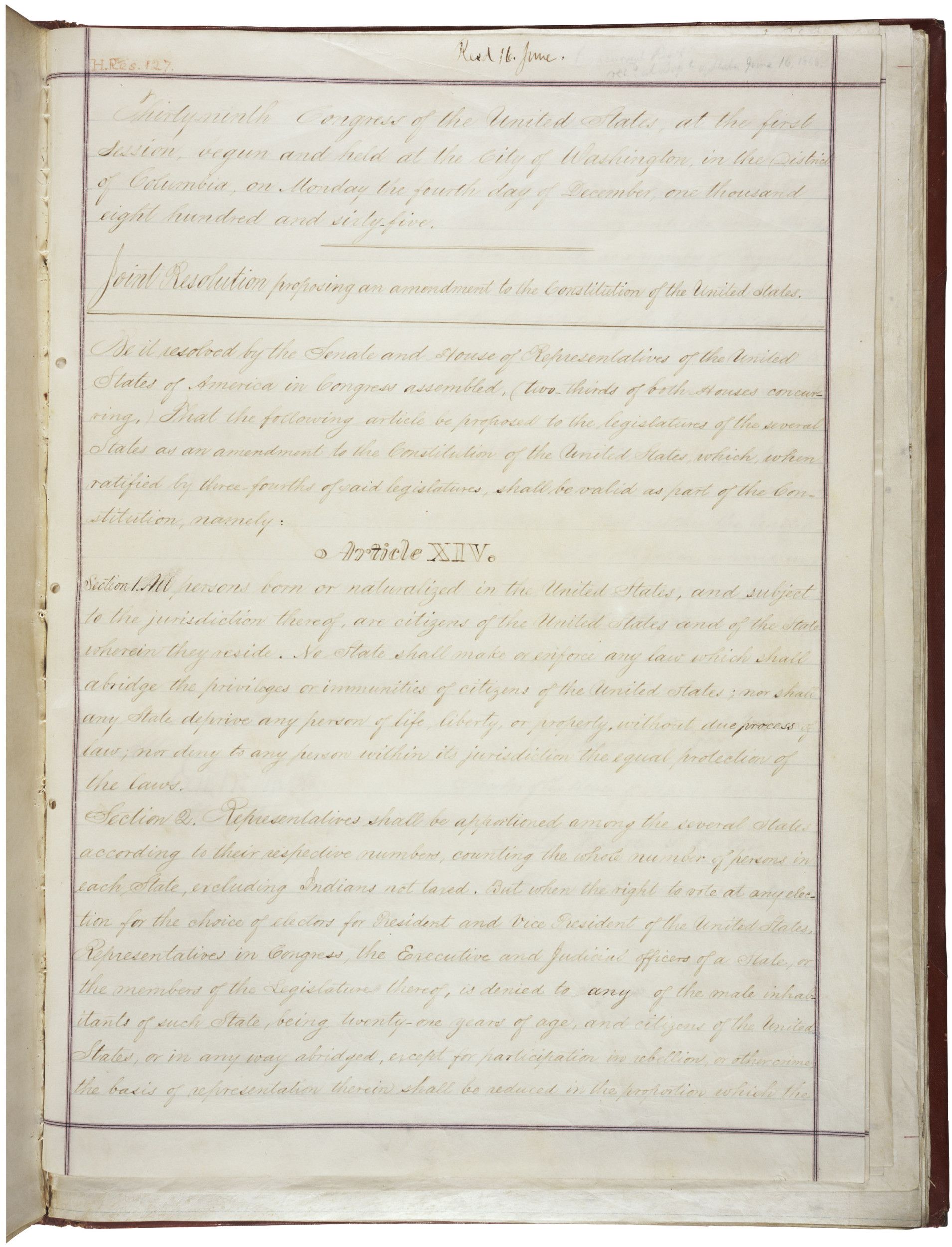
Joint Resolution Proposing the Fourteenth Amendment to the United States Constitution
Page 2
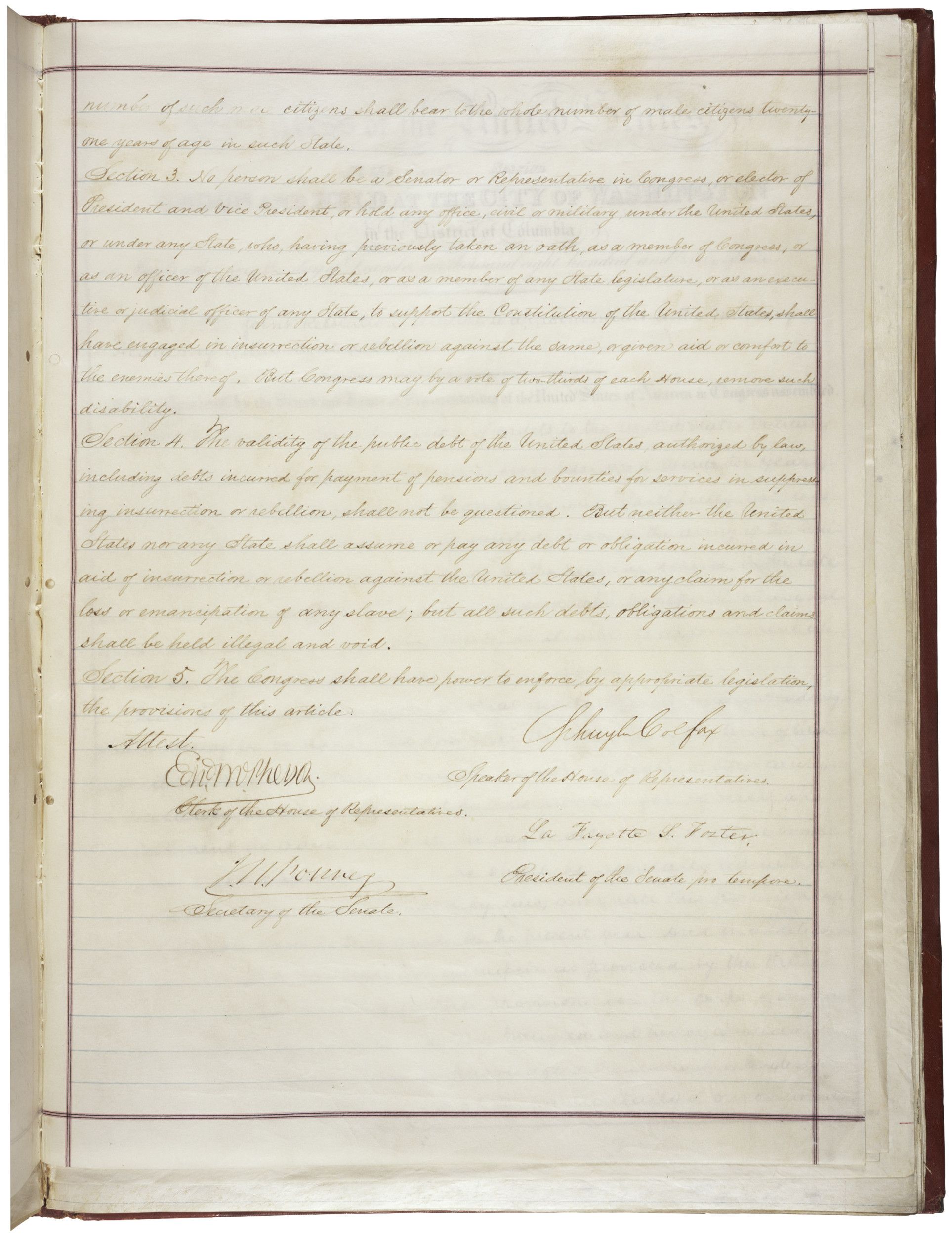
Document
Susan B. Anthony Petition for Remission of Fine Imposed for Voting
ca. 1874
Transcript
To the Congress of the United States.The petition of Susan B. Anthony of the City of Rochester in the County of Monroe and state of New York, respectfully
represents.
That prior to the late Presidential Election your petitioner applied to the board of registry in the Eighth ward of the City of Rochester, in which city she had resided for more than 25 years, to have her name placed upon the register of voters, and the board of registry, after consideration of the
subject, decided that your petitioner was Entitled to have her name placed upon the register, and placed it there accordingly.
On the day of the election, your petitioner, in common with hundreds of other American citizens, her neighbors, whose names had also been
registered as voters, offered to the inspectors of election her ballots for
2
for electors of President and Vice President, and for members of Congress, which were received and deposited in the ballot box
by the inspectors.
For this act of your petitioner, an indictment was found against her by the grand jury, at the sitting of the District Court of the United States for the Northern District of New York at Albany, charging your petitioner, under the nineteenth section of the Act
of Congress of May 31, 1890, Entitled, "An act to Enforce the rights of citizens of the United States to vote in the several states of this union, and for other purposes." with having "knowingly voted without having a lawful right to vote."
To that indictment your peti-
3.
tioner pleaded not guilty, and the trial of the issue thus joined, took place at the Circuit Court in Canandaigua, in the County of
Ontario, before the Honorable Ward Hunt, one of the Justices of the Supreme Court of the United States, on the Eighteenth day of June last.
Upon that trial, the facts of [your petitioner having--all crossed out] voting by your petitioner, and that she was a woman, were not denied--nor was it claimed on the part of the government, that your petitioner lacked any of the qualifications of a voter, unless disqualified by reason of her sex.
It was shown on behalf of your petitioner on the trial, that before voting she called upon a respectable lawyer and asked his opinion whether she had a right to vote, and he
4
advised her that she had such right; and the lawyer was examined as a witness in her behalf, and testified that he gave her such advice, and
that he gave it in good faith, believing that she had such right.
It also appeared that when she offered to vote, the question, whether, as a woman she had a right to vote, was raised by the inspectors, and considered by them in her presence, and they decided that she had a right to vote, and received her vote accordingly.
It was shown on the part of the government, that on the examination of your petitioner before the commissioner on whose warrant she
was arrested, your petitioner stated that she should have voted if allowed to vote, without reference to the advice of the attorney whose
5
opinion she had asked; that she was not induced to vote by that opinion; that she had before determined to offer her vote, and had no doubt about her right to vote.
At the close of the testimony, your petitioner's counsel proceeded to address the jury and stated that he desired to present for consideration three propositions, two of law and one of fact:
First.-- That your petitioner had a lawful right to vote.
Second-- That whether she had a right to vote or not, if she honestly believed that she had that right, and voted in good faith in that belief, she was guilty of no crime.
Third.-- That when your petioner [sic] gave her vote she gave it
6.
in good faith, believing that it was her right to do so.
That the two first propositions presented questions for the Court to decide, and the last a question for the jury.
When your petitioner's counsel had proceeded thus far, the Judge suggested that the counsel had better discuss in the first place the
questions of law; which the counsel proceeded to do, and having discussed the two legal questions at length, asked leave then to say a few words to the jury on the question of fact. The Judge then said to the counsel that he thought that had better be left until the views of the Court upon the legal questions should be made known.
The district attorney thereupon
7
addressed the court at length upon the legal questions, and at the close of his argument the Judge delivered an opinion adverse to the
positions of your petitioner's counsel upon both of the legal questions presented, holding, that your petitioner was not Entitled to vote; and that if she voted in good faith in the belief in fact that she had a right to vote, it would constitute no defense -- the grounds of the decision on the last point ^being that your petitioner was bound to know that bylaw she was not a legal voter, and that even if she voted in good faithin the contrary belief, it constituted no defence to the crime with which she was charged.
The decision of the Judge upon those questions was read from a written document, obviously [crossed out]
8
and at the close of the reading the Judge said, that the decision of those questions disposed of the case, and leftno questions of fact for the
jury, and that he should therefore direct the jury to find a verdict of guilty. The judge then said to the jury that the decision of the Court had disposed of all there was in the case, and that he directed them to find a verdict of guilty; and he instructed the clerk to Enter such
a verdict.
At this time, before any entry had been made by the clerk, your petitioner's counsel asked the Judge to submit the case to the jury,
9.
and to give to the jury the following several instructions:
First - that if the defendant at the time of voting, believed that she had a right to vote, and voted in good faith in that belief, she was not guilty of the offense charged.
Second - That in determining the question whether she did or did not believe that she had aright to vote, the jury might take into consideration as bearing upon that question, the advice which she received from the counsel to whom she applied.
Third - That they might also take into consideration as bearing upon the same question, the fact that the inspectors considered the question, and came to the conclusion that she had a right to vote.
Fourth - That the jury had a right to find a general verdict
10.
of guilty or not guilty, as they should believe that she had or had not been guilty of the offense described in the statute.
The Judge declined to submit the case to the jury upon any question whatever, and directed them to render a verdict of guilty against your petitioner.
Your petitioner's counsel Excepted to the decision of the Judge upon the legal questions, and to his direction to the jury to find a verdict of guilty; insisting that it was a direction which no court had a right to give in any criminal case.
The Judge then instructed the clerk to take the verdict, and the clerk said, "Gentlemen of the jury, hearken to your verdict
11.
as the court hath recorded it. You say you find the defendant guilty of the offence charged. So say you all."
No response whatever was made by the jury Either by word or sign. They had not consulted together in their seats or otherwise. Neither of them had spoken a word, nor had they been asked whether they had or had not agreed upon a verdict.
Your petitioner's counsel then asked that the clerk be requested to poll the jury. The Judge said,"that cannot be allowed, gentlemen of the jury you are discharged," and the jurors left the box. No juror spoke a word during the trial, from the time when they were empannelled to the time of their discharge.
12.
After denying a motion for a new trial, the Judge proceeded upon the conviction thus obtained to pass sentence upon your petitioner, imposing upon her, a fine of one hundred dollars, and the costs of the prosecution.
Your petitioner respectfully submits that in these proceedings she has been denied the rights guaranteed by the constitution to all persons accused of crime, the right of trial by jury, and the right to have the assistance of counsel for their defence. It is a mockery to call her trial a trial by jury; and unless the assistance of counsel may be limited to the argument of legal questions, without the privilege
13.
of saying a word to the jury upon the question of the guilt or innocence in fact of the party charged, or the privilege of ascertaining from the jury whether they do or do not agree to the verdict pronounced by the court in their name, she has been denied the assistance of counsel for her defence.
Your petitioner, also, respectfully insists, that the decision of the Judge, that good faith on the part of your petitioner in offering her vote did not constitute a defence, was not only a violation of the deepest and most sacred principle of the criminal law, that no one can be guilty of crime
unless a criminal intent Exists; but was ^also a palpable violation of the statute under which the conviction was had; not on the ground
that good faith could, in this, or in
14
any case justify a criminal act, but on the ground that bad faith in voting was an indispensable ingredient in the offence with
which your petitioner was charged. Any other interpretation strikes the word "knowingly," out of the statute, the word which alone describes the essence of the offence.
The statute means, as your petitioner is advised, and humbly submits, a knowledge in fact, not a knowledge falsely imputed
by law to a party not possessing it in fact, as the Judge in this case has held. Crimes cannot Either in law, or in morals, be Established by judicial falsehood. If there be any crime in the case, your petitioner humbly insists, it is to be found in such an adjudication.
To the decision of the Judge upon the question of the right of your
15
petitioner to vote she makes no complaint. It was a question properly belonging to the court to decide, was fully and fairly submitted to the Judge, and of his decision, whether right or wrong, [crossed out] and whether made before or after the argument [end cross] your petitioner is well aware she cannot here complain.
But in regard to her conviction of crime, which she insists, for the reasons above given, was in violation of the principles of the common law- of common morality- of the statute under which she was charged, and of the Constitution; a crime of which she was as innocent as the Judge by whom, she was convicted, she respectfully asks, inasmuch as the law has provided no means of reviewing the decisions of the judge, or of correcting his
16.
Errors, that the fine imposed upon your petitioner be remitted, as an Expression of the sense of this high tribunal that her conviction was unjust.
Dated January 12_ 1874.
Susan B. Anthony
This primary source comes from the Records of the U.S. House of Representatives.
National Archives Identifier: 306559
Full Citation: Susan B. Anthony Petition for Remission of Fine Imposed for Voting; ca. 1874; Accompanying Papers of the 43rd Congress; Accompanying Papers, 1865 - 1903; Records of the U.S. House of Representatives, ; National Archives Building, Washington, DC. [Online Version, https://docsteach.org/documents/document/anthony-petition, April 19, 2024]Susan B. Anthony Petition for Remission of Fine Imposed for Voting
Page 1
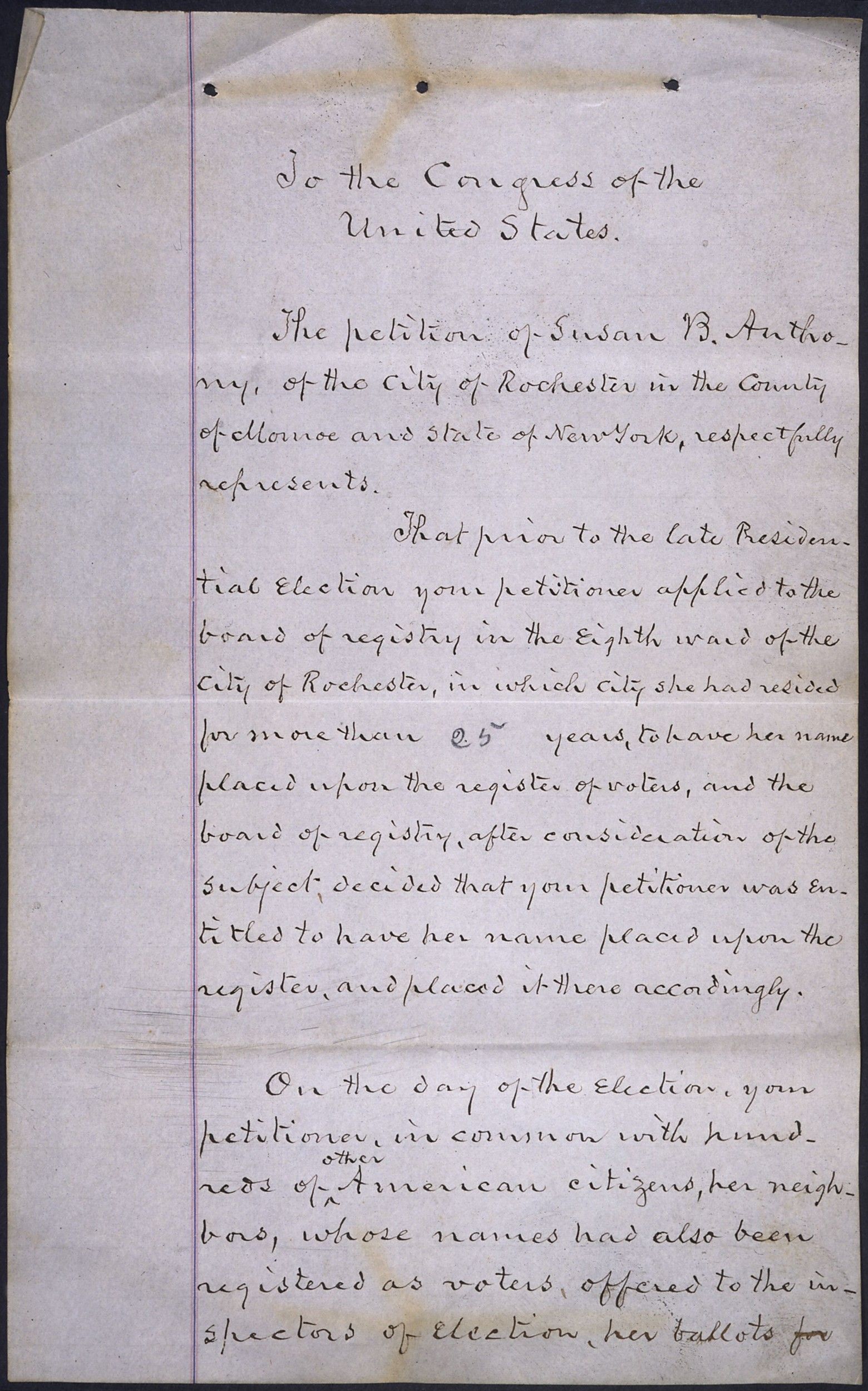
Susan B. Anthony Petition for Remission of Fine Imposed for Voting
Page 2
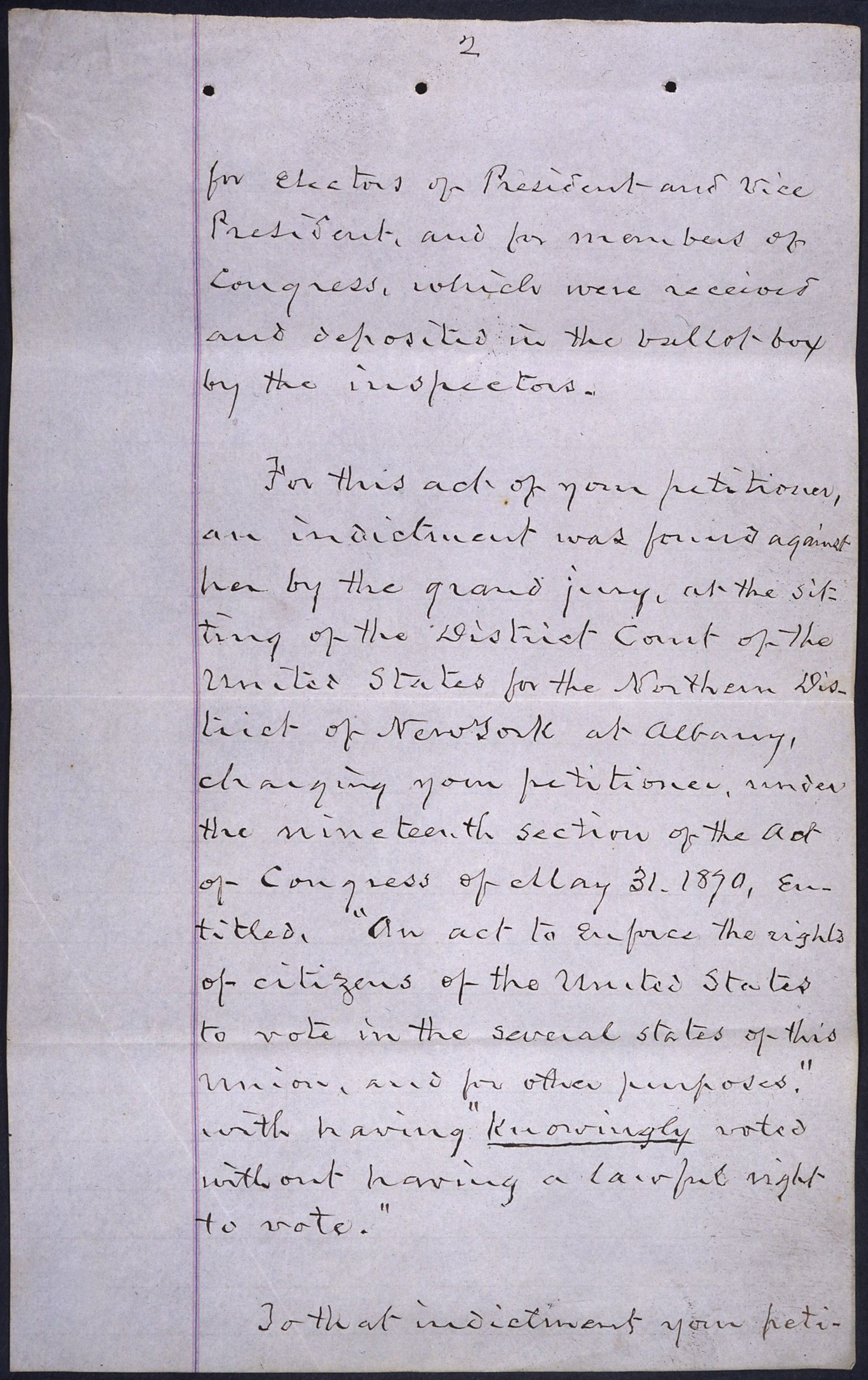
Susan B. Anthony Petition for Remission of Fine Imposed for Voting
Page 3
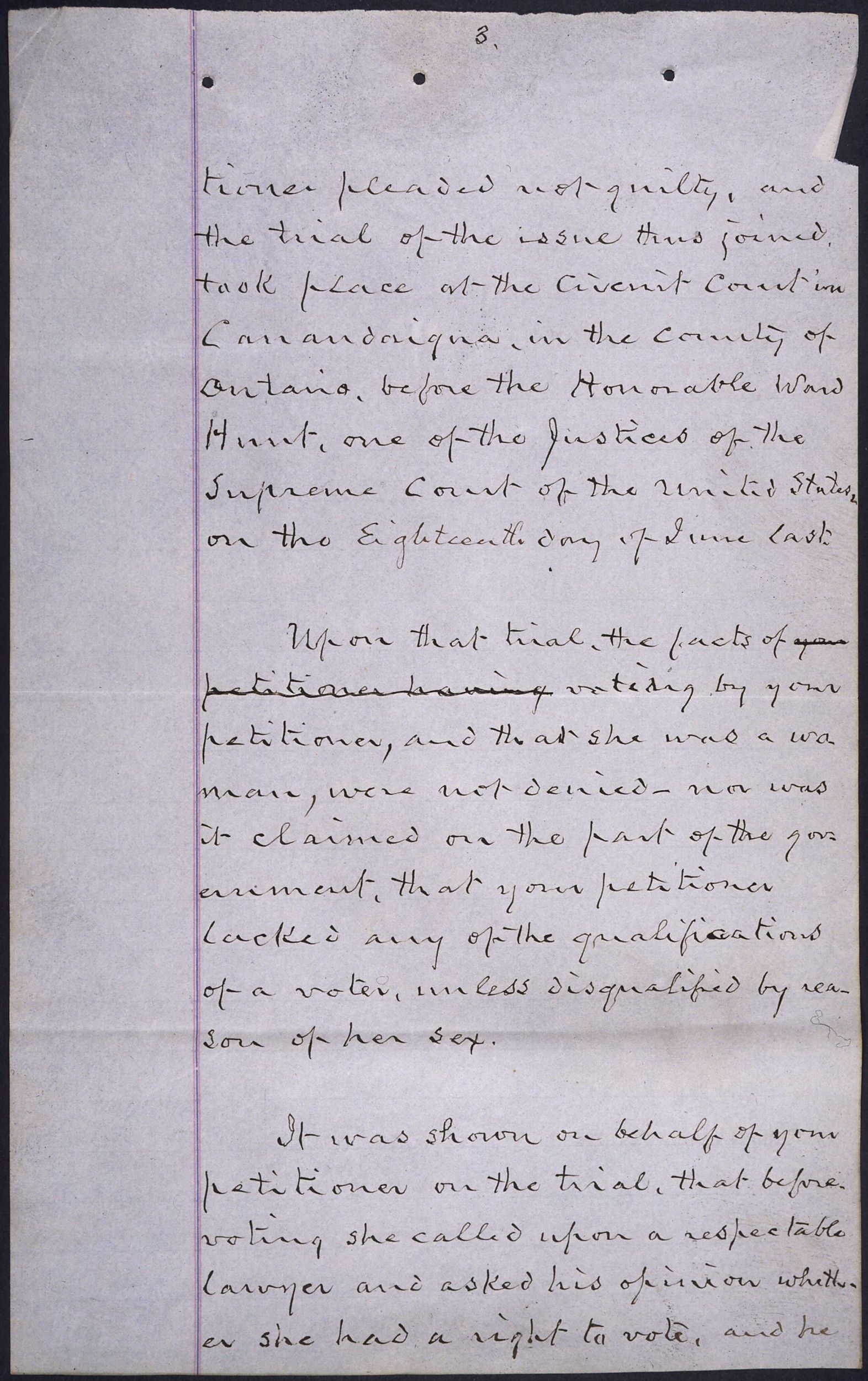
Susan B. Anthony Petition for Remission of Fine Imposed for Voting
Page 4
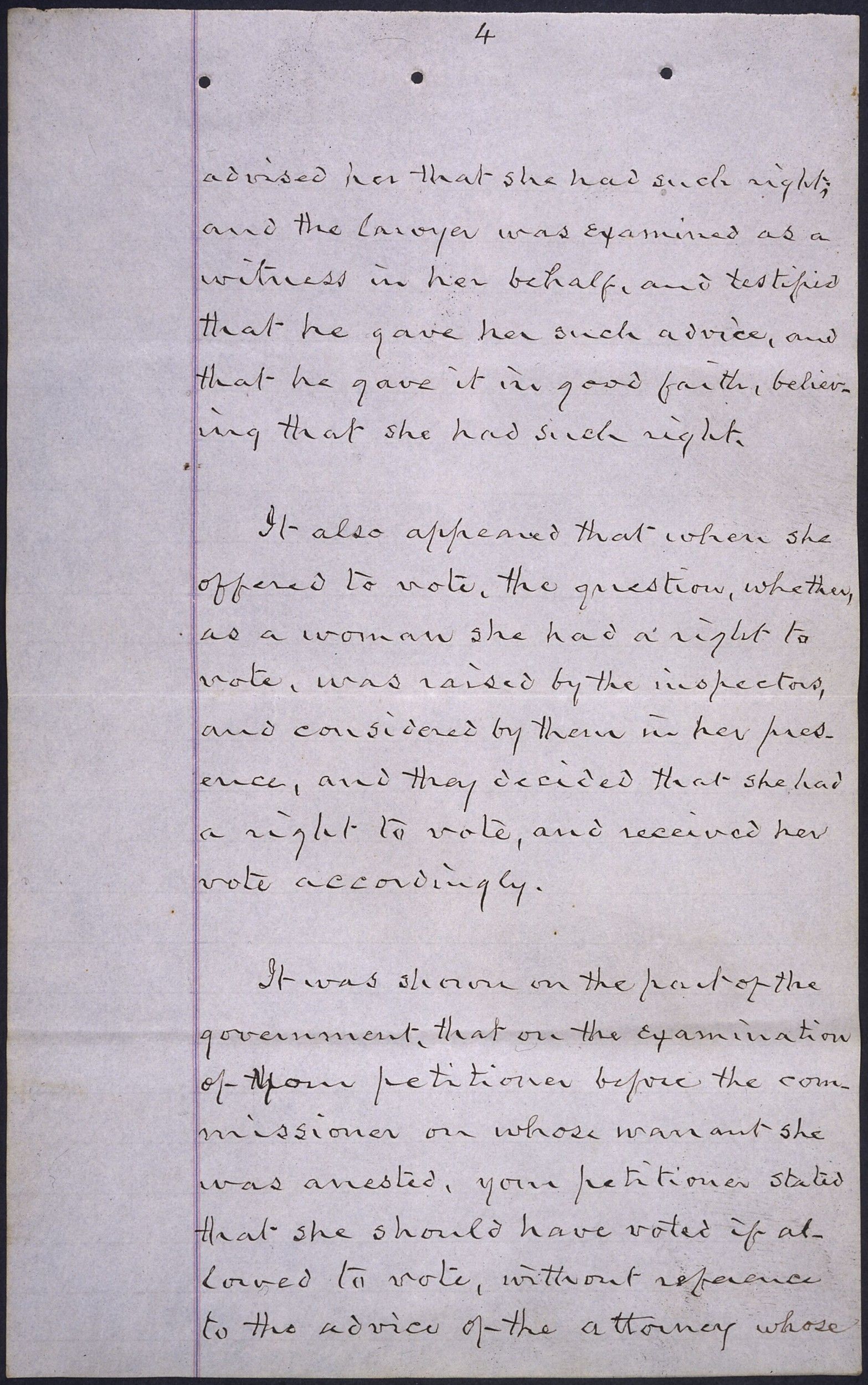
Susan B. Anthony Petition for Remission of Fine Imposed for Voting
Page 5
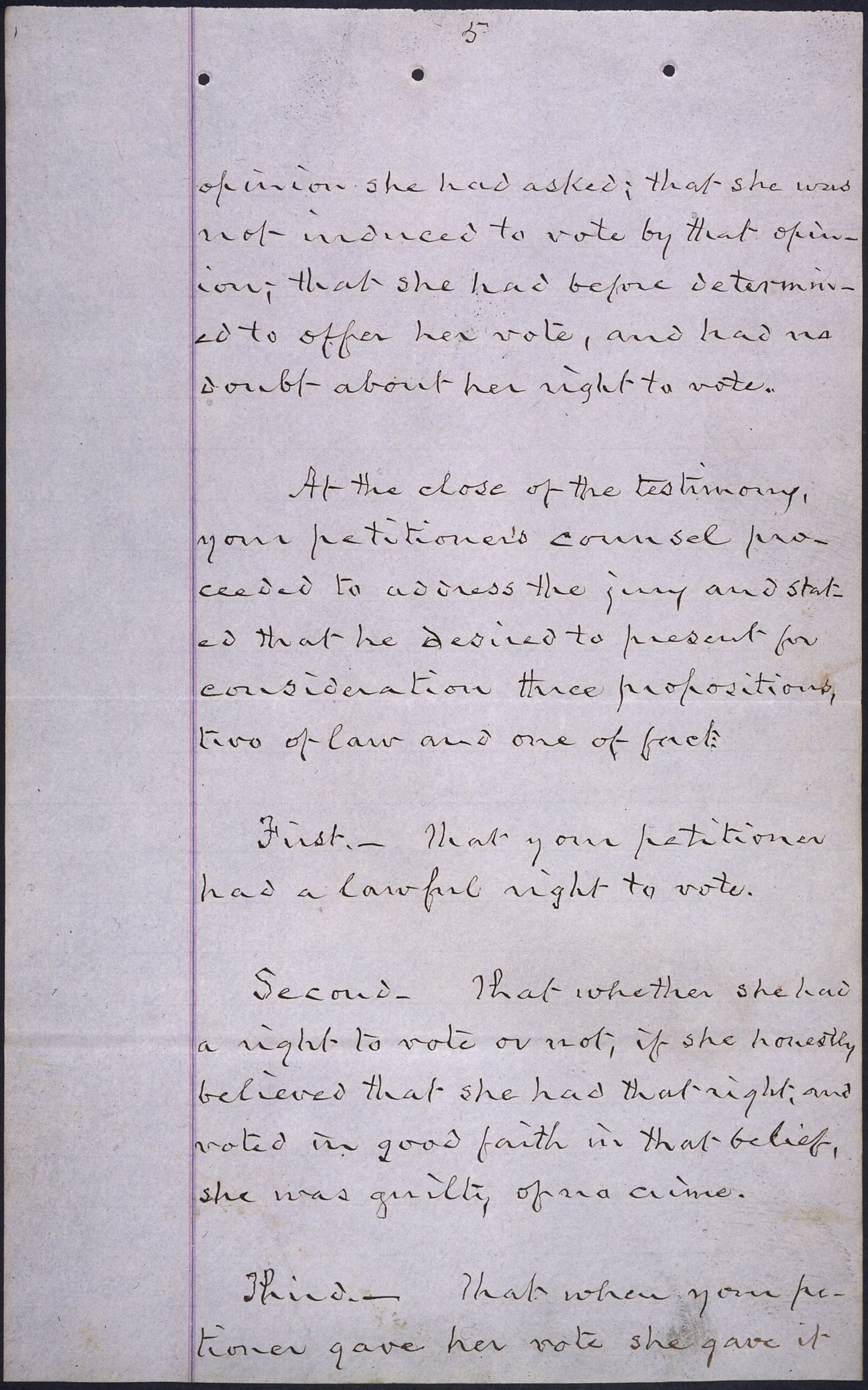
Susan B. Anthony Petition for Remission of Fine Imposed for Voting
Page 6
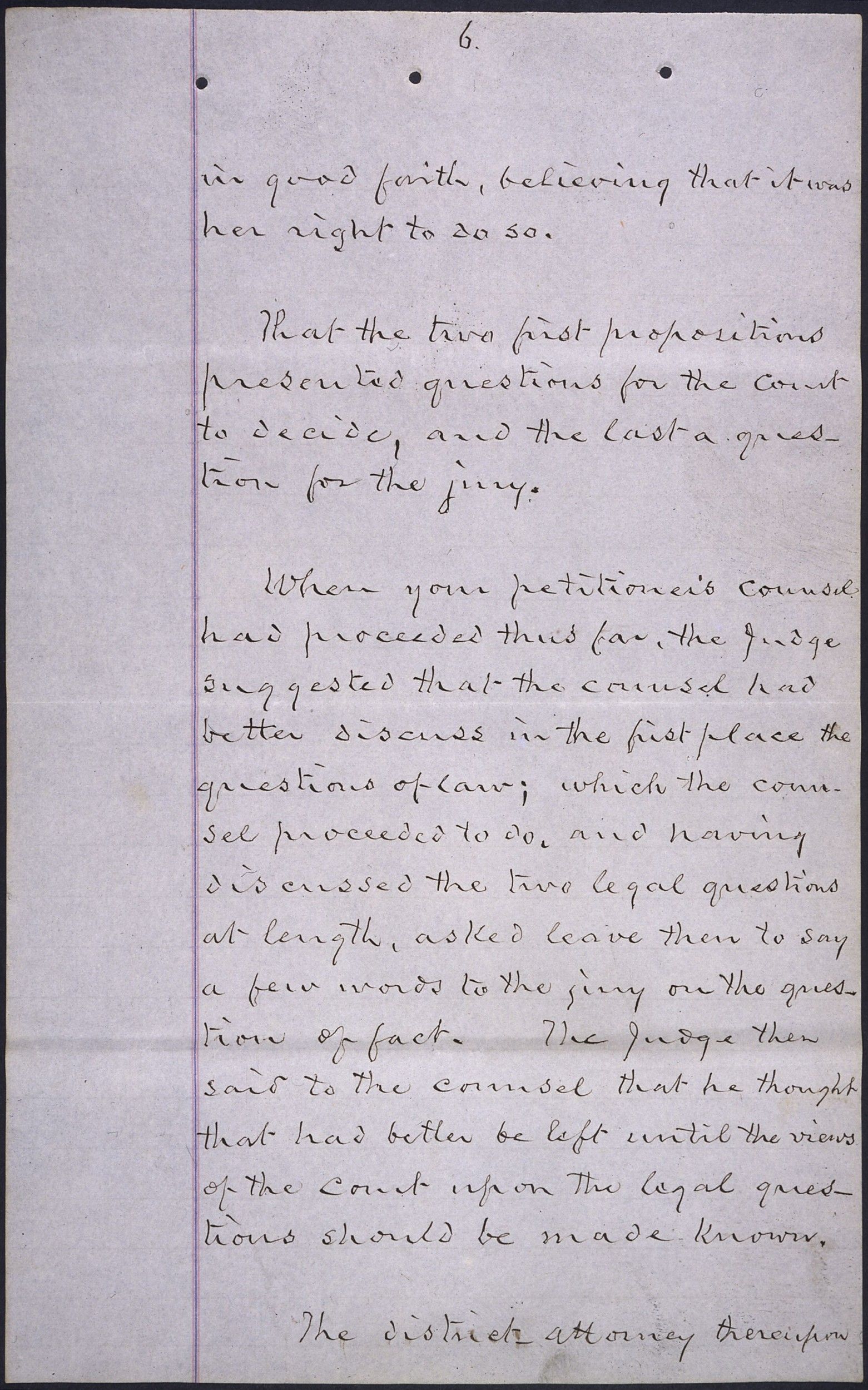
Susan B. Anthony Petition for Remission of Fine Imposed for Voting
Page 7
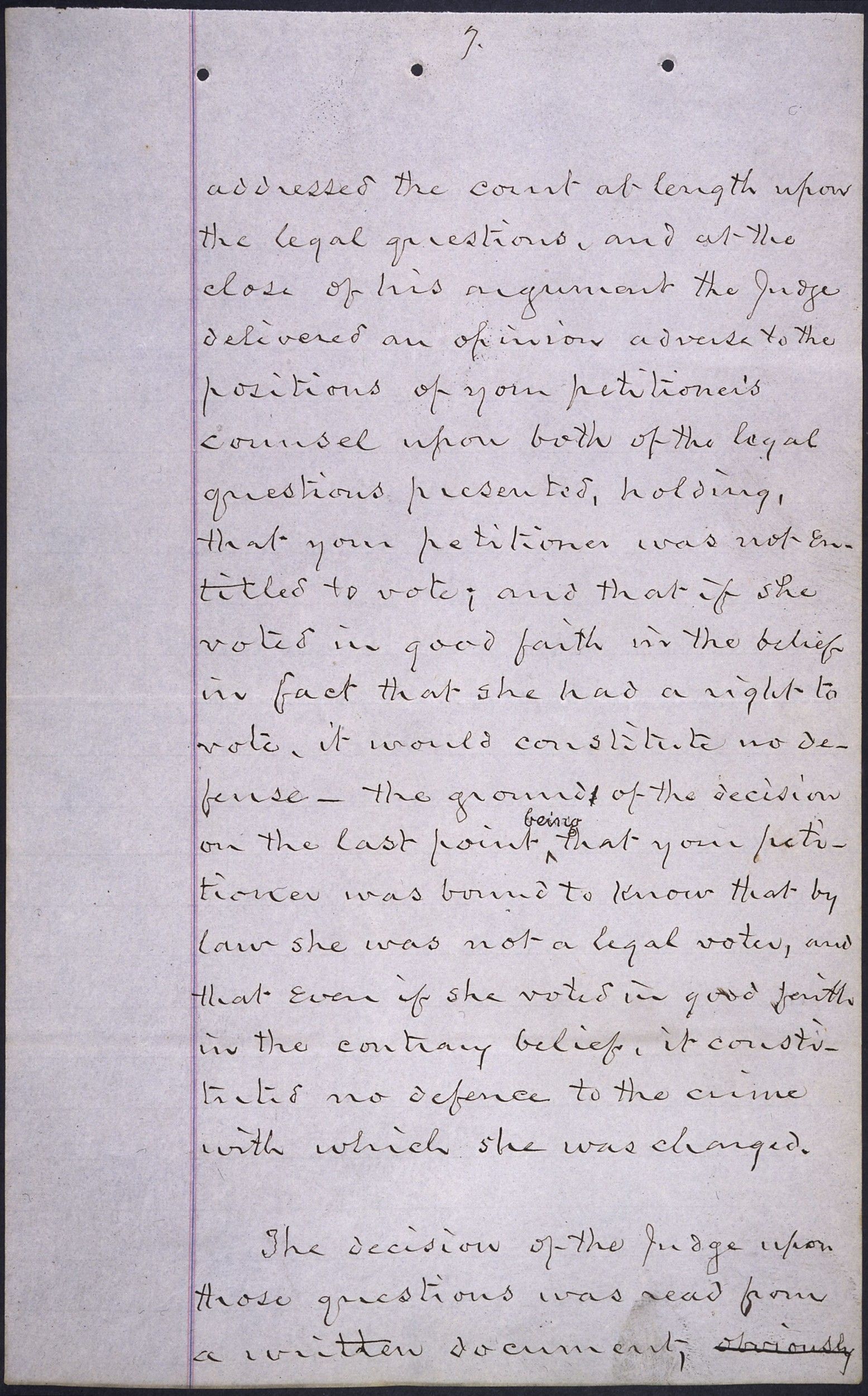
Susan B. Anthony Petition for Remission of Fine Imposed for Voting
Page 8
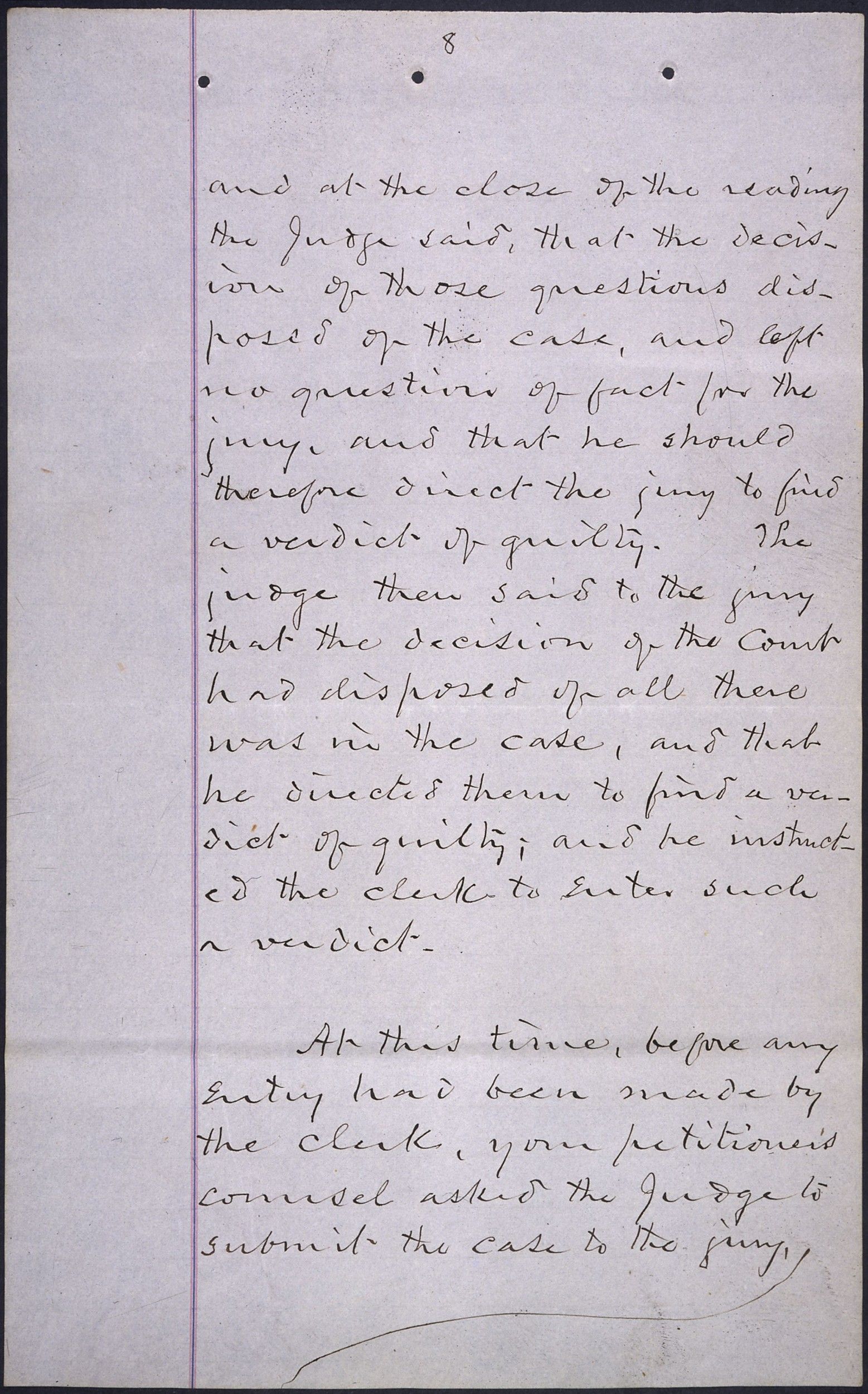
Susan B. Anthony Petition for Remission of Fine Imposed for Voting
Page 9
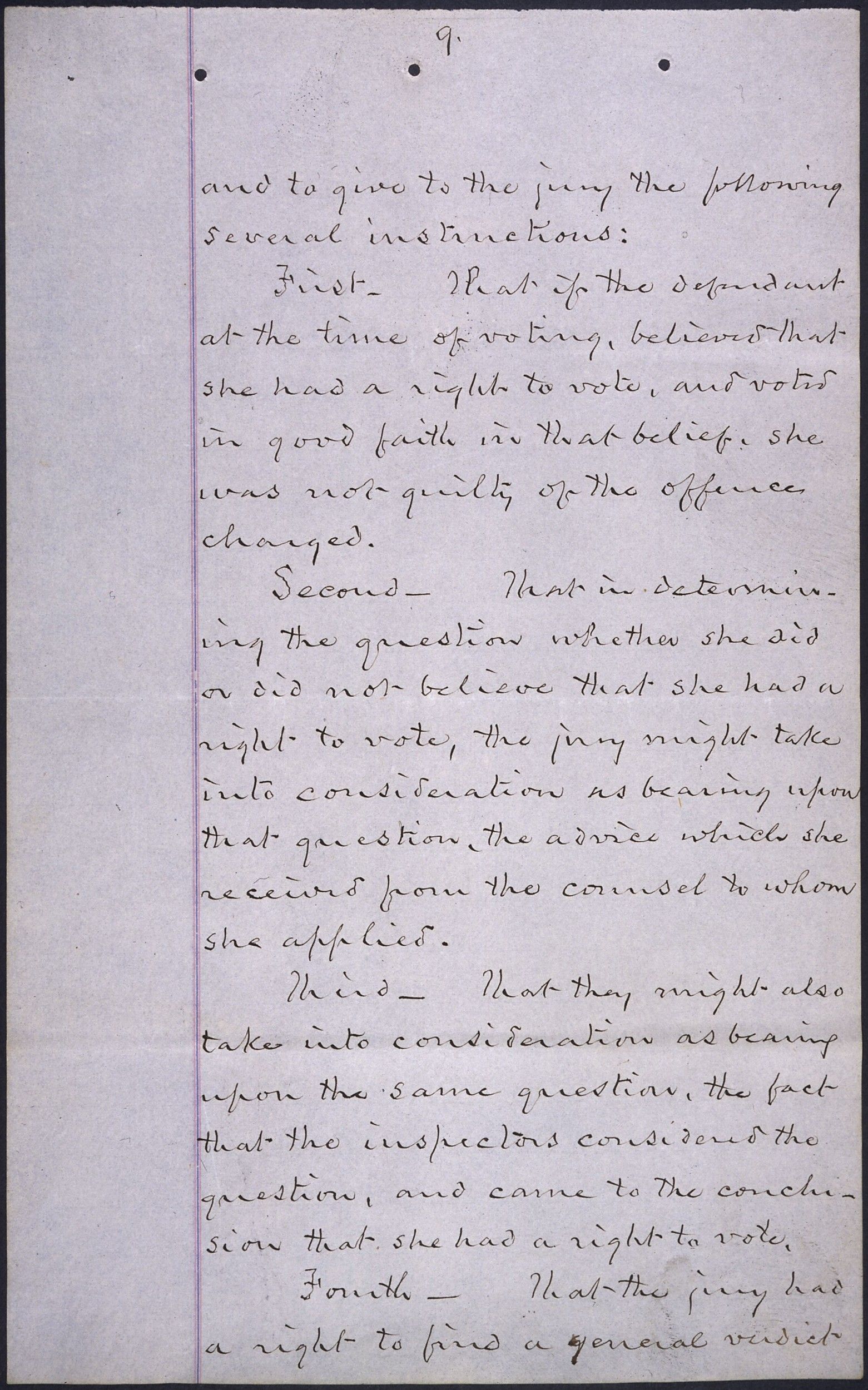
Susan B. Anthony Petition for Remission of Fine Imposed for Voting
Page 10
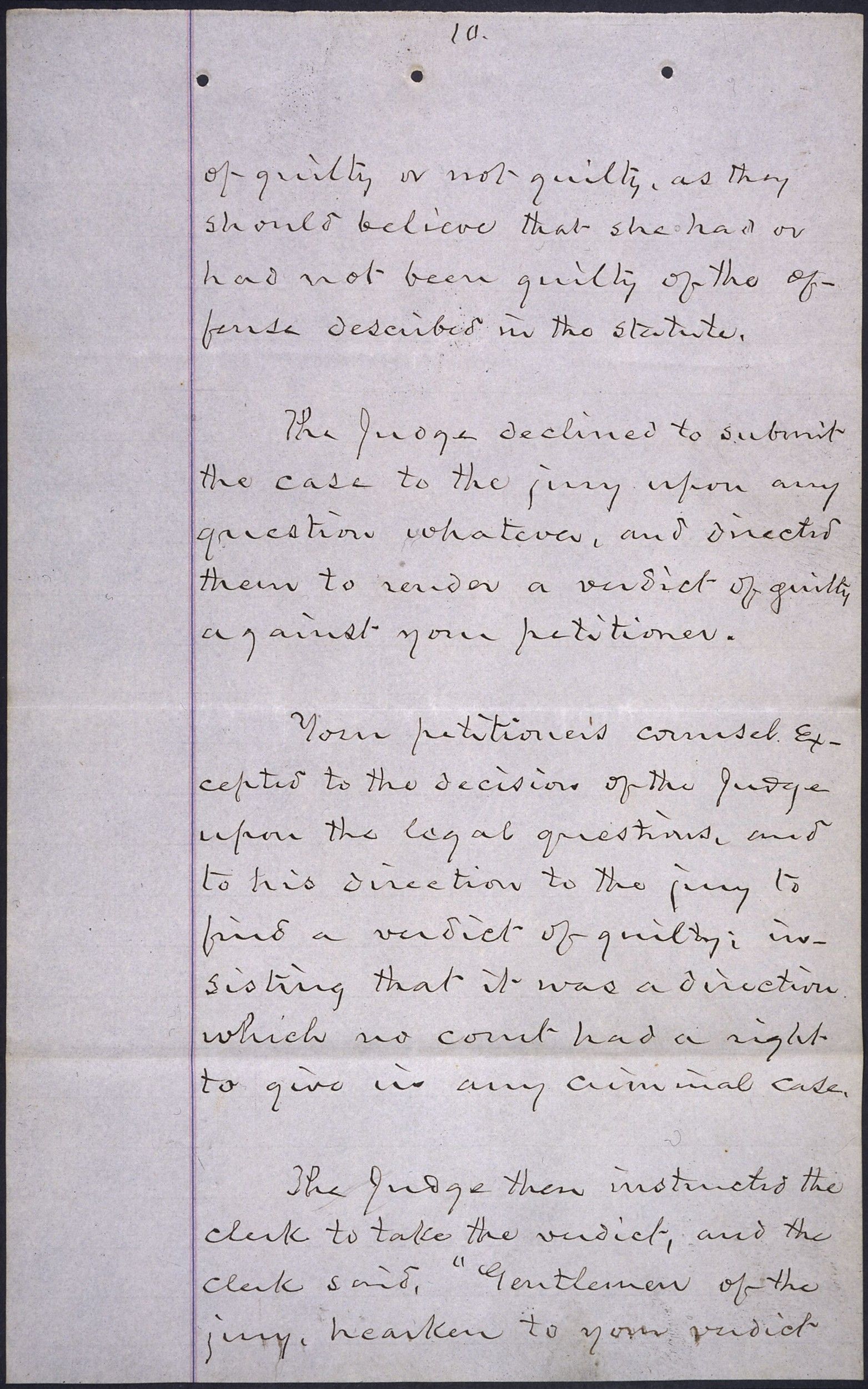
Susan B. Anthony Petition for Remission of Fine Imposed for Voting
Page 11
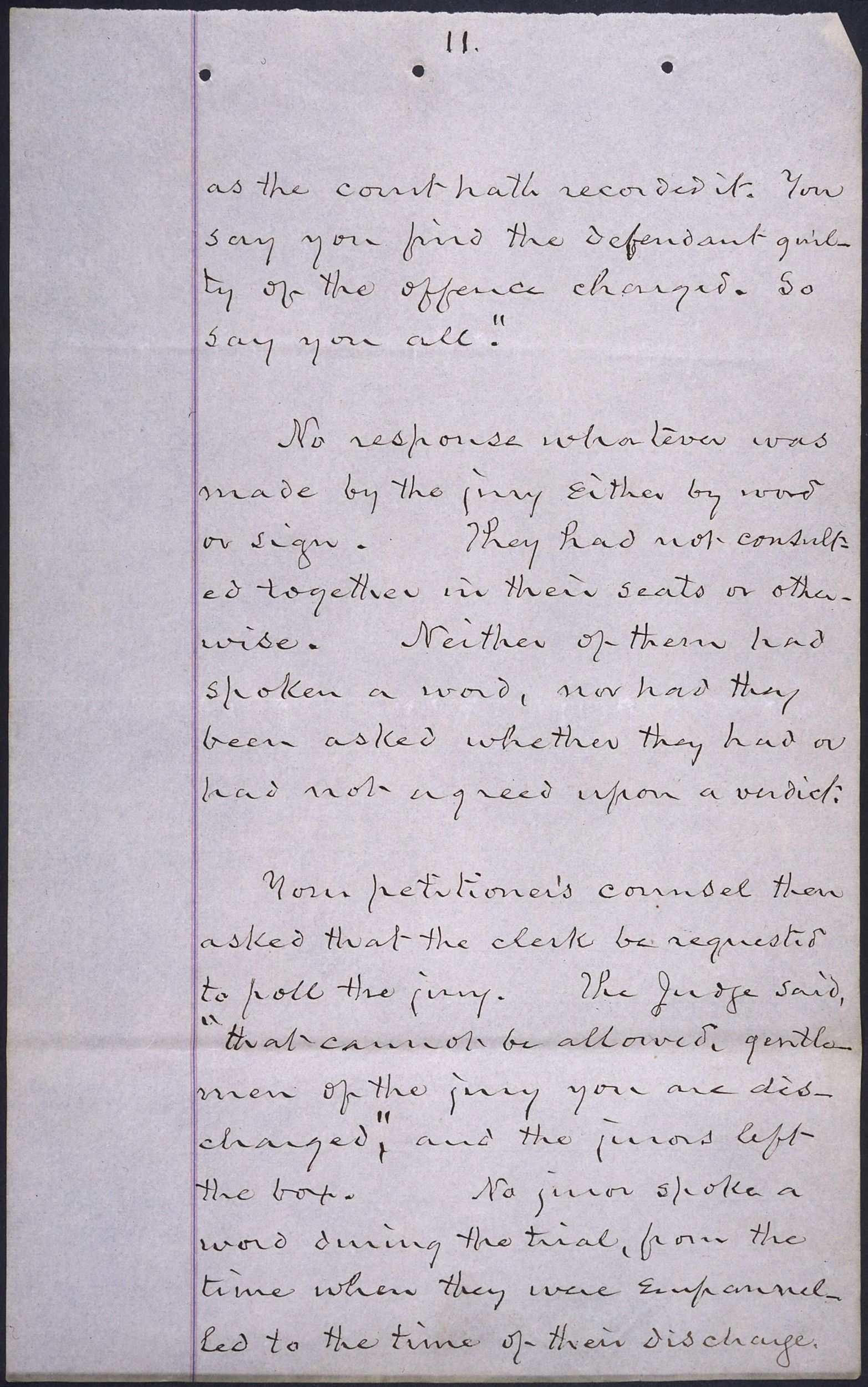
Susan B. Anthony Petition for Remission of Fine Imposed for Voting
Page 12
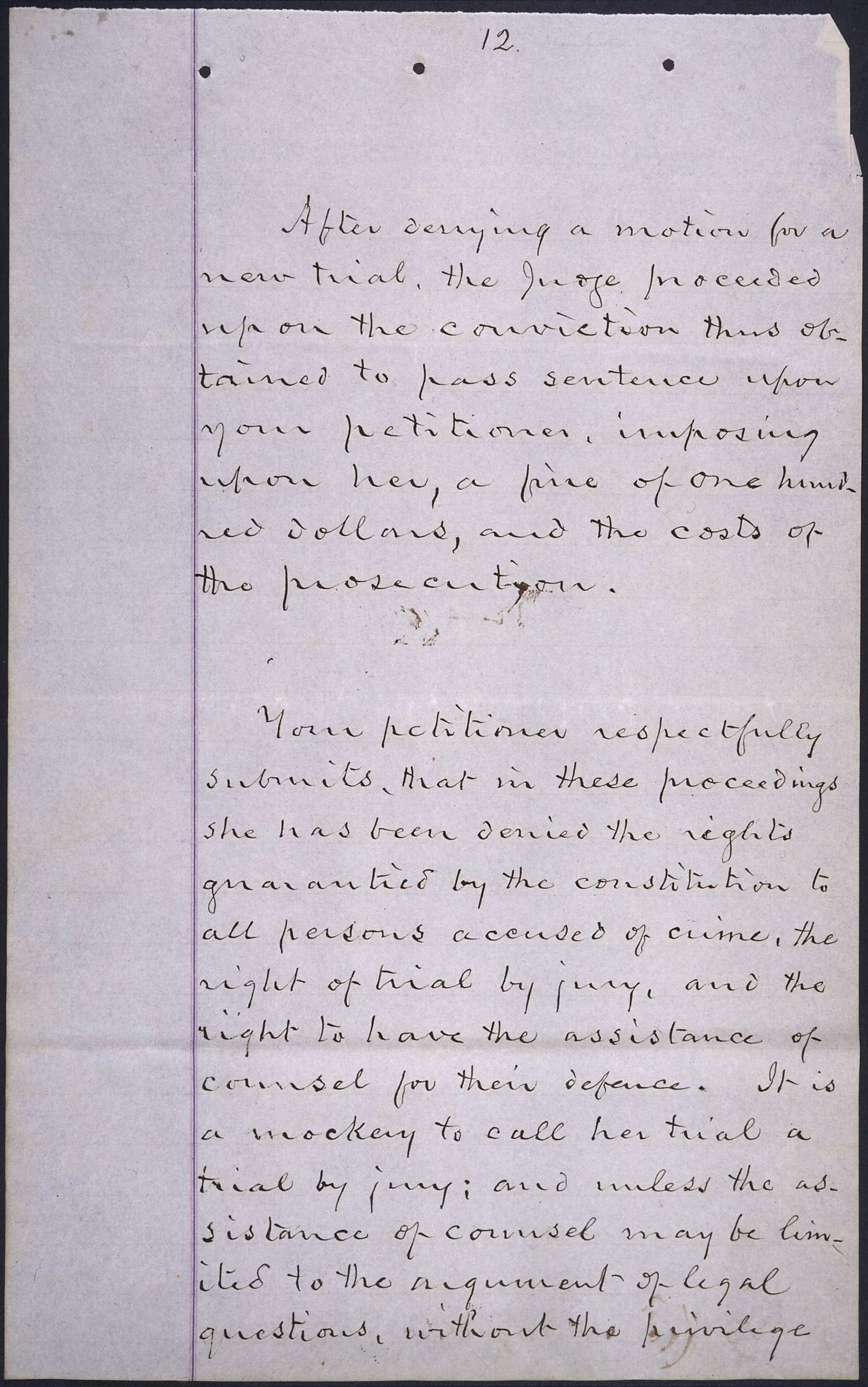
Susan B. Anthony Petition for Remission of Fine Imposed for Voting
Page 13
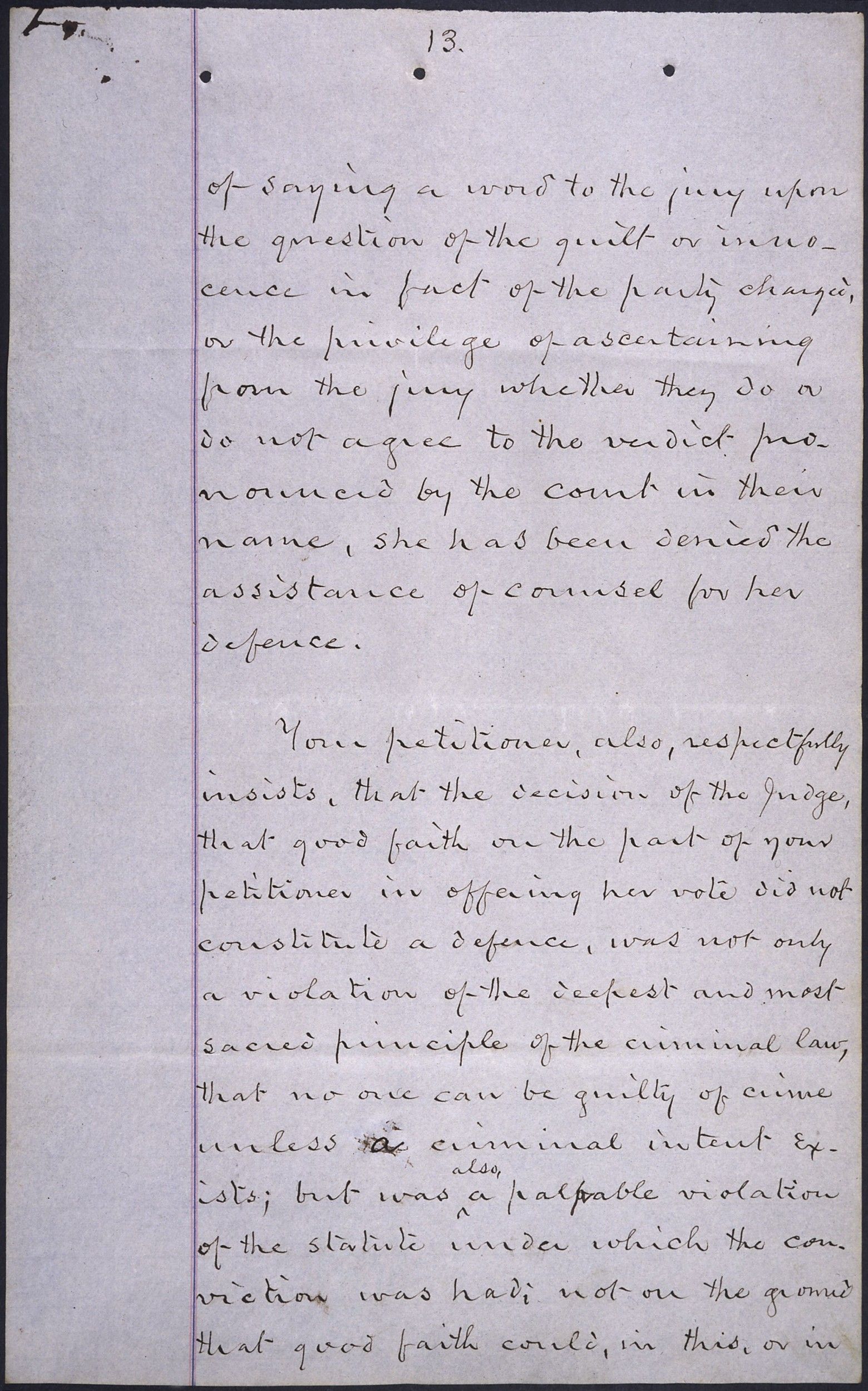
Susan B. Anthony Petition for Remission of Fine Imposed for Voting
Page 14
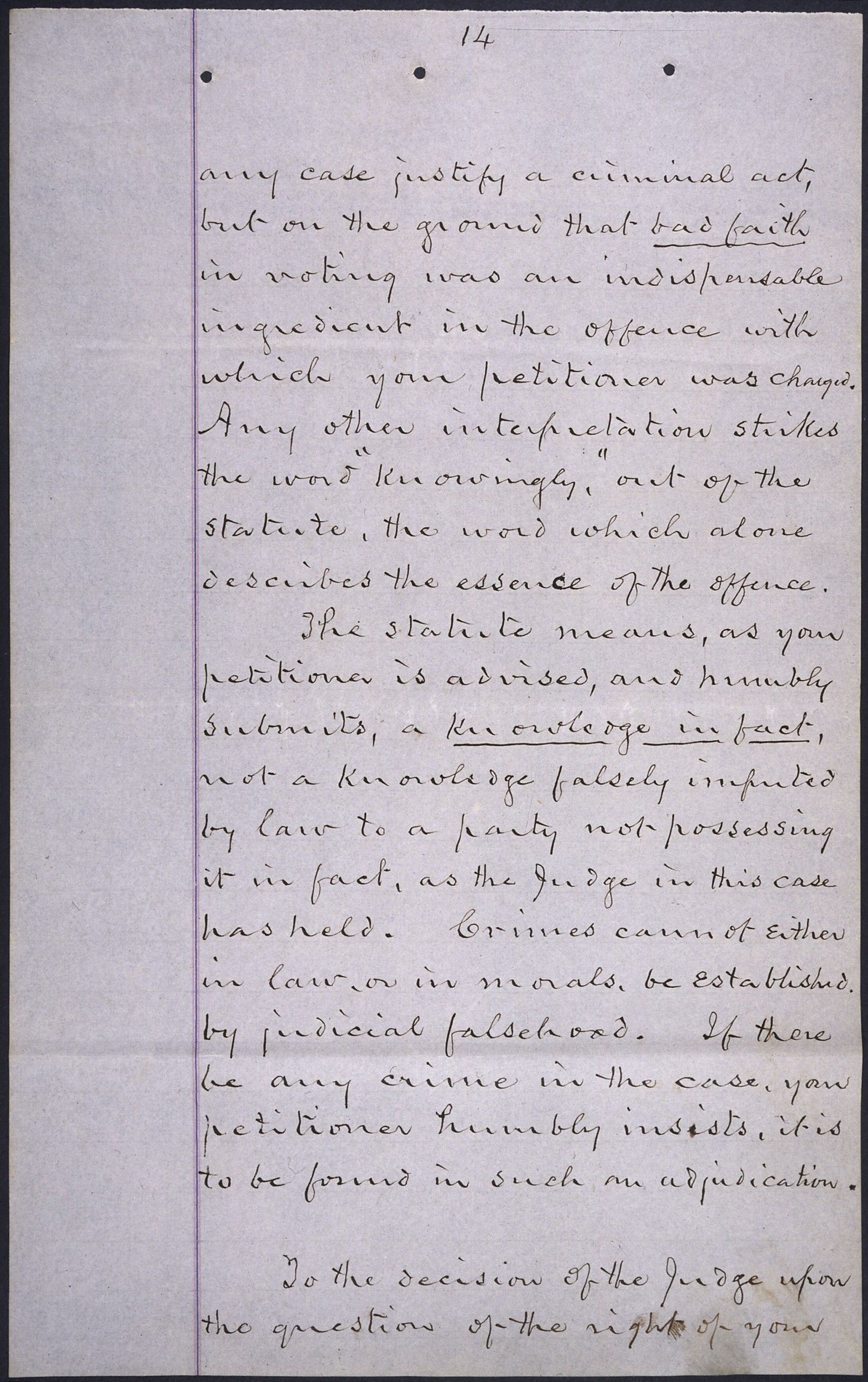
Susan B. Anthony Petition for Remission of Fine Imposed for Voting
Page 15
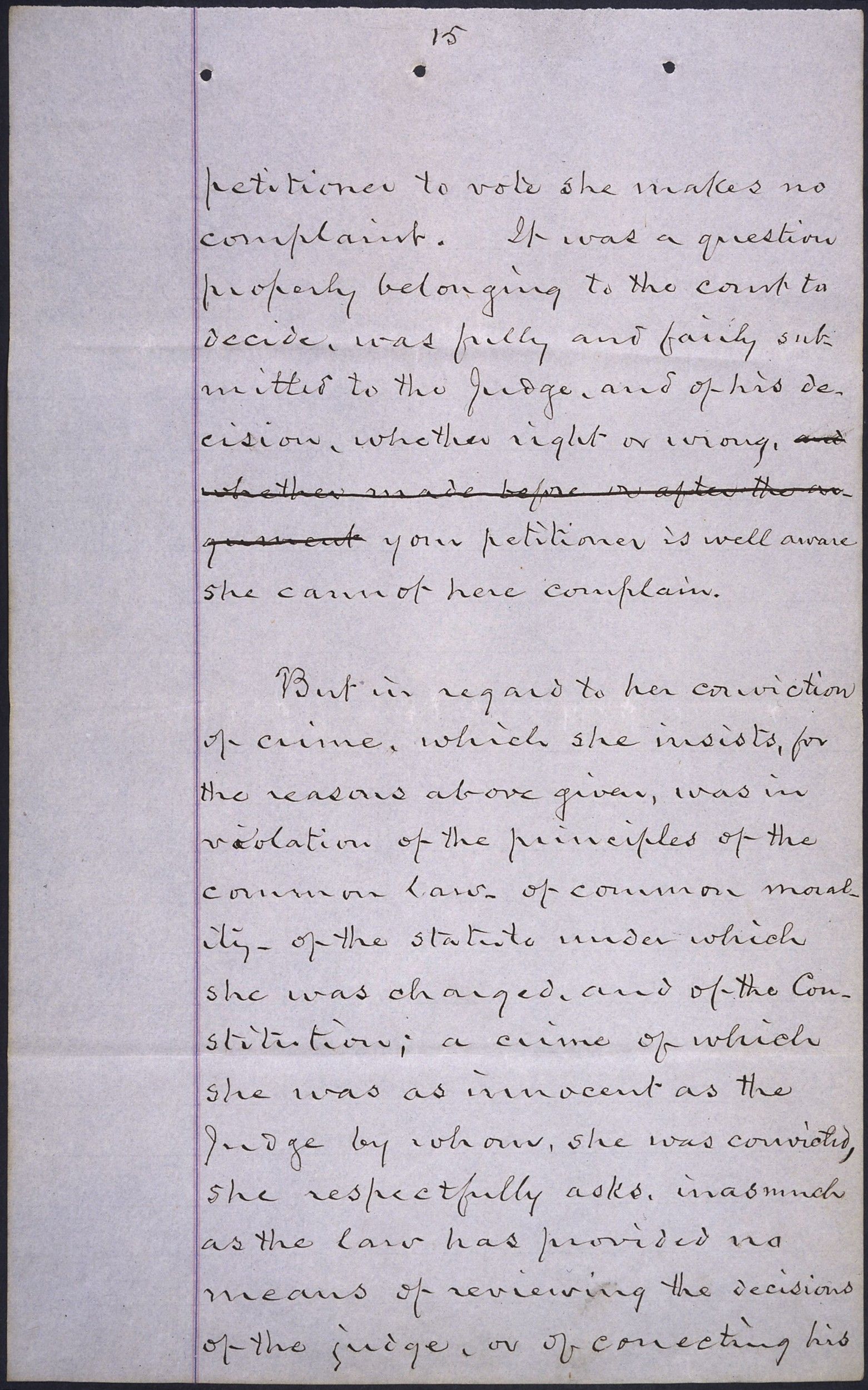
Susan B. Anthony Petition for Remission of Fine Imposed for Voting
Page 16
